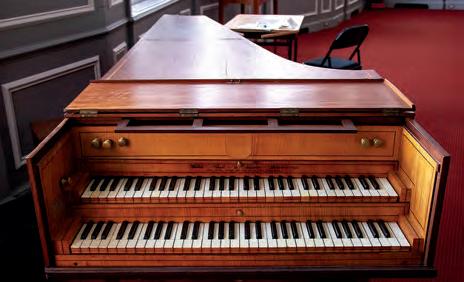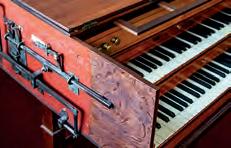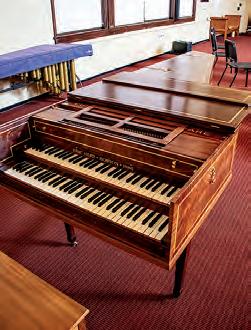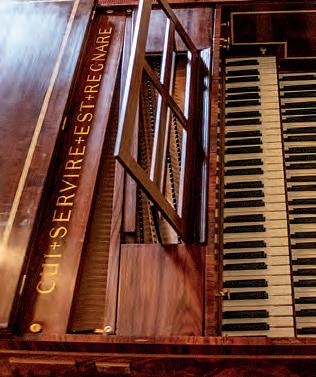






Saying goodbye to departing faculty members Stephen Belsky, Kate Dennison, Tommy Lamont, John Lyons, and Paula Marks. page 16
The Groton community gathers to celebrate the “witty gritty” Form of 2024. page 30
More than 400 Groton alumni and their families returned to the Circle for three days of camaraderie and community. page 46
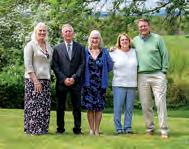
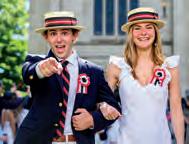
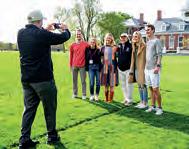
Personae / Profiles
Voces / Chapel Talks 70 De Libris / New Releases 71 Grotoniana / Athletics
81 Grotoniana / Arts 85 In Memoriam 89 Form Notes
The poet Robert Frost first wrote of the road “less traveled” in 1915. On the Circle, however, the idea goes back even further, and I am honored to be part of a tradition of Groton headmasters who have followed this road since the school was founded 140 years ago.
Certainly, Groton is Groton partly thanks to timehonored customs that date back to the school’s first days. But it has been the daring of headmasters, beginning with our founder, the Rev. Endicott Peabody, that has taken us down that proverbial road less traveled when the situation has demanded.
It was Rev. Peabody, after all, who invited a freed slave, the great Booker T. Washington, to speak here in 1899, and again in 1905. In 1952, when the Rev. John Crocker admitted the first African-American to attend Groton—two years before the landmark Supreme Court case of Brown vs. Board of Education—some parents threatened to leave their children home. He persisted without hesitation, and the school opened on time—with its full student body. He later invited the Rev. Martin Luther King Jr. to speak on campus when he was still considered subversive, an appearance that foretold much of what Dr. King would proclaim six months later in his famous “I Have a Dream” speech.
This spirit continued in the 1970s, as Bill and LuAnn Polk oversaw the growth of coeducation at Groton. Simply put, Groton does not rest on its laurels, or settle and play it safe for the sake of adhering to an outmoded form of historical convention. Rather, it is a school in dynamic equilibrium, one that recognizes the delicate balance between tradition and the need to spearhead change.
The road less traveled has also allowed us to stay ahead of emerging educational trends. Pioneers forge forward without the benefit of learning from peers. Lately, through some combination of luck, culture, and community circles of support, Groton has become a pioneer in our ecosystem.
Ten years ago, as we found ourselves on the dubious
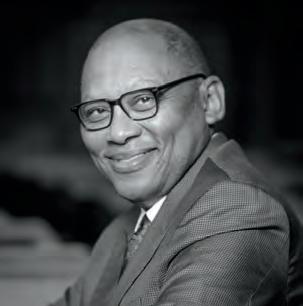
path toward $100,000-a-year tuition, we went against the grain—small letter “g”—and began an aggressive effort to fundraise, freeze tuition, and contain costs. Today, we are the most affordable among our forty peer institutions, and GRAIN (the GRoton Affordability and INclusion initiative) is a model for other schools.
Since COVID, there has been much debate and discourse about preparation or achievement gaps exacerbated by the pandemic and the turn to remote learning. All of us here have long known, however, that students who are not well prepared do not achieve. That is why—ten years ago next summer—we created a month-long program aimed at giving students the chance to close gaps in learning and get ahead in their coursework. GRACE (GRoton Accelerate, Challenge, Enrich) proved prescient, and once COVID learning loss became a reality in other schools, we found ourselves with a homegrown proof of concept that interrupted that loss here.
Most recently, we received the largest gift in Groton’s memory, $15 million toward maintaining our long-term financial health. Dubbed “Project Steampipe” by a generous and anonymous alumni donor, he likened his motivation to pay down debt to underground steam pipes—unseen by most but nonetheless essential. It is the latest example of a graduate taking the road less traveled for the greater good of our balance sheet.
May these examples, and many more, shine a light on all of us as we continue to nurture this spirit of a school in dynamic equilibrium—balancing tradition and daring by taking the road less traveled for the greater good.
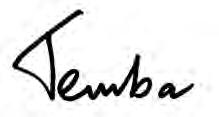
Temba Maqubela Headmaster
Editor
Sean Kerrigan
Design
Irene HL Chu
Senior Editorial Advisors
Kathleen M. Machan
Christopher Temerson
Form Notes Editor
Jessica M. Hart
Advisory Committee
Amily E. Dunlap
Kimberly A. Gerighty
Giulia King
Allison S. MacBride
John D. MacEachern P’10, ‘14, ’16
Paul Ryan
Editorial Offices
The Schoolhouse Groton School Groton, MA 01450 978 - 448 -7506 quarterly@groton.org
Send feedback, ideas, or letters to the editor to quarterly @groton.org.
Other School Offices
Alumni Office: 978 - 448 -7520
Admission Office: 978 - 448 -7510
Groton School publishes the Groton School Quarterly three times a year, in the fall, winter, and spring/summer, and the Annual Report once a year.


The Vuyelwa and Temba Maqubela Track and Field Complex at Groton School was formally dedicated on April 27, furthering the current era of inclusion, diversity, and athletics on the Circle.
Groton’s track and field program has been active since 2008, when Hall of Fame cross country coach Bill “Fire” Maguire was first approached by a handful of runners about organizing and entering some meets. It has since become one of Groton’s fastest growing sports, despite having to bus to tracks in Ayer and Harvard for practice, and being unable to host meets on campus.
When Groton’s Strategic Framework 2030 was adopted by the Board of Trustees in November 2021, inclusion, belonging, and student well-being were identified as key pillars. As a sport without barriers, requiring no prior training and no special equipment for the participant, track and field was seen as a great way to enhance those pillars and the track-and-field facility project was started.
In January 2023, after just four months, fundraising for the new track and playing fields met its goal, adding to Groton School’s ongoing work of inclusion and tuition containment through the GRAIN (GRoton Affordability and INclusion) initiative. Construction of the track and field facility broke ground in spring 2023 and was completed earlier this year.
Speaking at the dedication, Ann Fox ’94, chair of the Board of Trustees’ Buildings and Grounds Committee, thanked the project team of CSL Consulting, CHA Consulting, MJ Cataldo Landscape and Construction, and Tim Dumont, head of Groton’s Buildings and Grounds Department, for their tireless work on what was really three projects in one: the track facility, a new turf field on the lower campus, and a new storage building.
“When we updated our strategic plan for Groton, we worked to define our guiding principles,” said Ms. Fox. “These principles shape how we think about everything we do, including with our physical campus. We committed to create a visual and experiential environment that offers everyone students, faculty, and staff the opportunity to feel belonging each day across campus and in every activity.”
Board of Trustees President Benjamin
Pyne ’77, P’12, ’15 thanked his fellow trustees and other donors who made the project possible in just fifteen months, the track and field team for its grit and perseverance, and the Maqubelas for their leadership.
“Today my greatest gratitude goes to Temba and Vuyelwa Maqubela. How lucky Groton School was to have you join us on the Circle. We are all grateful for the journey we have been on with you over these past eleven years,” he said. “Your vision and leadership has been transformational for Groton School. You’ve combined the power of education and excellence with access and inclusion into a vision and practice that is truly inspirational for all of us. We have all been your beneficiaries, and none more importantly than the students who have been here during your tenure.”
The entire Maqubela family turned out for the event, including Mr. and Mrs. Maqubela’s children and grandchildren. Flanked by a few of the latter, Mr. Maqubela began his remarks by also thanking the donors who made the project possible, beginning with the anonymous donor family who provided the lead gift.
“They say Groton shows up,” he said. “You showed up so fast, so readily, and we were just amazed. And this was a global effort. Some of the folks who said ‘I’m in’
are here from as far away as Hong Kong and Singapore and Indonesia, with our local people who are here. So to you for making the distance to mark this day, thank you very much for doing that because we wouldn’t be here without a global collaboration from all of you.”
After thanking Ms. Fox and Mr. Pyne, Mr. Maqubela turned his attention to his wife, his “chomam”— South African slang for “best friend”— Mrs. Maqubela. In high school, she was a star runner who went undefeated for five years in the sprints, high jump, and long jump, but was banned from competing against white runners because of apartheid.
“W ithout her, this probably would never have happened,” he said.
Finally, with their teammates behind them, track and field captains Daisy Adinkrah ’24, Inga Bartsch ’24, Jeremy Gall ’24, and Andres Palacios ’24 cut the long red ribbon stretched across the start/ finish line and led everyone in a ceremonial lap of the new track.
As people circled the oval some jogging, some walking, all smiling the promise that a sport like track and field can deliver on manifested itself. Trustees, students, faculty, staff of all ages, colors, and backgrounds were all equal, joined together in their effort, aspiration, and joy.
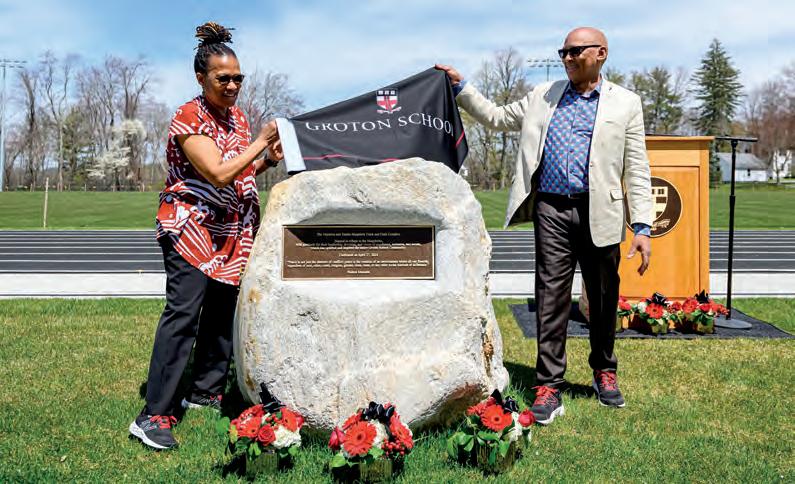
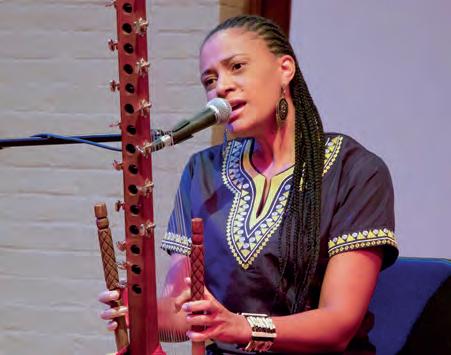
When Sona Jobarteh first asked her father to teach her to play the traditional West African kora, he didn’t talk about how the instrument’s legacy was almost exclusively male.
“He said to me, ‘Don’t be a female kora player. Be a good kora player. When I close my eyes and listen to you, I don’t want to know if it’s a woman or a man. I just want to know that they’re good.’”
The daughter heard her father’s call and,
after studying the instrument for her entire childhood, Ms. Jobarteh attended the Royal College of Music and the Purcell School of Music to study composition. Her father’s break in tradition allowed her to carry the larger kora tradition to a global audience through performances with the Royal Philharmonic and the BBC Symphony orchestras, and through the release of several albums, including her latest, Badinyaa Kumoo, released in 2022.
As the spring term Circle Talk speaker, Ms. Jobarteh gave an intimate masterclass in Gammons Recital Hall on April 1 before playing with her band the next night for the entire Groton community in the Campbell Performing Arts Center.
Bor n in London, Ms. Jobarteh grew up with a close connection to her Gambian heritage. In Gammons, she gave students, faculty, and staff a crash course in the history of the region, from how her modern country was carved out of a river valley by French and British colonialists to how the centuries-old musical traditions of West Africa transcend those arbitrary lines drawn on a map.
“We had our own traditions, our own culture, before all that,” she said.
One among those traditions is the kora, a twenty-one-string instrument that’s a combination of guitar and harp. Its body is round, made from a halved, hollowed-out gourd with a drum skin stretched atop that allows for percussion as well. There’s no glue or nails (other than decorative); the entire
instrument is held together by tension.
Ms. Jobarteh intertwined performance with history the instrument’s and her own explaining how kora players practice hours, days, lifetimes to learn hundreds of songs all by ear. The kora is an oral tradition, passed down through West African families from father to son for generations. Now that she has joined that lineage, Ms. Jobarteh is teaching her own son what her father taught her: Find your voice, and listen to it.
“What I’m trying to promote and encourage is that you can find your voice within your own traditions,” she said. “You can pick up this instrument and find ways to be critical, or find ways to be very present, and contribute to society in constructive ways using our own traditions.”
Toward the end of the talk, Ms. Jobarteh took questions from students many of them musicians themselves about things like collaboration, the importance of practice and routine, and the creative process. Throughout all her answers, she urged the students whether their music was classical, jazz or traditional West African to make their own path.
“The main thing is not to try to imitate people, but to stay true,” she said. “Music is a conversation. You might have a different accent, but in the end we can still share in the same topic of conversation.”
Groton School Headmaster Temba Maqubela has announced the promotions of four longtime faculty members.
Katharine Leggat is Groton’s new assistant head for academics. Formerly the school’s academic dean, Ms. Leggat joined Groton in 1983 and has worn numerous hats over the years: full-time mathematics teacher, dean of students, acting assistant head, dorm head, and coach of varsity field hockey and girls ice hockey. She currently teaches in the Mathematics and Computer Sciences Department, is a girls JV hockey coach, a dorm affiliate in the Lower School, and holds the Thomas S. Williams Chair. Ms. Leggat is married to former longtime math teacher and football and ice hockey coach Jonathan Choate ’60.
Michael O’Donnell, former dean of students and residential life, will now be assistant head for residential life. Mr. O’Donnell came to Groton in July 2012. In addition to his work in the Deans’ Office, he teaches Latin and U.S. History and has coached girls cross country and crew. Former associate dean of students Elizabeth Petroskey has been promoted to dean of students. Ms. Petroskey has been on the Circle for twenty years. She started as a part-time administrative assistant to the deans, became associate dean in 2010, and ran a dorm from 2011–23. In 2023, she was appointed the school’s chief safety officer.
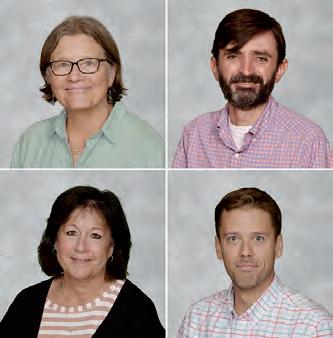
Director of Student Activities Tim LeRoy will retain that title and also serve as assistant dean of students. Mr. LeRoy joined the Groton faculty in 2013 and has served as director of the Student Activities Committee (SAC), a member of the Mathematics and Computer Science Department, a Lower School boys dorm head, and a coach of girls varsity ice hockey.
Congratulations to all four for these well-deserved promotions!
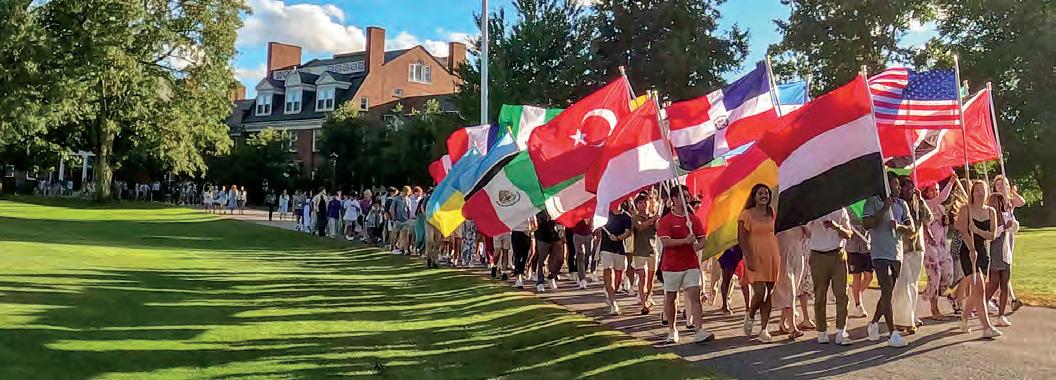
Groton School opened its 140th academic year this past week with athletic and drama preseason, orientation for new students, Convocation, and resumption of classes.
Student-athletes and theater program participants began returning to the Circle on September 2 and 3 for practice and rehearsals. As more students joined the early arrivals, leadership and prefect training continued throughout the week. Evenings were highlighted with social activities sponsored by the Student Activities Committee, as well as special off-campus excursions, including a drama trip into Cambridge to see Romeo and Juliet at the American Repertory Theater.
New students and their parents arrived on
September 7 for orientation, a barbecue lunch, and a meeting with Headmaster Temba Maqubela. By Sunday, September 8, all students were on the Circle for Convocation in St. John’s Chapel.
“We give thanks for teachers, classmates, coaches, and friends,” Chaplain Allison Read said in her opening prayer. “We ask your blessing as we set new hopes for ourselves, take on challenges, and endeavor to do our best.”
Mr. Maqubela began his annual remarks with a call for civility during what have proven to be often polarizing times.
“In the midst of complex geopolitics and polarization nationally,” he said, “this school is a safe haven for us all.”

PAs the beginning of each academic year marks an opportunity to rebuild and revitalize the Groton community, Mr. Maqubela urged members of that community to practice neighborliness anew, and pressed members of the Form of 2025 to set a drama-free example for their younger schoolmates.
“New students will usher a refreshing spirit of vitality of their own, sharing their stories and enriching us with their talents,” he said. “As they deal with nervousness in a new environment, returning students should offer advice, wisdom, and reassurance. This connectivity or connective tissue if you will is what I often refer to as the Groton Embrace, an embrace punctuated with a handshake.”
Continuing on this theme, Mr. Maqubela challenged the community to put meaning behind the idea of neighborliness by welcoming newcomers and old colleagues and friends alike with kindness and empathy.
“Exclusion and polarization last a long time, whereas inclusion and belonging if not nurtured can be fleeting,” he said. “Therefore, let us with intentionality continue to sow and grow the seeds of neighborliness here at Groton, because the essence of inclusion and belonging is being empathetic and kind.”
Following Convocation, senior prefects led the student body in the now traditional flag procession, a show of countries around the world with which this year’s students hail or identify culturally. A steady breeze unfurled the flags during this slow walk around the Circle to the Schoolhouse, where they were placed on display around the Sackett Forum before the first Roll Call of the new school year.
Now in its seventh year, the flag procession continues to be a tangible display of Groton’s commitment to global citizenship. Including the Groton flag, there were forty-nine flags in total.
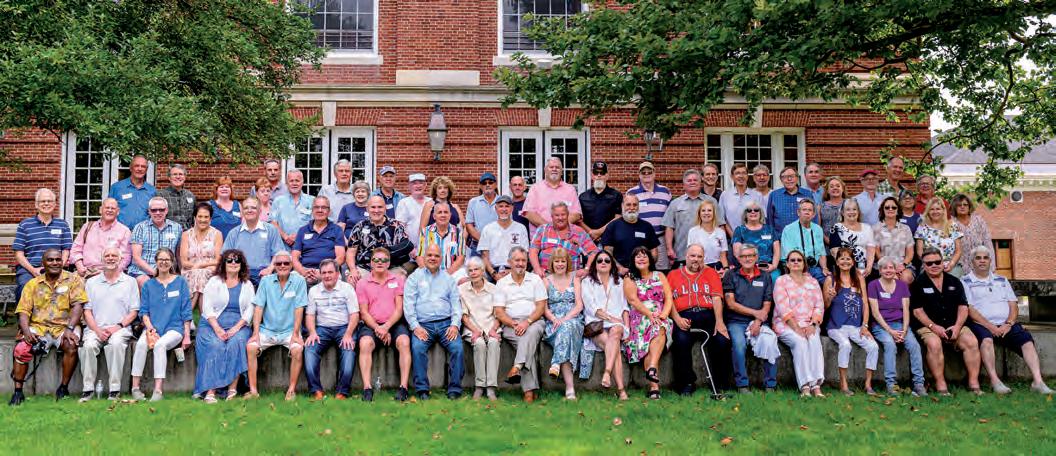
Once upon a time (1967–79), Groton School committed to educate roughly sixty low income, high potential and highrisk students from Lowell, MA, each year in the Groton-Lowell Upward Bound (GLUB) program.
The objective was to motivate, and prepare, high school students from these backgrounds to go where no one in their family had before to college. Tutoring during the school year and staffing during the six-week summer program on the Groton campus was primarily performed by Groton students, alumni, and faculty. The experience was transformative for most who participated so important that, on August 17, about 100 former students and staff from across the country gathered at the Groton School campus to rekindle friendships, share memories, laugh a lot, and cry a little about their time with GLUB.
This reunion was initiated and organized by a committee of former students led by Sharon Blazich, who only spent one summer with the program. The students’ experience of GLUB was powerful. As stories spilled out throughout the day, we heard about the chaos that poverty and
dysfunctional homes had created in their lives, how unattainable seemed the notion of college or another way of living, and how the program led by Frank White ’51 and Peter Camp P’77, ’82 had shown another way of thinking. GLUB had increased their self-esteem as a result of realizing that the counselors and faculty, who came from very different circumstances, cared about them and their futures, and how that education academic and social had positively impacted their lives.
The Webb Marshall Room was full of kids from the projects, now in their 60s, who had become engineers, teachers, union leaders, business owners, veterans, and just plain solid citizens, and whose lives had been informed and enriched by their time in the program. Similarly, we heard from the staff who considered their experience foundational to their future endeavors and understanding of the world.
The reunion was graced by Jean White, widow of the late, great Frank White ’51. The outpouring of affection for Jean
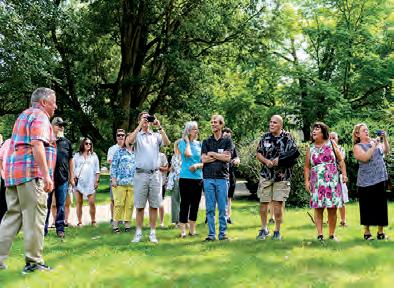
much she and Pat Camp, as well as Frank and Peter, meant to the program’s success.
In honor of GLUB, this spring the students contacted Middlesex Community College to set up a scholarship for today’s Lowell students involved in its Upward Bound program. They have raised $24,000 enough to endow a $1,000 scholarship each year. While that sum pales in comparison to the wealth of Groton School’s endowment, it will make a big difference in the life of a deserving student who lacks the advantages that the rest of us enjoy.
Groton made the decision in 1979 to pursue different service opportunities for its students and terminate its commitment to GLUB, which left a void for students in Lowell. Some former staff remain unhappy about that forty-five years later. But suffice it to say that, for a generation of (now aging) students and staff, GLUB was a lifetime highlight that made everyone’s life richer. The warmth and gratitude demonstrated at the reunion underscored just how valuable GLUB was for those staff and students lucky enough to participate in it.
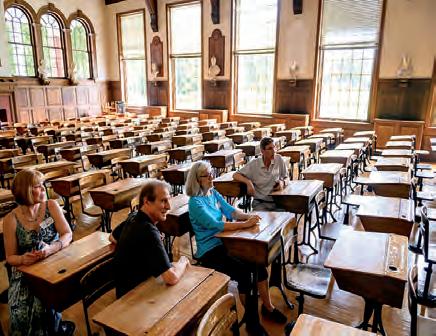

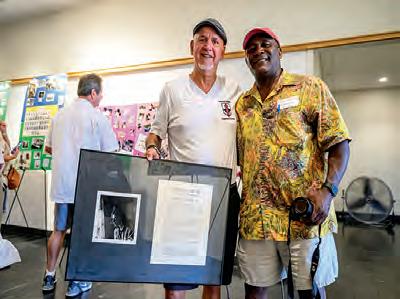
Clockwise from right: “Big Little Child” by Cheyenne Zheng ’26; “Nourishment of Tree and of Man” by Zimo Liu ’24; “The Herd” by Paopao Zhang ’24
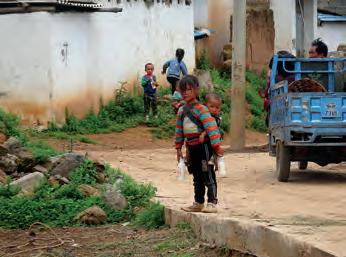
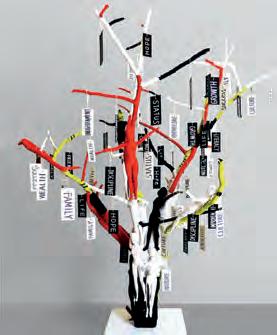
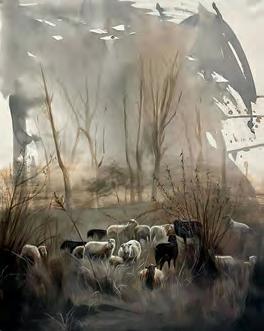
Thirty-six Groton students have won seventy-six Scholastic Art and Writing awards this year, including twenty-two gold keys, the highest regional honor.
The gold key for art portfolio is one of the highest awards in Scholastics, and Groton had two winners this year. Paopao Zhang ’24 won a gold key for her portfolio, “Raw’,” one of eight awards earned by Paopao in total. Her “Studio” and “A Day in the Life” won gold keys in Drawing & Illustration and “The Herd” won gold in Painting. In addition, Paopao’s paintings won a silver key for “Pull Yourself Together” and honorable mentions for “Passage of Time,” “Fire; Smoke; Iron,” and “The Golden Lining.”
Zimo Liu ’24 also won a portfolio gold key for “Identity Unveiled: Art Knows No Wall.” Zimo’s sculpture “A Strange Stone” also won honorable mention.
In addition, Sagata Das ’25 won the prestigious Herb Block Foundation Editorial Cartoon gold key for “Dress for Success and Survival.”
For more coverage of the 2024 Scholastic Arts winners, visit the News page at groton.org.
Groton School welcomed sixty-one GRACE Scholars to the Circle this summer for four weeks of academic challenge and fun. This class marks the ninth iteration of the program and the largest in-person enrollment since GRACE began in 2016.
The optional GRACE (GRoton Accelerate Challenge Enrich) program is designed to prepare rising Fourth Formers for the rigors of Upper School. The flexibility of the curriculum helps all participants reach their full potential, whether that involves accelerating access to more advanced courses or filling a preparation gap. The four-week schedule also features a healthy dose of recreation, art, and off-campus activities.
Most GRACE Scholars take two courses, choosing among math, science, English, Latin, French, Spanish, Chinese, Modern Global History, and new this past summer trigonometry.
All GRACE classes are led by Groton School faculty, and this summer’s group once again includes Headmaster Temba Maqubela, who will teach science. Nine teaching assistants from the Forms of 2020 and 2024 will also participate; five of the nine were GRACE Scholars themselves.
The 2024 scholars will spend several hours each day on classroom learning, with afternoons spent swimming in the school pool, paddleboarding, and playing games such as kickball and Capture the Flag. Wednesday nights are for outings to enjoy such activities as bowling, miniature golf, the movies, and a trampoline park. Special off-campus weekend excursions are planned for Canobie Lake Park and a Red Sox game at Fenway Park, as well as to the beach,
whitewater rafting, and ziplining.
To help address any student preparation gaps in math or English that were extended or intensified during the COVID-19 pandemic, Anna Martinez Groton’s assistant director of academic skills will once again offer sessions on study skills each week, covering topics such as organization, time management, note taking, and test taking.
Welcome to the 2024 GRACE Scholars!
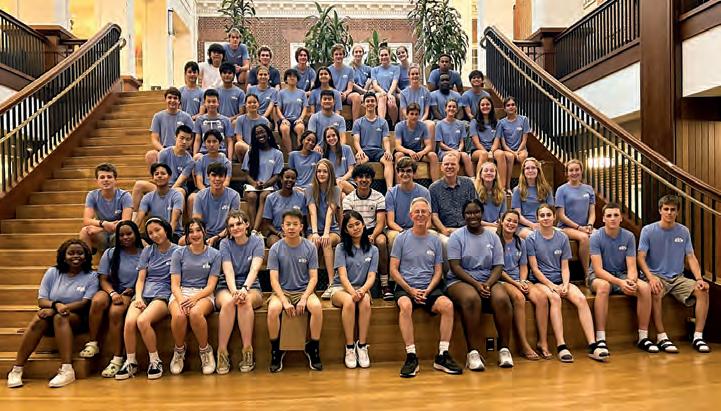
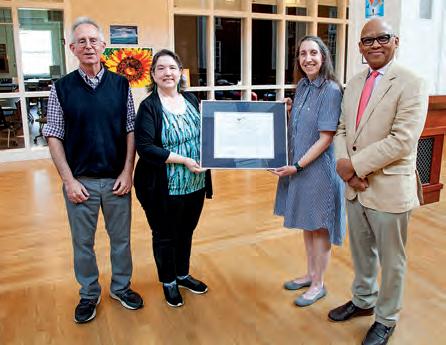
Groton School’s Sandra Kelly, PhD, was awarded the 2024 Theodore William Richards Award for Excellence in Teaching Secondary School Chemistry, widely considered among the most prestigious awards for chemistry educators, this past spring term.
Presented by the Northeastern Section of the American Chemical Society (NESACS), the Richards Award honors a teacher in the Northeastern Section who through innovation and dedication has inspired potential chemists, has communicated chemistry to non-chemists, or has influenced other teachers of chemistry.
Groton Headmaster Temba Maqubela, himself a member of the school’s chemistry faculty, praised Dr. Kelly’s wide range of expertise and knowledge.
“In chemistry, we have structure and bonding, thermodynamics and potential, and kinetics and transformation as the building blocks of the subject,” Mr. Maqubela said. “To be an expert in one of these is an accomplishment. Sandy has expertise in teaching all three not just heads on but also hands on. It is wonderful to work with a colleague of her stature and knowledge.”
Dr. Kelly came to Groton in 1998 as an interim teacher, having just completed a two-year, post-doctoral position in analytical
Congratulations to Zimo Liu ’24 and Marlene Ma ’24 for their winning designs in the sixth annual McCormick Library Bookplate Contest. This marks the first time two winners shared the award.
“When you are presented with two outstanding designs that capture so beautifully this library’s place in the community, how do you decide between them?” explained Library Director Mark Melchior, who chose the winners with acting Visual Arts Department Head Jennifer Ho.
In announcing the awards, Ms. Ho and Mr. Melchior praised each artist’s distinct approach to the challenge.
“Zimo’s image describes metaphorically what books offer their readers a fertile environment for cultivating knowledge and beauty,” they said. “Equally compelling is Marlene’s image of a shared experience of reading on the circle evoking the community of readers we have on campus. Marlene’s image showcases her strong talent for drawing just as Zimo’s design captures his strengths as a conceptual artist.”
Bookplates appear typically in the front matter of a book (the first pages or inside front cover) in collections which wish to designate ownership usually institutions and individuals with large collections.
chemistry at Tufts University. She teaches introductory chemistry, AP Chemistry, and has sponsored tutorials on topics ranging from biochemistry to food chemistry. Dr. Kelly currently holds the W. Homer and Helena P. Smith Chemistry Chair. She has a BS from the University of Indianapolis and a PhD from Washington University.
In a May 14 ceremony in the Schoolhouse, Dr. Kelly was presented her award by NESACS Administrative Coordinator Meg Greenslade. According to the NESACS website, the criteria for excellence correspond broadly to the effectiveness with which the teacher conveys the principles of chemistry to students and to the influence that the teacher has had on students and on other teachers.
“For three decades, Sandy has been the lead chemistry instructor at Groton,” said Stephen Belsky, Science Department head and Kendall W. Foster Chair in the Sciences. “Patient and effective with the anxious and tentative and an inspiring mentor to the more accomplished, Sandy sets high standards and provides each student with direction, support, and applause. Outside of the classroom, she contributes to the co-curricular and residential programs with energy and enthusiasm. Sandy is a classic residential school faculty member, for she shows up.”
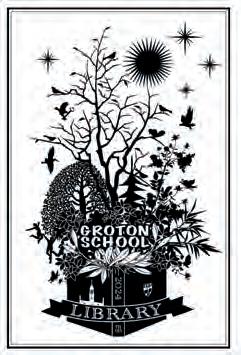
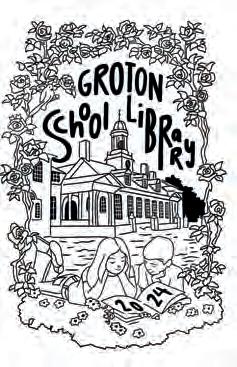
Groton’s student artists began designing bookplates for the school’s library in 2019. The first winning image was created as a linoprint by Sophie Park ’19, and each year since, Sixth Form artists have been offered the chance to design the bookplate for the following year. The winning designs appear now not only in each of the recently purchased books but also are framed and displayed in the Schoolhouse.
Each bookplate features not only the library’s name but also the date of graduation and the artist’s initials somewhere in the design.
Congratulations to Dilzafer Singh ’25, whose talent on the tabla took him to world-class performance venues on both U.S. coasts this past year.
On June 4, Dilzafer and clarinetist Alexander Newman ’25 performed with the Boston Pops at Symphony Hall in Boston, reward for his winning the 2024 Fidelity Investments Young Artists Competition.
“Symphony Hall has such a rich legacy of music, and specifically western classical music,” Dilzafer said before the concert. “Contributing this new and distinct tradition to that legacy is a really exciting prospect.”
The tabla is an Indian percussion instrument, featuring two drums bass on the left, treble on the right played together. As a Sikh, Dilzafer was introduced to the religion’s strong musical tradition at an early age. And, while he began performing around age 4, he didn’t start formal training until a few years later, putting him behind his classmates in early development. That soon changed.
“I’d say it only took me about six months to catch up with all of my peers,” said Dilzafer. “My teacher told me that I had the potential to pursue this further, maybe professionally, and gave me his blessings to go see another teacher.”
While the clarinet might seem an odd choice to accompany Indian percussion, as friends and music FSA (Faculty Sponsored Activity) partners who had known each other since attending the GRACE (GRoton Accelerate Challenge Enrich) summer program two years earlier, both Dilzafer and Alexander saw the potential right away. Dilzafer said the chance to blend his music with a more traditional western instrument, while at the same time breaking out of the “world music” stereotype, was something he couldn’t pass up.
“I knew this could be a very exciting collaboration, playing a very classical Western instrument like the clarinet and combining that with tabla,” he explained.
Alexander said this creative openmindedness is something he experienced with Dilzafer from day one.
“He always enters the room with a spirit of collaboration and curiosity,” he said. “Every time I’m with him, I’m always learning something new.”
In July, Dilzafer traveled to souther n California for the invitation-only Festival of Tabla, one of the largest Indian music festivals in the world, to perform alongside some of the best Indian musicians alive.
Groton students and faculty took a break from classes on April 18 for a Spring Community Gathering that focused on conversation, reflection, and service.
Following chapel, students and faculty attended morning and afternoon student-led breakout sessions held across campus (thirtyone were offered in total), performed service projects throughout the region, or in some cases did both.
“This day is about deliberate community building,” said Director of Diversity and Inclusion Sravani Sen-Das, who organized the event alongside Director of Community Engagement Elizabeth Phan and Director of Alumni Engagement Allison MacBride.
Students were encouraged to work with faculty in planning the day, which sometimes featured frank or delicate conversations. By doing so, Ms. Sen-Das said, they’re learning
interpersonal skills that complement their more formal education.
“It’s preparing them for a very diverse world,” she said. “It’s teaching them how to be more self-aware, how to take your place in a community where compromise and heightened listening and attention skills are required of us.”
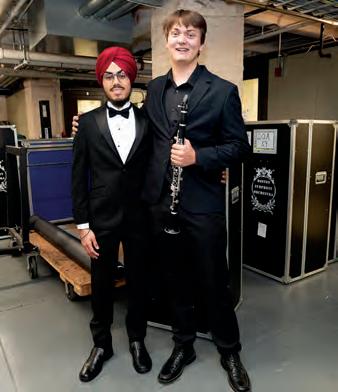
“It’s a very cool opportunity, but it’s also nerve wracking to play in front of this many experienced musicians and share the stage with these grand maestros,” said Dilzafer. “This is the creme de la creme when it comes to traditional tabla festivals. It is definitely a step out of my comfort zone.”
Dilzafer credits the support he’s received on the Circle especially from the Music Department and department head Mary Ann Lanier with allowing him to continue his studies and further explore collaboration with other student musicians.
“The support has been really great and I’m very grateful for Dr. Lanier’s support, as well as that of [Director of Jazz Ensembles] Kenji Kikuchi and all the members of the music faculty here,” he said. “The school has been really supportive, and I also feel a sense of gratitude when giving back to the community through performances.”
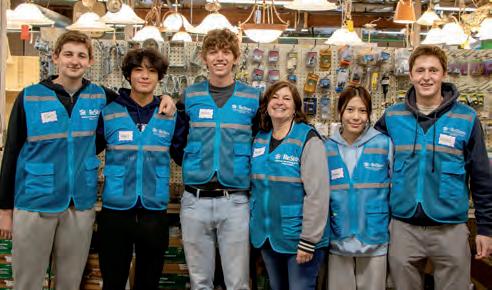
Topics ranged in themes from several dealing with gender to discussions of current events and issues like artificial intelligence, the Israel-Hamas war, social media use, and book banning, to more personal discussions about being a person of color or an international student at Groton.
In addition, two Alumni GCE (Groton
Community Engagement) Panels were held featuring alumni currently working in the nonprofit sector, including ChildSavers CEO Bobby Bolling ’76, Horizons for Homeless Children Director of Evaluation and Public Policy Brendan M. Fogarty ’08, Overdeck Family Foundation Manager of Portfolio Success and Operations Lucy M. Brainard ’14, and Lemontree Executive Director Kasumi Quinlan ’15.
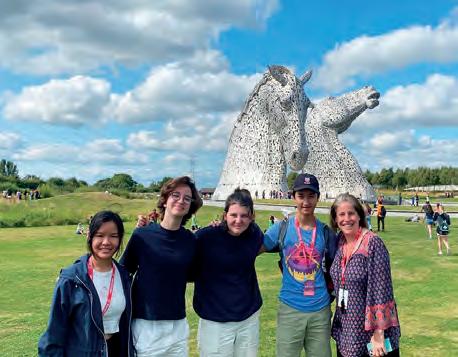
Arts and culture in Edinburgh, Scotland, as student thespians took part in the American High School Theatre Festival.
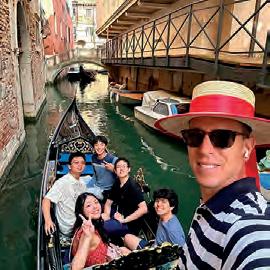
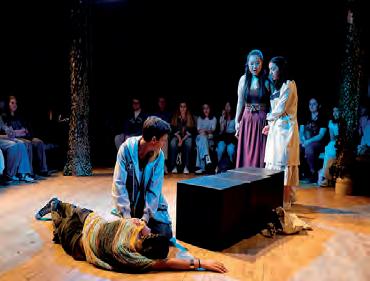
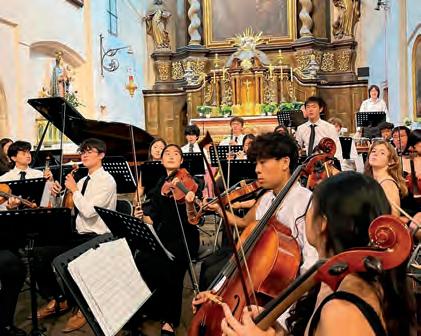
A tour of Austria, Czech Republic, Germany, Italy, and Slovenia, featuring performances, cultural exchanges, and masterclasses.
PERU
A return to Ollantaytambo, the last living Inca town, where Groton students have been visiting for the past sixteen years.
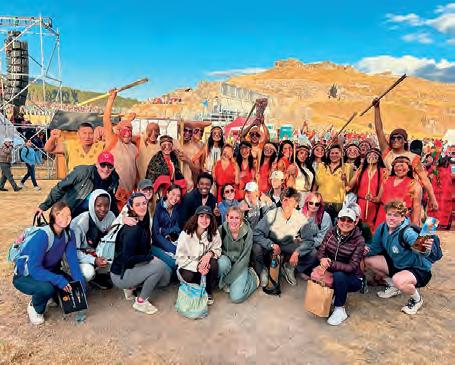
Spring and summer Global Education Opportunities took students to Europe, South America, and Africa, including the first trip to Peru since before the 2020 pandemic.
Twelve days in Paris and Algiers, attending immersive language classes in the morning and exploring in the afternoon.
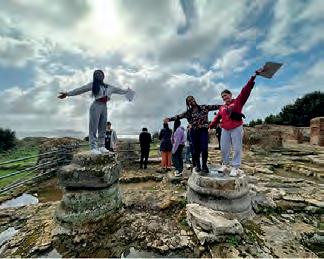
Classics
Visiting the ancient sites of Rome — including the Colosseum, Forum, and St. Peter’s Basilica all while reading and speaking in Latin.
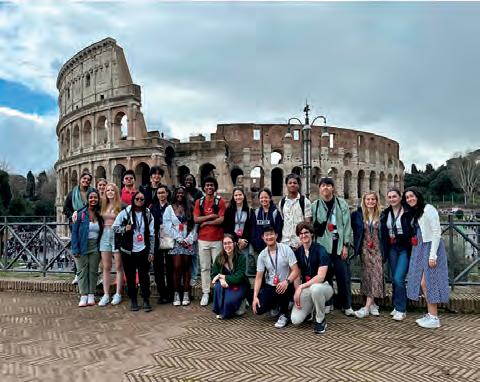
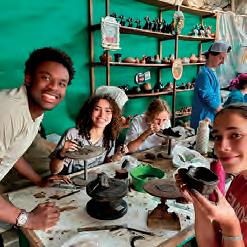
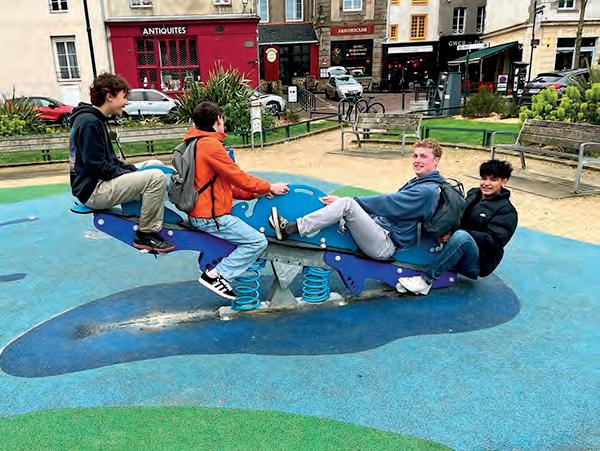
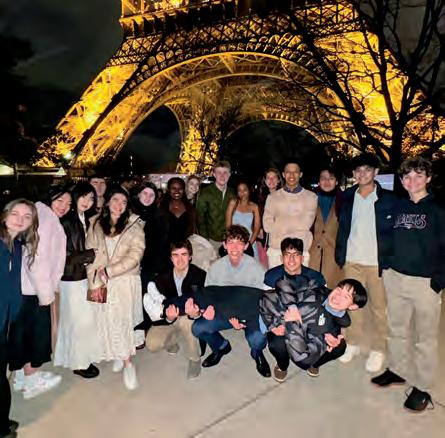
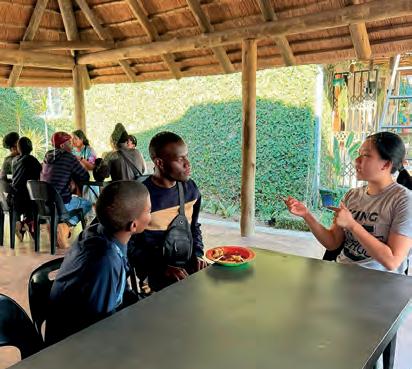
SOUTH AFRICA
Reconnecting with the Imagine Scholars, taking part in a poetry slam, and experiencing an African safari.
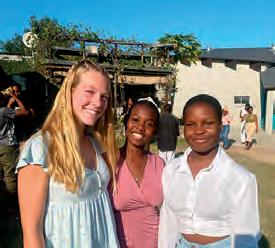
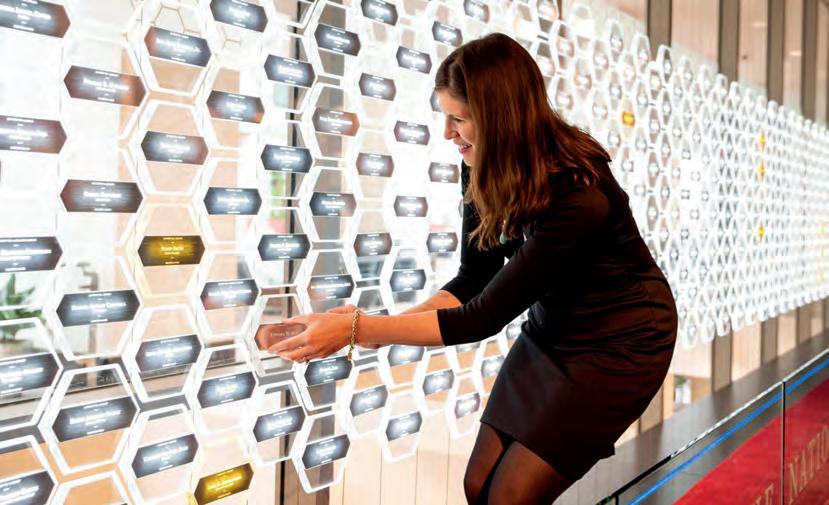
In the Kentucky office of her family business, Wells Bullard ’99 keeps a piece of family history on her shelf: a vintage hardhat made of steamed canvas. It’s an heirloom that carries the weight of five generations, but not in the fragile sense of inherited china or crystal. This is a durable artifact built to protect, and to last.
T he Bullard company, established in 1898, is a leading global manufacturer of personal safety equipment, specializing in industrial headgear. Wells was named CEO in 2017, at age 36. She is the first woman to hold the title, but not the youngest (her father was 35). She has ushered the company through a new era of what it means to make personal protective equipment (PPE) for first responders in a post-pandemic world, which now includes respiratory blowers and hoods.
T he helmet on the shelf means more to her than a bit of historical memorabilia; it’s a symbol of her place in a family tradition of innovation, one that has supported the progress of worker safety for over a century.
“ This entrepreneur—my great-great-grandfather— started a company that evolved into this tremendous safety manufacturing business,” she says. “I feel so lucky that I get this opportunity to help so many hardworking people— utility workers, construction workers, and firefighters— get home safely.”
Wells recounts the company’s history with the devotion of someone narrating a love story. The company began as a supplier to gold and copper miners in California
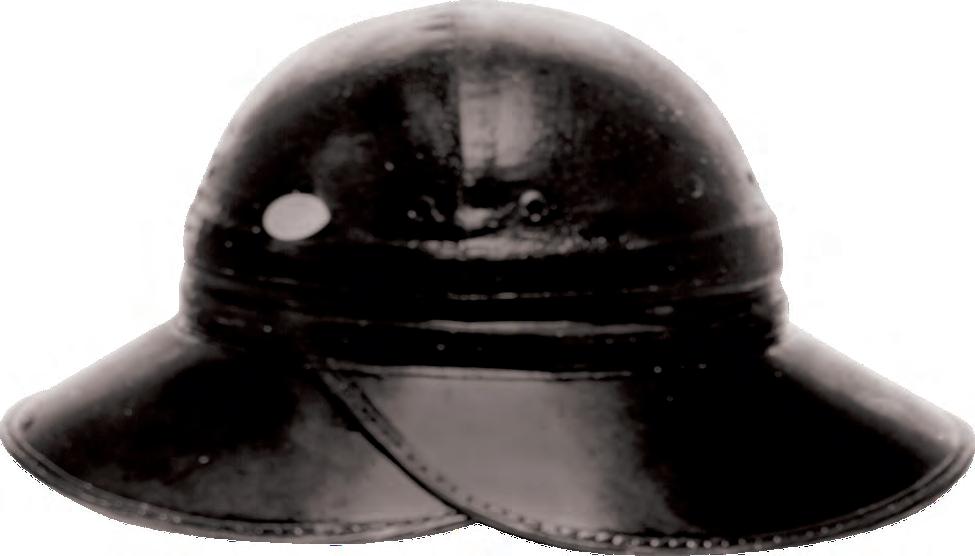
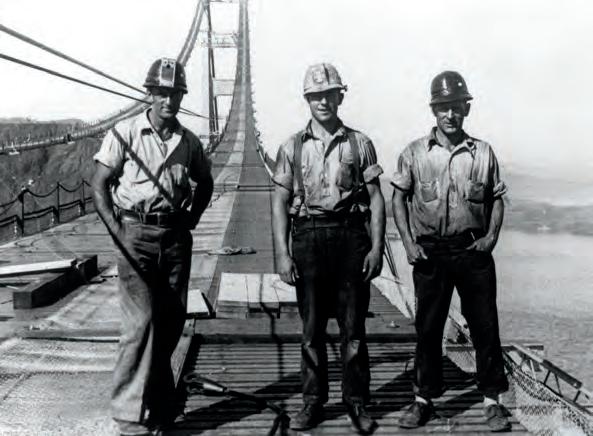
and Nevada. When the founder’s son—Wells’ great-grandfather, Edward W. Bullard—came home from fighting in World War I, he compared the conditions miners face to the trenches of France. And while most miners couldn’t afford the metal doughboy helmets soldiers wore, Edward knew they could do better than canvas baseball caps they wore to protect from falling debris.
His invention—the Hard Boiled ® hat—was made by steaming together glued layers of canvas and covered in black shellac, and it was quickly adopted by workers in other industries. Before the hardhat, grim safety statistics faced construction workers on major national infrastructure projects, with a mortality average of one death per $1 million of project costs. The Golden Gate Bridge was the first major infrastructure project to have a headgear requirement, putting Edward’s invention to use on a grand scale. Edward was posthumously inducted into the National Inventors Hall of Fame in 2022, with Wells accepting on his behalf.
“ We have this ethos in our DNA of just like, How do we watch and
observe and listen to our customers and try to figure out ways to help them be safer and more productive in their really important work? Like firefighters, running into buildings when everyone else is running out, and utility workers trying to restore power after hurricanes,” she says. It’s this impulse that led to the application of thermal imaging technology to allow firefighters to see through smoke, and that led to Bullard working with Toyota during Covid to accelerate development of the air-purifying respirator.
“ We decided to pivot our focus from hardhats to develop healthcare competently, to try to protect as many people as possible during that tough time. It was an incredible partnership, and we were just making as many as we could.”
Wells was born in San Francisco and, at age 8, moved with her family to Kentucky when her father assumed leadership of the company. Though she was immersed in the family business from a young age, neither Wells nor her older brother were pressured
to follow in her father’s footsteps—or raised to believe they were entitled to step into them.
“I always loved Bullard and what the company stood for,” she says, “but my parents made sure we knew we weren’t expected to work there. We were given the freedom to find our own paths and follow our own passions.”
For both siblings, the early part of that journey involved leaving home to attend Groton School. Arriving as a Third Former, Wells found her world expanding with a diverse range of classmates, intellectual challenges, and leadership opportunities. She became a prefect in Hundred House, and was fascinated by studying diplomacy and foreign language. Her interest in Spanish flourished at Groton under the guidance of faculty member John (Señor) Conner P ’11, ’14, ’16, ’19, with whom she designed a small advanced independent study of literature, reading Don Quixote and writing analytical essays in Spanish.
“Groton allowed me to dive deep into subjects I was passionate about,” she recalls. “The ability to create a class like that and work one-on-one
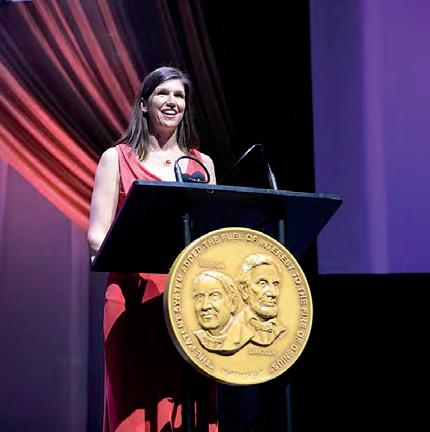
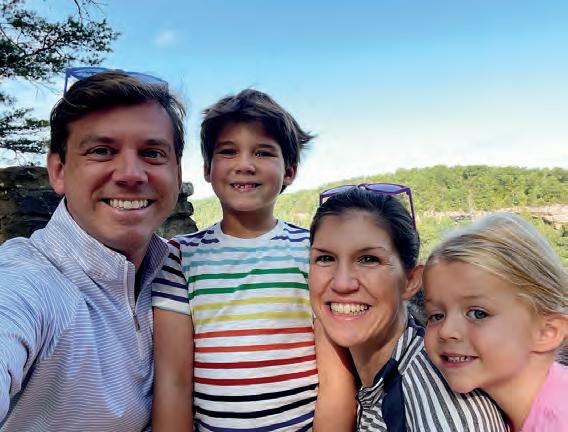
with a teacher was extraordinary.”
One of her most formative leadership experiences came during her Sixth Form year, when a divisive situation arose at the school, testing the bonds of the student body. Wells and the other prefects worked hard to foster unity in the face of widespread discord—which in hindsight, functioned like experiential learning in conflict resolution for the future CEO
“ We had the challenge of uniting our form, and I learned a lot about inclusive leadership in a divisive environment. It taught me how to bring people together without being inauthentic. You can still be yourself, with your own feelings and your own views, and you can still be welcoming and inclusive and create an environment where people can share some things, if not all things. It took a lot of brain space at the time, and was a really formative leadership experience,” she says. “Today, in Kentucky, I have a lot of coworkers who are very vocally pro a certain thing, and then some people are pro something else. And how do you create shared respect and experience? In today’s world that might be
one of the biggest skills that are necessary to have come out of a younger generation.”
Her fascination with global affairs and language led her to major in International Relations and Spanish at Stanford University. During her college years, Wells spent time studying and working abroad in Spain, Argentina, and Chile, honing her language skills and gaining a broader understanding of the world. Initially, she considered a career in diplomacy, but her focus shifted to the impact she could have in the family business, which was becoming increasingly global.
A fter completing her undergraduate degree, Wells spent three years at an industrial distribution company, gaining hands-on experience in operations. She views this training as pivotal in her decision to step onto the Bullard path—and appreciating the importance of getting her professional ducks in as much of a row as possible beforehand. She pursued her MBA at Harvard Business School, then in 2008, joined Bullard in manufacturing engineering. There, she got a firsthand
understanding of walking the walk through managing the production process (“literally walking eight miles a day in the plant”) then, over the years, working in marketing and product development. By the time she was named CEO in 2017, she was married and expecting her first child.
Today, her brand of leadership is centered in communication, and moving employees toward a shared vision. How do they gain clarity on the True North of Bullard? How should processes be set up to make sure employees have enough flexibility and creativity while they follow that True North? How to steward the foundational practices for the next generation?
At the moment, the next generation are just 4 and 7 years old, and aren’t entirely clear on the True North.
“My daughter,” Wells says with a laugh, “thinks Mommy is a firefighter.”
—Nichole Bernier
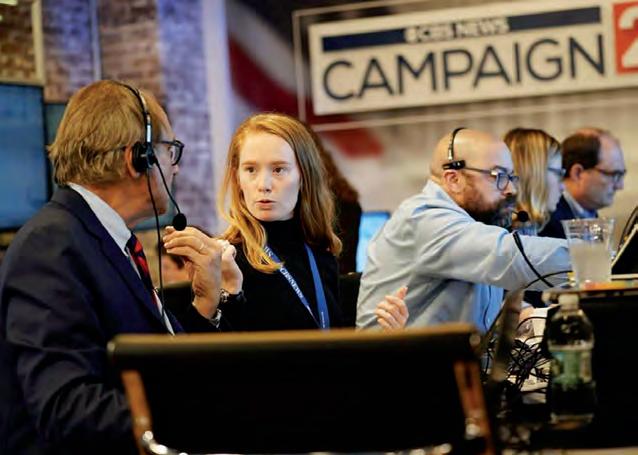
The periodicals room in Hundred House was heaven for a budding journalist. That’s where Ellee Watson ’13 would sit in an overstuffed armchair overlooking the Circle, reading the many newspapers and magazines that hung from long rods: the Wall Street Journal, the Boston Globe, the New York Times, the Washington Post, and some foreign publications.
“If my favorite chairs were taken, there was a big circular table in the middle, which was good, too, because I’m kind of small,” she says, “so laying out these big newspapers was easier and wouldn’t wear me out.”
Ellee, now a Pentagon reporter and producer for CBS News, doesn’t wear out easily. From her posting in Washington, D.C., she covers the political news of the day as she has for the past seven years—which have been some of the most politically contentious ones in recent history. Each day, she is essentially “running around the Pentagon asking different officials about what’s going on,” she says. On a light news day, she writes stories for the network’s website; if the material merits television coverage, she helps the
correspondents and producers get it on the evening news or the morning program.
For Ellee, the job is the natural culmination of a life leading to journalism. Even so, the 2020 election was a tumultuous time for anyone to be coming of age as a political reporter.
“We used the word ‘unprecedented’ a lot, and until this current election cycle, that election cycle was pretty unprecedented,” she recalls.
In 2019 she traveled the country covering presidential candidates and House and Senate races, and after the onset of the pandemic, everything changed, including a pragmatic shift to informing everyone how the civic process was supposed to work with mail-in ballots.
“Everything was so different, and I think it was particularly difficult because there was a lot of fear around it,” says Ellee. “In a normal election year, you can just approach people for man-on-the-street interviews, and just walk up to somebody at an event and say, ‘Hey, what are your thoughts on this? Tell me more about your community.’ And that is a lot harder during the pandemic to make sure you don’t invade people’s personal boundaries.”
While Ellee never could have imagined the types of challenges she’d face early in her career, the choice of career itself was not much of a surprise. Ellee grew up in Wichita Falls, Texas, where her mother was editor of the local newspaper, and her father was a college professor specializing in American government and international relations.
“I knew I liked both those things,” she says, “and I liked growing up in my mom’s newsroom, so I kind of combined them.”
Groton was a long way from Texas. But when she arrived in Second Form, the school’s small size made the change manageable. “It was so beautiful, and it was regimented, in a balanced way. It was my first time being away from home, and I remember thinking, ‘There’s no way to miss home when they have so many cool things to try.’”
Ellee tried hockey for the first time, and rowing, the latter as coxswain. In time, she joined the staff of the Circle Voice,
and being a fixture in the periodicals room almost certainly played a role in her receiving the Library Award at graduation. She always appreciated that the academics at Groton expanded her focus wider—beyond the U.S., beyond writing papers that were like a collection of bullet-point facts, beyond working on goals individually. And even, by Sixth Form, beyond the formal curriculum, when she and a friend designed their own independent-study English class dedicated to the work of Jane Austen. That kind of latitude to create their own course of study was a hallmark of her experience at Groton, which she says felt designed to give students more agency as they got older.
“The classes really taught me to go wider than just the U.S. There was the whole world out there that I didn’t really know,” she says. “I still remember my Fifth Form term paper, because of all the critical thinking you have to do. There’s a larger meaning that you’re working towards that isn’t going to be evident if you just parrot bullet points back.”
Ellee believes in addition to analytical thinking, the teamwork mentality within small classes had direct application to her ability to function well at CBS. “There’s a kind of ‘worktogether-know-each-person-nextto-me’ kind of feeling at Groton that really benefited me, especially in TV news, where you know things have to happen quickly and you need to know who to call and how to talk to them,” she says. “You have to know how to get something done quickly and smartly.”
Ellee’s five years as coxswain led to being recruited by George Washington University, where she worked with the crew team while studying international affairs with minors in journalism and French.
“I always knew I wanted to go into journalism, but someone along the way gave me the advice to major in what you would want to cover, and not necessarily major generically in journalism. So that’s what I did.” The CBS offices were close to the GW campus, and
she began an internship that led to a job right after graduation. “We finished our rowing regatta, and the next week, I was at my desk at CBS.” She learned the ropes by being an executive assistant to the bureau chief, and worked her way up to being a Campaign 2020 associate producer and Pentagon reporter.
‘A Formative Experience’
Ellee returned to Groton for both her five and ten-year reunions, where she found it easy to reconnect with old friends, regardless of where their paths have taken them. Formmates, she found, had pursued an impressive and intriguing range of careers, even if she couldn’t always parse the fields and responsibilities.
“I don’t always understand what they do,” she says with a laugh. “My work is one of those word-bank jobs. You know, when you pick
adjectives out of a word bank—doctor, lawyer, fireman, journalist. It doesn’t take work to understand it.”
But even if their niche in science or sales sounded like a foreign language, the people themselves were still always comfortingly familiar.
“What really stood out to me was just seeing the people from your form, even if you haven’t talked to them in a while, you just pick up where you left off because it was such a formative experience,” says Ellee. “So much of our identities were forged in that environment.”
—Nichole Bernier
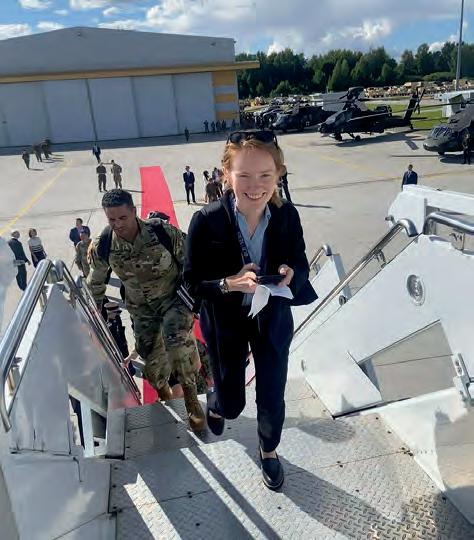
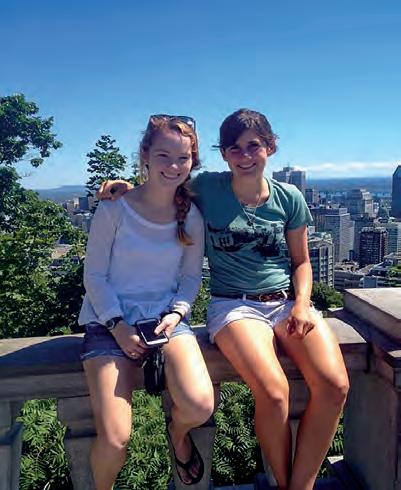
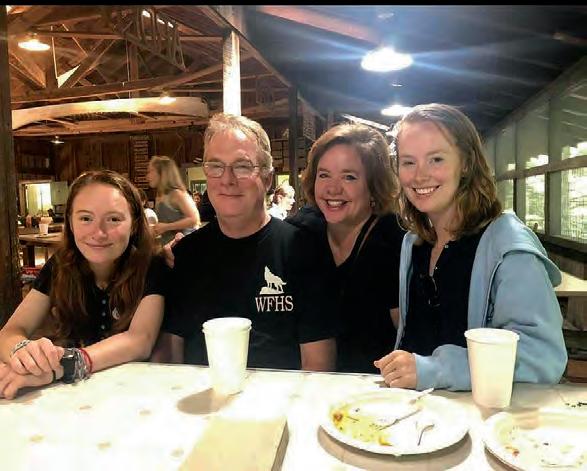
This past school year, Groton School had five faculty departures spanning the Classics Department, History Department, Science Department, and the Academic Skills Office. Combined, Stephen Belsky, Kate Dennison, Tommy Lamont, John Lyons, and Paula Marks accounted for 165 years of service on the Circle. Three were department chairs. All were special. Here, they grew as teachers and as people, raising their families while becoming indelible parts of the Groton community.
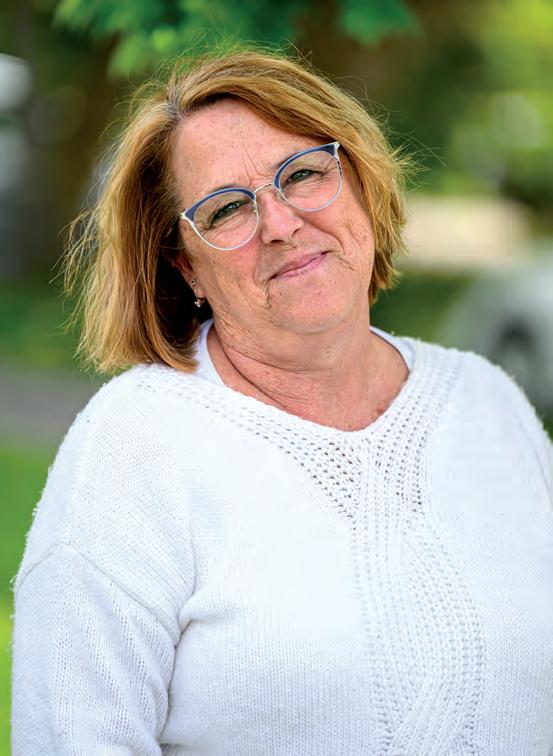
A native of Tifton, RI, Paula Marks studied zoology as an undergraduate at Connecticut College. She joined the Groton School Science Department in a part-time role and became full time in 1995.
Q: Was science always something you were interested in?
Paula Marks: Absolutely. To this day, it still fascinates me that one cell can carry out so many complicated functions. So when I was teaching, I focused a lot on biochemistry because it’s pretty amazing what one cell can do. And, to this day, that remains something that fascinates me.
Q: Did you have an idea of what you want to do with it? Was teaching always in your mind?
PM: Oh, not at all. I came to teaching through the back door. My background is in lab research, and I did that until I started having children and I realized pretty quickly that sometimes you have to go in on the weekend or on holidays. We were trying to develop novel techniques for identifying cancer cells, which would eventually lead to understanding more about how to treat those diseases. But I was definitely just on the very primary research, working with the first generation of monoclonal antibodies. That’s really what I did anyway, so it became pretty apparent that wasn’t going to work with having children.
After having her first child, Ms. Marks started thinking about a career pivot. While at an alumni weekend at her high school alma mater, St. George’s, she spoke to her old science teacher, who suggested she look into a parttime sabbatical replacement opportunity that had opened up at Groton.
“ Not only as a mom, but as a professional, I am deeply appreciative of all the opportunities I had at Groton.”
Paula Marks
PM: Believe it or not, I had to go back and reread my textbooks. But Steve [Belsky] was an amazing mentor. I followed his lead and then we worked collaboratively, and what we realized is we both love lab work in our department. So we made that an emphasis of our curriculum, which a lot of schools can’t do. They don’t have the budget and they don’t have the lab space. But yeah, it was a lot of going back and trying to figure out how to explain something so the students understood it, since I was used to speaking with other scientists.
By the time a full-time position opened up, Ms. Marks had three children: Elizabeth ’09, Emily ’12, and Nicholas.
PM: From the beginning, even though I was part time, I brought my kids a lot. There was a whole cohort of us with children the same age. So there were the Lyonses, the Blacks, the Lamonts, all these young kids in the same age group.
Ms. Marks ran three dorms throughout her career, and coached JV girls hockey and JV lacrosse.
PM: I felt like my role as a dorm head, of all the roles I had in terms of my job, was the most important because they needed help. It was the most time consuming, but I felt the most rewarding.
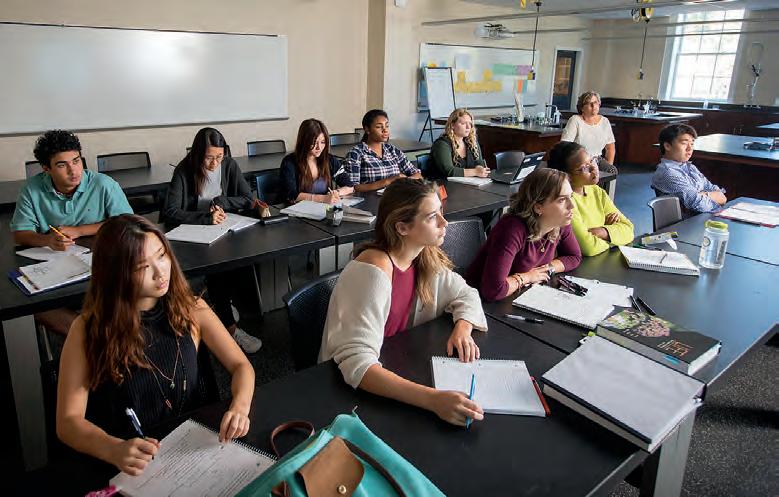
Q: What’s the best memory you’re going to take away from Groton?
PM: Watching my girls and my advisees walk across the stage [on Prize Day]. I have a couple of advisees I’m still in touch with. So those relationships and what Groton gave my daughters are the best things.
Ms. Marks has moved back to Rhode Island, where she’s looking for her next adventure and enjoying a newly expanded family.
PM: I don’t want to teach anymore. I’m thinking about perhaps doing some tutoring or working for a nonprofit, but I haven’t quite found the right fit. And then I have a granddaughter, so I’ve been spending a lot of time with her, which has really been pretty awesome. There are a couple of us in that boat: John Lyons is about to have his second, and it’s just a whole different priority. I would say this: Not only as a mom, but as a professional, I am deeply appreciative of all the opportunities I had at Groton. The science lab, the new building that you see now, is not where we started. And from day one, having the privilege of working in that lab space, in that classroom space with the technology and the support, allows you to grow as a teacher.
The resources, having a supportive department head like Steve, and all of that, I’m very, very grateful for. In addition, I ended up actually being a single parent for most of my time there. And the support between the colleagues is just amazing. I’m very grateful for the opportunity.
MS. MARKS was my advisor at Groton and became a second mother to me during those years. She helped me navigate a lot of personal and academic challenges, mainly by patiently listening, pushing back on me when appropriate, having me do conditioning exercises during JV hockey practice, and (most importantly) making me homemade brownie sundaes when that’s really what I needed. I’m so appreciative of everything she has done for me and taught me, and am thankful to have been able to attend the retirement ceremony!
Lucy Brainard ’14
•
HI! PREFECTING in Marks was THE BEST. You were such a warm, fun, caring dorm head (always looking out for us!) and the quality of the feeds was simply unsurpassed—monkey bread! Ecstasy in a bowl! I am very, very appreciative for having had you as a Third Form bio teacher and as a top-notch dorm head. I hope you enjoy a well-deserved retirement.
Sarah Brooks ’12
WHEN I think back to my happiest Groton memories, I am immediately transported back to AP Biology with Ms. Marks, and specifically, long hours spent with the “family” lab group during the 2014 –15 school year. Ms. Marks showed us incredible patience as we stumbled our way through the challenging curriculum and really
reinforced the power of finding humor in the mundane and in our missteps. Ms. Marks kept her cool when our brains turned to mush at the end of our weekly plus thirty class and never failed to provide encouragement, celebrate our wins (like a miraculous passing exam grade!), or push us to our full potential. My deepest congratulations to Ms. Marks on her retirement my Groton experience would quite simply have not been the same without her, and for that, I’m forever grateful.
Holly McNaughton ’15
• • •
MS. MARKS was my AP Bio and Anatomy/Physiology teacher. Since I entered Groton in Fourth Form, I did not take intro bio as a Third Former or at my previous school. I jumped into AP Bio as a student with a budding interest in science and the expectation that it would come naturally. This was not the case, especially since I sat in the back row and often got distracted by friends in the class. In my fall semester comments, Ms. Marks was honest about my potential to excel as a student but acknowledged that I was holding myself back in many ways and encouraged me to keep up with assignments, ask for help when I needed (one of my greatest challenges), and meaningfully engage during class. After that, I began to invest in the course, spending time working with her on extra practice, and finished the year strong. I discovered a full-fledged
passion for biology that carried through to the following year when I took a semester of Human Physiology with her. This time, I worked incredibly hard and even finished the class with the highest average. On Prize Day, Ms. Marks said a farewell to me that I have yet to forget. She encouraged me to continue with science and medicine, and expressed that she knew I would go off to do great things. I can confidently say that I have carried that message with me, I majored in Biochemistry in college, have worked in cardiac surgery research the past two years, and this summer I will start the PA program at the Stanford University School of Medicine. THANK YOU Ms. Marks, for seeing the potential in a distracted, impatient teenager and reminding me of my strengths. Your reassurance and belief in me helped shape me into the scientist I am today and I will keep your teachings with me as I look to make an impact in the medical world. I will always be grateful for your guidance and I hope you have an amazing retirement, you deserve it after your service to Groton and all of its students!
Angelina Joyce ’18
•
MS. MARKS was a phenomenal educator. From AP Biology to her Anatomy Dissection elective, she challenged and engaged the class. Her teaching laid a foundation of knowledge for myself and other classmates in order to pursue careers in science.
Thank you, Ms. Marks, for your years of dedication to the school.
Sam Girian ’18
MS. MARKS made a significant mark on my five years at Groton. She was my advisor from the start and always served as a source of wisdom and comfort, even when I presented some unforeseen challenges! After four years of her unwavering support, our senior year Jen Shea, Alissa Gordon, Hilary Minot, Anna Sjogren and I took up the sometimes rewarding and often thankless role of senior prefects in Ms. Marks’ Third Form girls’ dorm. Ms. Marks created the most warm and welcoming environment for us and the girls. She insisted that the door connecting our hall to her home was always open. We thought nothing of strolling in to pet the dog, say hey to the kids, or catch up about the latest Groton happenings. As a mother with a busy home now myself, I have even more appreciation for the time that she carved out for us and the level of care that we all felt, especially with the classic teenage issues that inevitably arose. Thank you, Paula, for being an incredible academic mentor and teacher, but especially for making our home away from home so positive and forever memorable. Congratulations on your retirement!
Whitney Rauschenbach ’02
John Lyons arrived at Groton in 1995 and was chair of the History Department from 2006 to 2012. He was awarded Groton’s John Hay Whitney Chair in History and Public Affairs in 1996, the Henry and Wendy Breck Award for Teaching Excellence in June 2000, and the Jonathan Choate ’60 Faculty Award for excellence in teaching and coaching in 2012. He also held the Charles C. Alexander Endowed Varsity Football Coach position, and was inducted in the Groton School Athletic Hall of Fame this past Reunion.
For the Lyons family, teaching history is equal parts vocation and birthright. The patriarch, Thomas, was a longtime history teacher and football coach at Phillips Andover Academy and, besides John, sons David (St. Mark’s) and Joe (Deerfield Academy) and granddaughter Molly ’12 (Tabor) have all gone into the family business.
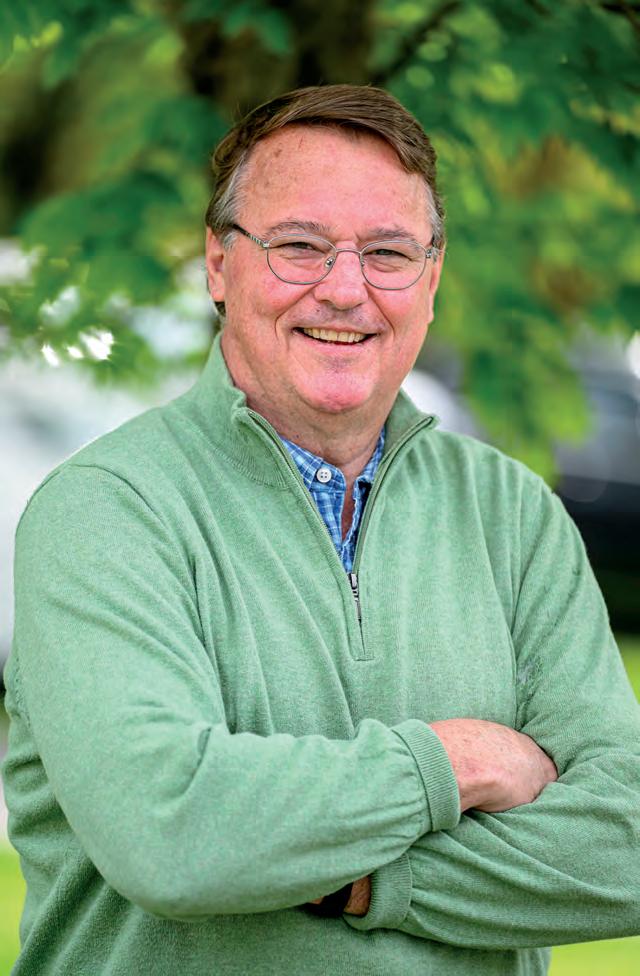
John Lyons: I remember just constant dinner table discussions about politics or sports. Those are the two biggies and you can’t talk about politics unless you understand history. The news and politics and sports dominated conversations growing up.
A graduate of Middlebury College who starred in football there, Mr. Lyons started his teaching career at Northfield Mount Hermon School. He moved on to St. Andrew’s School in Delaware, where he also spent time getting his master’s degree from Georgetown University. When football coaches at Deerfield Academy and Groton both retired, the schools reached out to see if he’d return to New England.
I love coaching football. I chose Groton over Deerfield because I really liked [sixth headmaster] Bill Polk. Also, my wife was able to work and pursue her career at Mass General, and we had lots of friends and family in the area. Coaching is the purest form of teaching. There’s a standard, right? You have to do it this way to succeed. If a kid screws up on a history paper, you gently try to help them understand why. With football, it’s pretty clear: You didn’t step with this step, you did it wrong. Do it again. You cannot do that in the same way in a classroom.
Q: Was there anything about coaching that informed what you did in the classroom, or vice versa?
JL: What we do as teachers, it’s not rocket science. It requires two things. The willingness to work hard, prepare, get material back to kids thoroughly and thoughtfully graded and on time, and the ability to communicate with a certain enthusiasm. The one thing you cannot do is commit the cardinal sin of being boring. My father would always tell me that. I loved what I was doing and, whatever students may remember, they probably remember a certain amount of enthusiasm. And so I think both apply. If your team is prepared, they look prepared. If your class is prepared, they’ll be able to have thoughtful conversations or they will do well on AP tests or what have you.
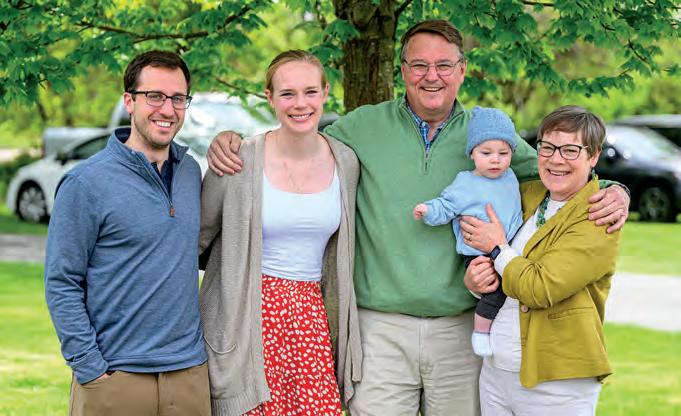
Q: How has the school changed or evolved since you’ve been here?
JL: I think by definition, if you’re going to raise tens of millions of dollars to make the school more accessible [through Groton’s GRAIN affordability and inclusion initiative], you’re going to have a student body that is a reflection of that. That there are fewer kids from the traditional sources of students and more kids for whom going to a school like this is the first time in their family’s experience. And all of that is a really good thing. Financial aid is the key to having a really interesting student body because it means the school can afford the most interesting, the best students who can provide the richest learning environment possible. It’s not as though Grotron wasn’t diverse when I got here, but its commitment to having a school look like the world has been ramped up dramatically, all of which is a good thing.
After a freak accident in 2019 left Mr. Lyons with a ten-day stay in intensive care, multiple surgeries, and a rehabilitation assignment, he says he began to think about life beyond teaching.
JL: I’m 65, I still run every other day. I’m in reasonably good shape. I’ve got a ten- to fifteen-year window to do whatever I want: run, ski, hike. And my wife and I have lives that are too busy as it is. She’s got a huge job. And so we both looked at each other—she’s a year younger than me—and said, we can do this. We’ve got grandchildren. There’s a lot of world to see. Let’s start a new chapter.
Q: What are you going to miss the most?
JL: Students, the classroom, and the field. Groton is a very powerful community, but there’s not a lot of downtime with kids. We have a lot of community time, but it’s in chapel or it’s sit-down dinner or whatever. I really love those one-to-one conversations you have with kids about just about anything. I find them fascinating characters and will miss that, but those relationships will stay.
“ He showed me as a student, fellow teacher, and friend just how transformative the history classroom can be.”
— Matt Hession ‘99
I LEARNED two things from Mr. Lyons. The first was that I could be a lawyer if I set my mind to it, which is both important to say and not very interesting. The second was that no matter what I ended up doing, I would need to treat people with humility and respect. To do well in JL’s class, you had to analyze historical facts and apply legal holdings, but you also had to treat people with respect, discuss uncomfortable policy issues with civility, take constructive criticism with grace, and hold yourself to a high standard of personal conduct. JL wanted to have a constructive dialogue with his students and that meant enacting guardrails and norms in the classroom. He did not tolerate arrogance, rudeness, or disrespect. This wasn’t tall poppy syndrome: JL knew that we wouldn’t learn unless we all learned together. It was sometimes hard to tell the difference between JL the coach and JL the teacher, and he persuasively demonstrated that maybe there shouldn’t be one.
Respect, civility, and grace are not things you see every day, and especially not in the courtroom. But they make a difference, and so did JL himself.
Winston Shi ’12
MR. LYONS’ insatiable storytelling transformed how I understood history overall. As a history major and now looking towards law school, I am forever grateful for my experience and early exposure to the law and how to think/have tense discourse with my peers. Mr. Lyons instilled the love for history not as a subject, but as a means of understanding real things happening to real people in real time.
Lilias Kim ’19
MONUMENTALLY transformative only scratches the surface of Mr. Lyons’ influence in my Groton years and thereafter. In his classroom, we’d be swept off our feet as he expertly guided us through some key element or history of the Fourteenth Amendment. He’d nimbly walk us through the historical details of key court cases, never leaving out a crucial historical detail whose consequence impacted interpretations of the American past. A master teacher, he knew exactly what questions would spark the discussion, inspire us to wrestle the evidence with purpose, and advance our own arguments
about the American past. When I returned to Groton and taught history, I saw firsthand his supreme dedication to Groton students: his careful preparation of class material, his intellectual inspiration with history electives, his commitment to reading term papers and offering detailed feedback that inspired students to their best work yet. He believed in his students, set the highest standard for them, and then encouraged and supported them every step of the way. He showed me as a student, fellow teacher, and friend just how transformative the history classroom can be and the incredible hard work, patience, and dedication that makes it all possible.
And his family Hannah, Rachel, Molly their warmth and support knows no bounds and showed me powerfully the incredible forces of love and laughter. Perhaps that was the greatest lesson of them all to enjoy every minute with family and the great joy of that journey.
Matt Hession ’99
DURING A parent-teacher conference the year son Reed (2009) took Court and Constitution, John delivered one of the more unusual lines I’ve heard. Referring to Reed’s handwriting, he said, “and if Reed would take the pencil out of his nose, he’d get a half-grade better.” His words accomplished his purpose.
Wick Simmons ’58
• • •
I was fortunate enough to play varsity football for Mr. Lyons, and was also a student in his Court and Constitution class, one of the great classes during my time at Groton. If a Groton education is meant to instill values like service, integrity, and industry, Mr. Lyons has been a great medium through which those values are imparted. His passion for this country’s history, the potential of our system of government, and the salutary effects of being able to deliver and receive a crisp form tackle was ever palpable and infectious. His sense of humor brought life to the mundane and spirit to the exhausted. His quips, delivered with the intonation of a baritone Kermit the Frog, always struck with precision and were able to motivate in a particular and effective manner both on and off the field. I know I’m not the only one who looks back and holds the memory of John Lyons close to their hearts.
John, thank you for everything you have given us. Best of luck in your next chapter.
John Dantzler-Wolfe ’99
• • •
HI! I AM not sure if I can be too specific, but I hope you will accept this generalized, heartfelt, belated, but very, very appreciative thank you for being such a fantastic history teacher. I remain, to this day, deeply grateful for the experiences I had in your classroom and I hope you enjoy a wonderful, Bruce Springsteen concert–filled retirement.
Sarah Brooks ’12
TOUGH TO embody JL’s tough love over the years I spent with him on the Circle, but here’s one I hope he remembers: spring of 2010. Court and Constitution Mock Court a situation I was grossly underqualified to be in amongst some very sharp constituents. JL had prefaced the event by making it very clear to the class: we ALL needed to speak, something I had no qualms about heading into court day. That tune quickly changed when the lights came on, arguments were made, and I realized I was indeed grossly underqualified for the situation. Sweat began to bead on my head and JL gave me a few of his looks throughout, sensing I was drowning. I knew I couldn’t let him down. As closing arguments were made, I mustered up the strength to get a few words in, probably regurgitating a point made by a peer, sure, but I got my words in. I scanned over to see a huge smile, a light chuckle, and thumbs-up from him a moment I won’t forget. JL, you’re a special man who left a lasting impact
on my and countless others’ character over the years. Wishing you happiness and Bruce Springsteen on repeat in retirement, JL!
Dale Adams ’10
•
JOHN LYONS had a deep and very meaningful impact on me as a history teacher, dorm head, and football coach. His passion for all three, his supportive but demanding approach, and his commitment all were critical to my formation at Groton. I will continue to remember and be grateful to him for everything he taught and formed in me.
Elbridge Colby ’98 •
DURING MY Sixth Form year (2012–13), I took both terms of Court and Constitution with Mr. Lyons. The class was the highlight of my Groton experience. I relished learning about the American legal system, the U.S. Constitution, and the foundational cases that have defined the powers of government and the rights of individuals. Mr. Lyons, as usual, had high
“ Thank you, Mr. Lyons, for being such a wonderful teacher and mentor to me and so many other Grotonians.”
Catherine Walker-Jacks ’13
expectations for us as students. On the first day of class, he quizzed us on the names of the nine Supreme Court Justices. I didn’t fare too well. But by the end of the term, I could rattle off not only the names of the nine justices but also the names of dozens of seminal Supreme Court cases, ranging from Marbury v. Madison and Lochner v. New York to Planned Parenthood v. Casey and Grutter v. Bollinger. In addition to a lexicon of judicial precedent, we students gained something even more significant: the ability to understand and analyze the tremendous, and evolving, impact of the federal judiciary considered by the Founding Fathers to be “the least powerful branch” on modern American government and society. Indeed, through in-class discussions and moot courts, we developed the knowledge, tools, and confidence to participate in nuanced, informed debate about the judiciary’s role in shaping issues of great societal importance. These skills served us well in the years following our Groton graduation, as the Supreme Court issued repeated landmark decisions on pivotal issues relating to civil rights and individual liberties the very issues we had analyzed and debated in Mr. Lyons’ classroom.
My love for the law was sparked in Mr. Lyons’ class, but it didn’t end there. Several years after graduating from Groton, I found myself missing the kinds of discussions and debates we had in Court and Constitution
class, and I set out to apply for law school. Throughout law school, and since graduating, I have interacted with several recent groups of Court and Constitution students, hosting the class for visits at Harvard Law School and the Boston federal courthouse where I worked as a judicial law clerk. Just as Court and Constitution was a highlight of my experience as a Groton student, my interactions with the Court and Constitution class and Mr. Lyons have become a true highlight of my time as an alumna. I am so thankful to Mr. Lyons for teaching such a fantastic class a class that set me on the path to pursuing my law degree and becoming a lawyer. I’ve greatly enjoyed staying connected to Groton through Mr. Lyons and the students I’ve been able to meet along the way. And, even though Mr. Lyons may be retiring, I will remain a resource for any Groton student interested in talking about the law, law school, and careers in the legal profession (or anything else, for that matter!) I sometimes joke but with some seriousness that I’ll one day try to teach the Court and Constitution class myself. It would be an honor to continue Mr. Lyons’ legacy by teaching the unique and impactful class that he created. But for now, I will just express my utmost gratitude: Thank you, Mr. Lyons, for being such a wonderful teacher and mentor to me and so many other Grotonians.
Catherine Walker-Jacks ’13
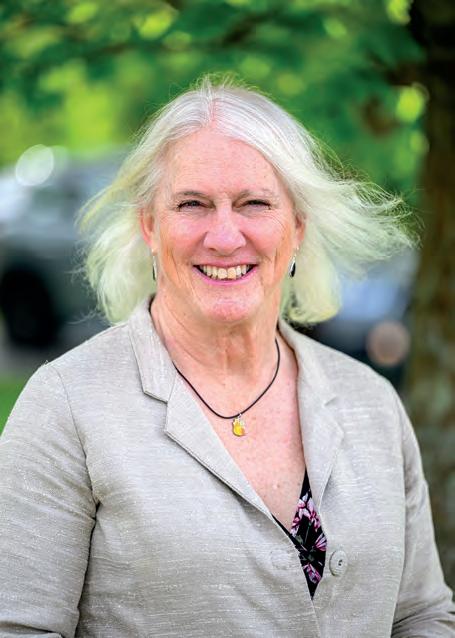
Tommy Lamont joined the Groton History Department in 1997 after earning her bachelor’s degree in history from Harvard University.
Growing up in New York City, she became a music fan at an early age and played in a hardcore punk rock band, the Not, from 1983–86, while working as a part-time Boston public school teacher.
“I found myself enjoying teaching more than performing music, so I decided to quit the band and pursue an education career,” Ms. Lamont told Chicago’s Windy City Times in 2019. “I also got my master’s degree in history from the University of Oxford in the UK during my early years as a teacher.”
That teaching career brought her to the Circle, where she eventually became head of the History Department and holder of the Lawrence Family Chair in History and World Affairs, established in 1988 through the generosity of James Lawrence 1926 and John Lawrence 1927, children of James and John, and John’s son-in-law, Ferdinand Colloredo-Mansfield.
Ms. Lamont also headed the Speakers Committee, was advisor of the Model UN, coached a variety of athletics teams, and was a dorm head for many years.
A longtime advocate for LGBTQ rights, Ms. Lamont offered her time speaking with students and teachers at independent high schools across the country.
“I prefer not to speak to the students and adults but rather to engage them in a conversation,” she told the Windy City Times. “It may seem counterintuitive, but my sense is that these days teenagers tend to feel empowered and validated when they are allowed to express themselves, whereas adults, especially teachers, are less afraid than teenagers to show their ignorance by asking questions, no matter how ridiculous they may appear.
“I have really been impressed by the students that I have spoken with on the road these past few months,” she added in that interview. “They are very smart, courageous and kind, and make me optimistic about the future.”
Beyond the Circle, Ms. Lamont looks forward to spending more time with her grandchildren. This past spring, she told the Circle Voice how she’d miss her “amazing colleagues and students,” and that she’d always appreciate the “good home” Groton provided for her and her children, Ben ’09, Adam ’12, and Johnny ’15.
In her Circle Voice interview, Ms. Lamont spoke of how “wonderfully more diverse” and “more interesting” the student body has become over the course of her twenty-seven years at Groton.
“ Teachers at Groton can be like gods, and sometimes it’s hard to be friends with them. I am lucky to call Tommy Lamont a friend.”
— Winston Shi ‘12
HISTORY ALWAYS came easily to me and Tommy Lamont was the first history teacher I ever had who asked me to do more than what was easy. I went to a pretty good middle school (although I didn’t realize it at the time), and I arrived at Groton ready to crank out B-plus essays on short notice. That’s a useful skill for sure, but TL sensed I could do more than that—she always pushed me to be the best version of myself.
I think people at Groton assumed I liked school—I’m not so sure I did! To the
extent I enjoyed being in the classroom, it was because teachers like TL taught me that there was more to school than getting an A or dunking on other students in class. It’s so easy to dunk on people and the simplicity lessens the achievement. TL helped me put school in perspective—to see that there’s more to school than collecting gold stars, and to understand that the best things in the study of history don’t come with gold stars attached.
I should also note that I am grateful for all the times
I’ve taken counsel from TL in the years since Prize Day. Teachers at Groton can be like gods, and sometimes it’s hard to be friends with them. I am lucky to call Tommy Lamont a friend.
Winston Shi ’12 • • •
TOMMY’S MODERN India course in 2018 spring was unforgettable. My conversations talking with Tommy about future careers in history and possible internships gave me hope that, even as a young high school student, I
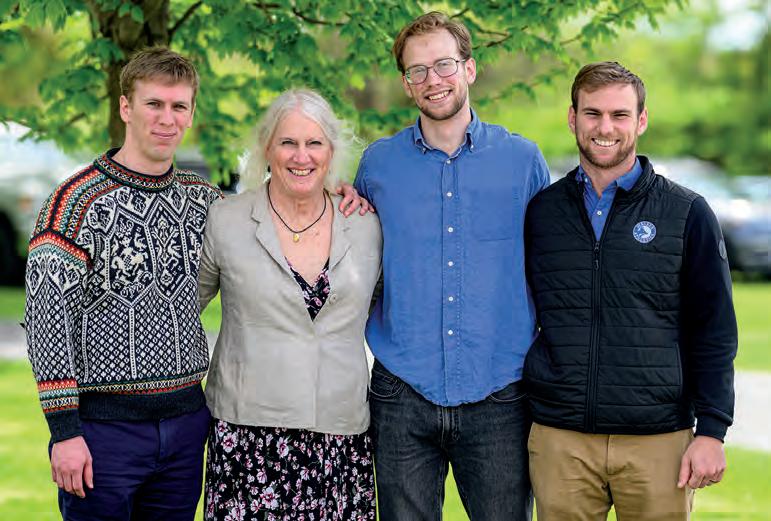
could tackle global issues and indulge my curiosity without waiting another year to become a college student. As a pre-law student now, I am indebted to the knowledge Tommy shared and taught to me and Aiden Reilly so long ago. I was able to take graduate classes in my undergraduate college about subaltern studies and voiceless communities/belonging using my background in modern Indian culture and history. Thank you, Tommy. You will be missed.
Lilias Kim ’19
• • •
TOMMY AND I taught together in the history department at Noble and Greenough in 1986-1987. He was a first year teacher/ intern and I was a grizzled 2nd year teacher. Newbies. We shared a strong interest in pedagogy and subject matter (probably more of the latter than the former) of the classroom, but our avocation and great love was (and still is) music. We pulled together a faculty/student band which frequently entertained the community with our take on classic rock from The Who (Tommy’s favorite), to the Beatles, The Police, Bruce Springsteen and many more. It was wonderfully meaningful to collaborate with a colleague both inside and outside the classroom. Groton was very fortunate to have a teacher of such integrity, intellect and dedication to young minds. Best of luck Tommy!!
Phil Goodnow
’77
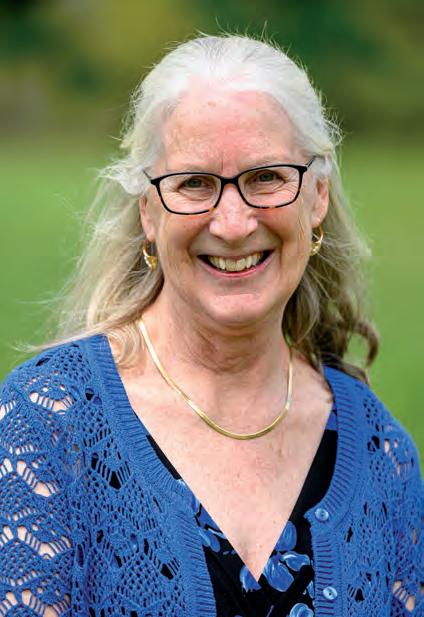
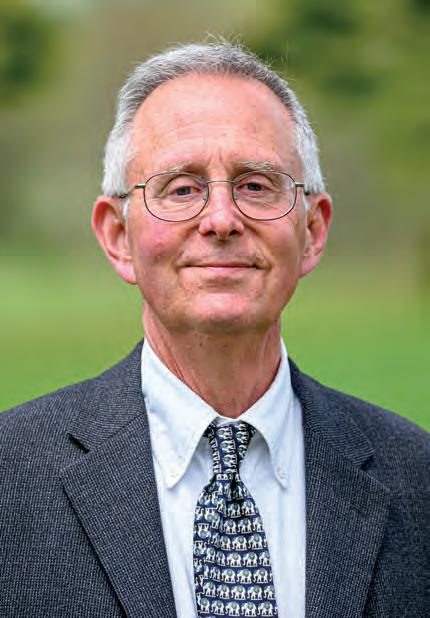
Science Department Head Stephen Belsky arrived at Groton in 1983 as a sabbatical replacement instructor in biology; he was on a break from his graduate work in plant physiology at Cornell but never returned. He held Groton’s Kendall W. Foster Chair in the Sciences. During his tenure at Groton, Mr. Belsky has taught chemistry and environmental science as well as biology.
Kate Dennison joined the Groton faculty as a Classics instructor in 1985. Following a sabbatical, she returned to campus as director of Academic Support, but within a few years had added teaching and coaching back into her schedule.
Q: You both came as sabbatical replacements. Did you have any intention of staying this long?
Kate Dennison: I just thought I’d come for the year and then things happened in my private life that allowed me to stay. And around the same time, Bill Polk asked me to stay. So it was serendipitous and very helpful.
Stephen Belsky: And I took this job to run away from graduate school, and that was a one-year appointment. And then there was another one-year appointment. And I even pretended—I went back to graduate school in the summer between the two—but I was done. I had no anticipation that it would last. Once we met each other, became a couple, and started a family, then it was our intention to make this long term.
Q: What’s it like dating here? It’s a small place.
KD: I lived in Eric Spierer’s dorm right after the Second Form girls and boys wing was built. The Second Form moved into that new wing and they had direct access viewing-wise to our apartment. And so we had some giggles. There were kids that I was close to, who said, “Oh, Miss Dennison, this is awesome.” There was some attention to it.
SB: Once it becomes old news, it’s just old.
The couple was engaged in fall 1988 and married in 1989. They eventually welcomed three children to their home on the Circle: David ’12, Molly ’12, and Jared ’15.
Q: How does having children go here change the way you look at this place or change the way you teach?
KD: I think we were lucky in that it changed how we looked at the school in
“ Despite rain or hail or sun, Ms. Dennison and Mr. Belsky were always there for me when I had performances on the Circle. Ms. Dennison was, is, and always will be the mama that made sure you were seen and heard.”
Lilias Kim ’19
a positive way because we put our trust in our colleagues. And it was beautiful. I mean, we very much respected the adults that were part of our kids’ lives and were pleased with the attention they were getting from our colleagues. And I think those years helped us trust this place. I mean, not that we didn’t before, but I think it was confirmation that this place was full of wonderful people.
SB: Well, by then we had also taught some of our colleagues’ kids.
KD: We’ve been on that other side and I think you pay attention.
SB: I like to think we pay attention to every kid, but I think having taught colleagues’ kids, having talked to colleagues about their children in our academic settings, we had paid a certain amount of attention to that and we felt that that attention was totally returned.
KD: We had to navigate the place differently in that I think we were pretty damn good at not talking about our colleagues in front of our kids and not talking to our colleagues about their kids or not talking to our colleagues about our own kid.
Following a sabbatical during which time she earned her master’s degree in social work from Boston University, Ms. Dennison made a career pivot in 1995 and took over what is now the Academic Skills Office.
KD: I was thinking I wanted a change. We had 1-year-old twins and so Bill
Polk called us near the end of our first sabbatical and asked whether I wanted to come back or not at all, or have an extra year’s leave of absence. I said, well, I prefer to come back but be part time if possible. And he called me back a few days later and said, well, we can’t work that out for you being part time in Classics, but what about this? They had not had anybody in that role before.
Q: And so this was something you had to create.
KD: It really started out just tutoring a few kids and having time management and study skills and academic support.
Q: It’s a lot more than tutoring now.
KD: Oh yeah. So over the years I would go to conferences. I learned a lot about how to read a neuropsych exam and how to help kids and how to talk to faculty. And then we got funds from the school, and it just grew. It’s been a big learning process.
Q: You’re both singers. Is that something you picked up here or is it something you always enjoyed?
SB: No, it’s something I picked up here. I married into a family of singers and, when the choir was going on a trip to South Africa, Kate—as a member of the choir and a chaperone—was going, so I was going to go. I was trying hard to go
as a chaperone, but I thought it would be a lot more fun to participate. And so I joined the choir for that whole year and just stayed.
I knew something about music and I knew something about being in an ensemble, but I knew nothing about singing. They don’t give you lessons.
KD: I love singing and I’ve sung in choral groups most of my life, starting in the youth choir in my dad’s church—my father’s a minister. So I love just doing it. And here I’ve loved doing it with kids.
We have some different relationships with some of the kids in the choir, especially the kids that I sing alto next to and that Stephen sings tenor next to. So that experience is nice. When I gave my chapel talk, I thought maybe, oh, I’ll do a solo or something after, and then I realized, why don’t I just have the choir sing because it’s been a big part of my life. We sang and it just kind of completed the beautiful feeling I had that morning. It has been important to me. Like I said, I grew up in the church. But it was wonderful when Stephen joined because then it was part of us as well. It just enhanced the love I have for the community.
Q: What would you say has changed the most over the past fortysomething years about this place, or about you?
KD: Well, we’ve grown up here. I mean, we were both in our twenties when we started. I hope we’ve changed and grown.
SB: I think it’s a kinder, gentler place than it used to be. I think, as an entire faculty, we paid more attention to ways that kids are growing up outside of the grade book and outside of the sports accomplishments. I don’t know if we will continue to struggle finding the right balance between embracing and encouraging resilience. I think that our heightened awareness of overall wellness and a phrase that I never even heard of, work-life balance, is more than it used to be. Whether the pendulum is swinging too far in one direction, I can’t know.
That certainly has changed. I mean we had—really right from the get go—good relationships with kids, good relationships with our cohort of equal-aged faculty. But also we were the young faculty, and then we were the faculty with young kids, and now we’re the old farts. I think that we have seen the school understand if you’re going to hang on to people for a long time, their lives are going to change. Their lives are going to be different, there will be different demands.
KD: The school has been very generous with us and paid attention to the different stages of life that we’ve gone through. Bill Polk didn’t have to create a new position for the young mother who wanted to be part-time a little longer. But he did.
The school is also much more diverse than it was, which is great and has added to the richness of the student body and faculty body.
In retirement, Mr. Belsky and Ms. Dennison have moved to Pittsburgh, where they’ll be closer to Jared and his family, and also
somewhat closer to Kate’s Midwestern roots. They’re looking forward to learning more about their new home, then maybe doing some traveling
Q: How would you like to be remembered?
KD: We paid attention and we showed up. I don’t know if that’s enough.
SB: It’s enough. We’ve taken the academic side of our jobs seriously. We’ve paid attention to that. And that involves self-study. That involves talking to colleagues. And that part, I think, is what we expected of ourselves. We are currently in a life stage where it’s easy to show up compared to having to meet a school bus. I think we have lots of examples, and Kate talked about how the school has acknowledged that people’s lives change. I think the flip side of that is we understand the array of duties that we have because the kids are here 24/7. They’re not someplace else. And so we have not sought to take a break unless we absolutely had to. That’s what we mean by we showed up.
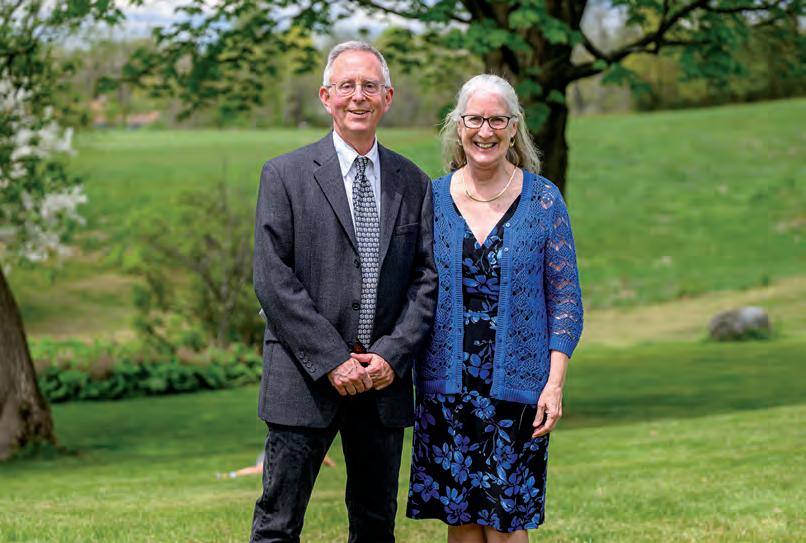
“ While I was far from home and family, Mr. Belsky and Ms. Dennison provided me with the support structure I needed to succeed at school.”
Dede Grenier Janich ‘07
THE MOMENTS of Mr. Belsky putting on his iconic sweater in the middle of our Third Form biology classes are unforgettable. He never failed to make us laugh even in the midst of stressfully identifying an mRNA or tRNA on a pop quiz.
Despite rain or hail or sun, Ms. Dennison and Mr. Belsky were always there for me when I had performances on the Circle. Ms. Dennison was, is, and always will be the mama that made sure you were seen and heard. If you needed advice, whether brutally honest or just a gentle encouragement, she provided it all.
Lilias Kim ’19
MR. BELSKY is not only one of the most wonderful teachers I’ve ever had, but one of the best human beings I’ve ever met. He made Groton feel like home for me and so many others, acting as a comforting father figure in the form of my faculty advisor, pushing me academically when I lost confidence, and coaching the most fun JV girls lacrosse team. He was a coveted Third Form dorm affiliate, as we’d all swarm
him during study hall to get help with bio homework. I was not a naturally gifted science student, but Mr. Belsky made learning exciting in the classroom and outside of it. To me, Groton is synonymous with Mr. Belsky and I know he will be missed by SO many people. Thank you for everything, I’m so lucky to know you!
Morgan Pagliocco ’14
• • •
THIRD FORM Biology with Mr. Belsky was one of my favorite classes at Groton. When someone would ask why we needed to know some obscure fact, like hairy ear pinnae being a Y-linked gene, Mr. Belsky would say, “Cocktail party conversation!”
Mr. Belsky would also tell us he was giving us an “audio visual aid” as he passed out a handout. “Where’s the audio?” we’d ask. “Me I’m the audio!” he’d reply. Daphne Onderdonk ’87 •
MR. BELSKY and Ms. Dennison were an integral part of my family’s Groton days. My sister and I had Mr. Belsky as an advisor, and my
brothers had Ms. Dennison. While I was far from home and family, Mr. Belsky and Ms. Dennison provided me with the support structure I needed to succeed at school. I remember one time in particular during Fourth Form fall midterms, and I was either stressed, tired, cold, or some combination of the three. Mr. Belsky walked past me in the old science wing and I proceeded to unload on him all of the things I had to do. He listened carefully and then dryly said, “I’m not worried about you,” and kept on walking. In the moment, I found it very funny and it also helped me to calm down. I realize now that it was an important moment that helped build my confidence in my capacity to handle tough situations in the years since. Congratulations on your well-earned retirement!
Dede Grenier Janich ’07
AS A Third Former, Mr. Belsky was my biology teacher, dorm affiliate, and JV girls lacrosse coach. My first memories of him must have been consumed by his giant leather shoes, thick spectacles, and ancient lacrosse stick. I remember instantly loving Mr. Belsky. Not because of Biology I barely got a C in that class but because I connected with his gentle, calm, and humorous way he approached us as students. As a teacher, which I have been for twelve years, I hope I am half as relatable, reasonable, and joyful to be around as Mr. Belsky is. I remember being full of nerves when I asked him to be my advisor for my remaining three years but in his classic, ever-cool, Mr. Belsky way, he agreed by saying something equal parts snarky
and pragmatic. As a dramatic teenage girl, this was exactly how to handle me, and I continue to be so grateful for all that Mr. Belsky did to help usher me through those somewhat tumultuous years.
Olivia Wheeler ’06
I HAD Mr. Belsky for Third Form Biology, a subject to which I was exceedingly unsuited. To his immense credit, he made science interesting. He was the first science teacher I ever had who had students sit in a circle and talk about what we had just read. We still worked hard I don’t think Mr. Belsky would have agreed to teach at a school where he couldn’t ask a lot from his students, he wasn’t wired that way. But his ability to teach science in a relaxed and comfortable seminar format was something I’d never seen before. His classroom manner was as gentle as one could get while still expecting the best.
Mr. Belsky was able to teach science in such a unique way because of his extraordinary gift for making jargon accessible. He broke down technical concepts into relatable everyday ideas. He showed even the most intransigent classicist that science wasn’t just memorization science was beautiful (most of the time, anyway). As an attorney, I try to find something interesting in every case I litigate, and I owe that attitude to the lessons I learned from Mr. Belsky fifteen years ago.
Winston Shi ’12
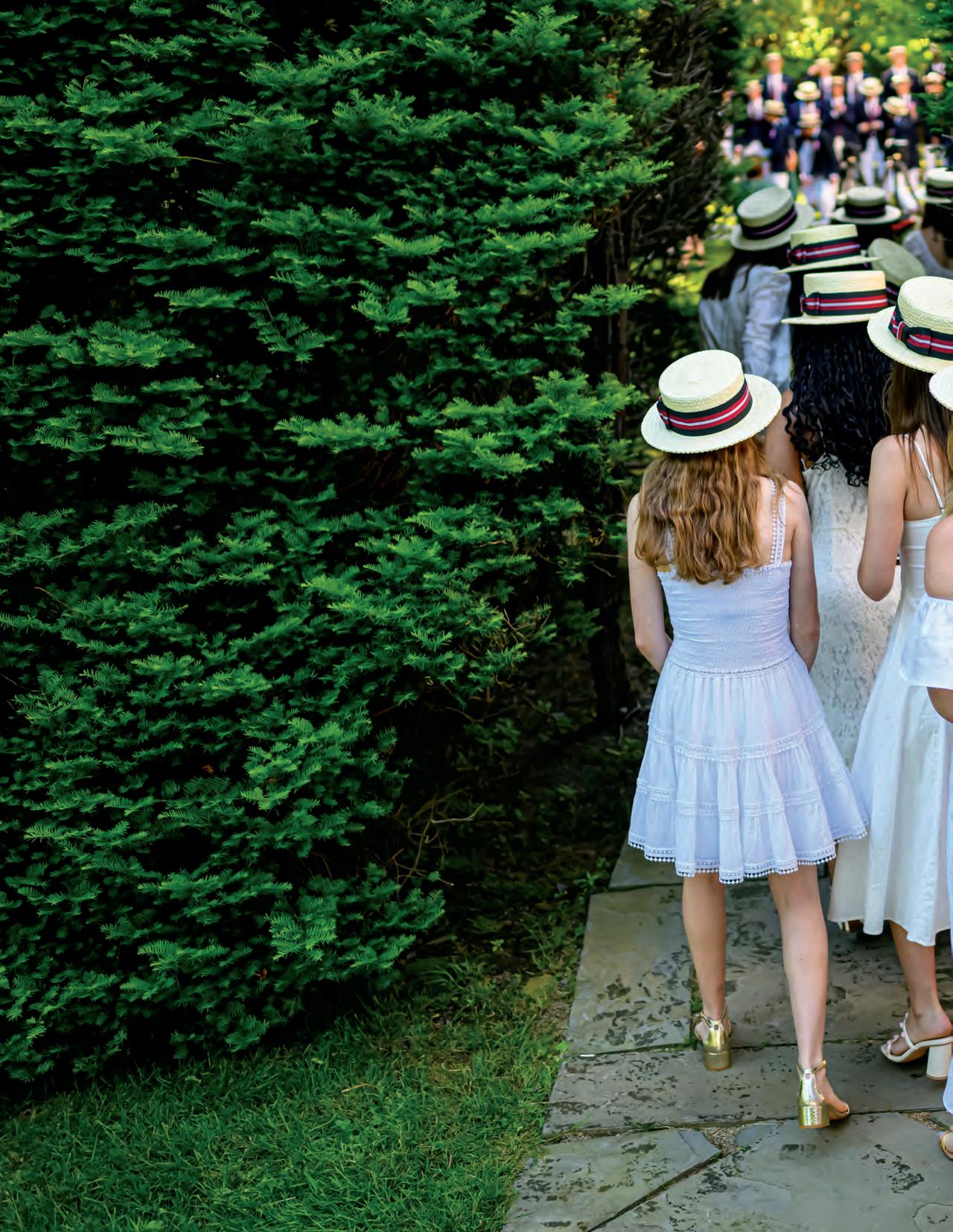
“Build something beautiful.” CNN host Van Jones, this year’s Prize Day keynote speaker, urged the “Witty Gritty” Form of 2024 to reconstruct our often divided society by embracing civility and humanity.
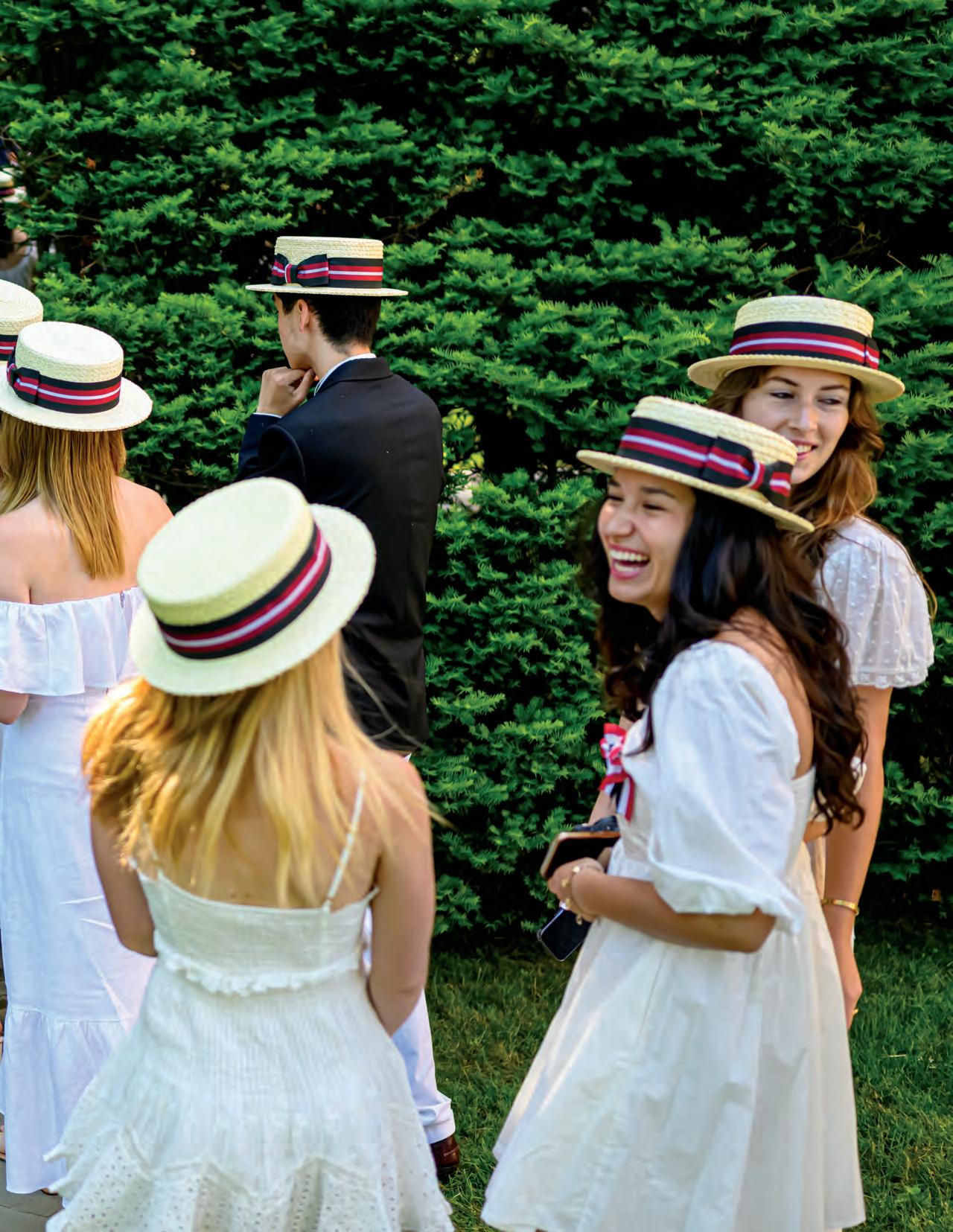
Under a picture-perfect spring sky, members of Groton School’s Form of 2024 were praised for their resilience and challenged to become civil, unifying leaders at the school’s 139th Prize Day on June 2.
Following a morning service in St. John’s Chapel, the community gathered for remarks from Board of Trustees President Ben Pyne ’77, P’12, ’15, Headmaster Temba Maqubela, student speaker Arjun Ray ’24, and the event’s keynote speaker, CNN host, bestselling author, attorney, and civil rights activist Van Jones.
Mr. Pyne greeted the form, its families, faculty, staff, and students with a welcome from the entire Board of Trustees. Reflecting on his own Prize Day forty-seven years ago, he called to mind the four aspects of this Groton experience he still carries: curiosity, values, self confidence, and friendship.
“Groton instilled in me a set of core values that I live by to this day: honesty and integrity, knowing right from wrong, respect, serving others, and the basics on how to behave in a community like this one, which is a preview for the much larger community you are about to enter beyond the Circle,” said Mr. Pyne. “Please don’t take this lightly, as you will find in life that the values you learned here will stand you in good stead, especially in tough times or in making difficult decisions.”
Mr. Maqubela hailed the “witty gritty” Form of 2024 for refusing to wallow in self pity during the COVID-19 pandemic that marred their first years at Groton.
“They refreshed and rekindled the school’s traditions that had gone by the wayside due to strict restrictions around social distancing,” he said. “Simply put, they awakened to their responsibilities. They saw challenges as opportunities and tackled them head on.”
Graduate Arjun Ray was elected by his fellow Sixth Formers to represent them as class speaker. He pressed his formmates to strip the word “elite” of its snobbishness and negative connotations of social superiority, and to think of it as standing only for the true best.
Mr. Jones began his remarks with a salute to the form’s parents, grandparents, and other caretakers before turning to the students and promising to skip the baby talk. He told the students they would be leaders in a new human civilization, one that utilizes artificial intelligence and robotics like never before. What they make of that new world depends on how they meet what he considered their generation’s biggest assignment.
Special guests included Groton’s sixth headmaster Bill Polk ’58, FTR’78–’03, former trustees president Gordon Gund ’57, P’86, ’89, GP’19, ’19, ’23, ’24, ’28, FTR’76–’89, and past and present members of the Board of Trustees.
In sending the graduates out into their new world, Mr. Maqubela implored them to seek positivity before invoking the Zulu phrase first used by Mr. Polk that now closes Prize Day.
“As we say in chemistry: Go and become nucleophiles,” he said. “The world needs you to do the greater good. Humanity needs you. Go in peace, nucleophiles. Go well!”
1 Carla Granizo
2 Kira Schiavone and Luke Scheible
3 Leo Quigley and Ethan Ramonetti
4 Daniel Jaime
5 Agathe Robert, Alisa Gulyansky, and Kritika Aryal
6 Keira Ley and Jeremy Gall
7 Daisy Adinkrah and Max Harrell
8 David Porter and Charles Rogers
9 Georgia Martin
10 Griffin Gura, Sean Greene, Chris Munroe, Luke Scheible, W ill Koukopoulos, and Amos Lawrence
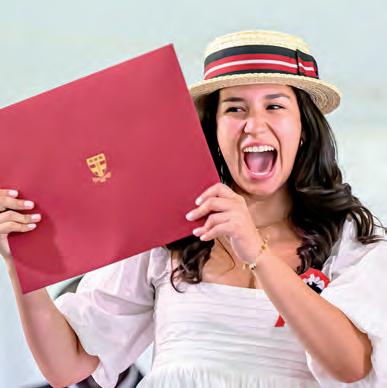
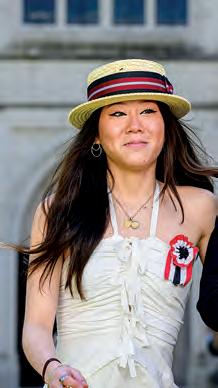
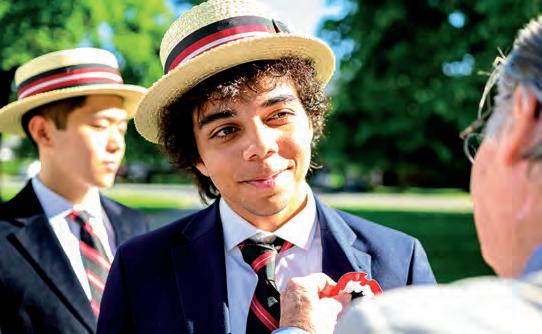

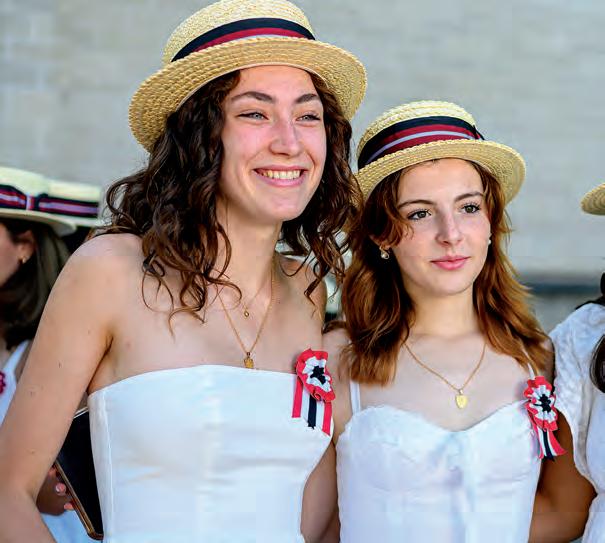
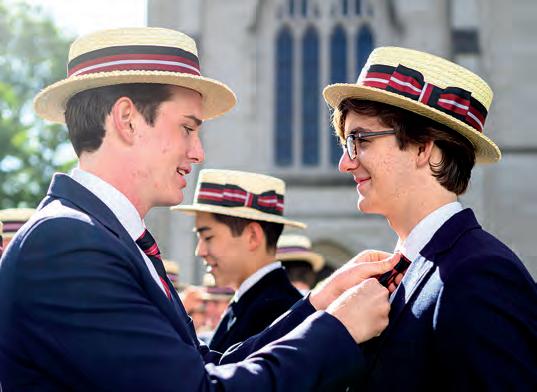

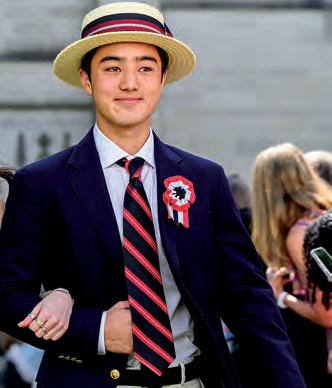

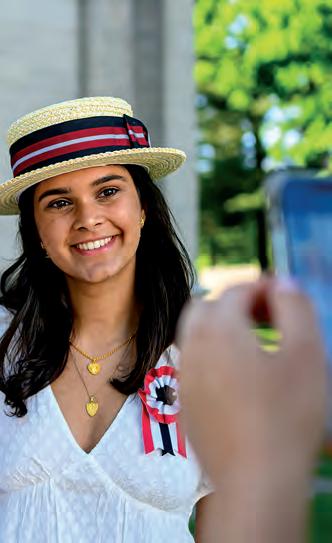

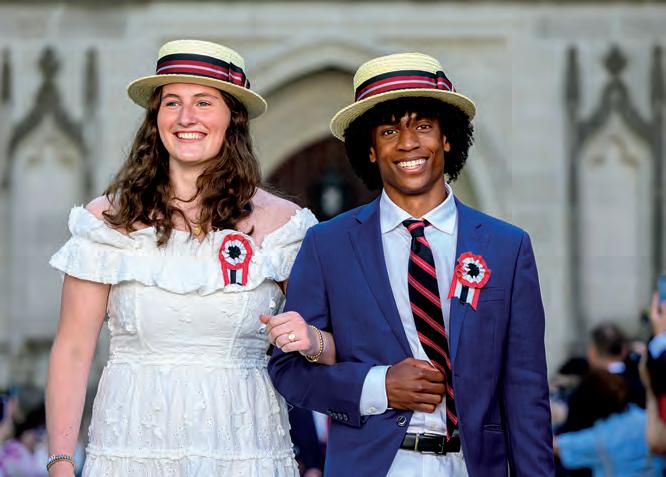
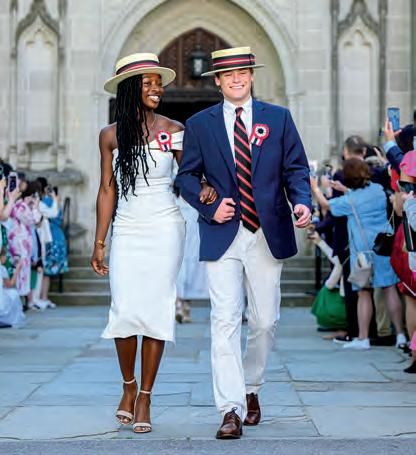
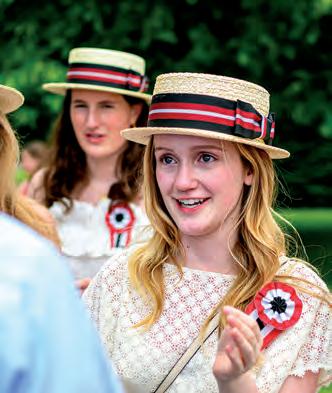
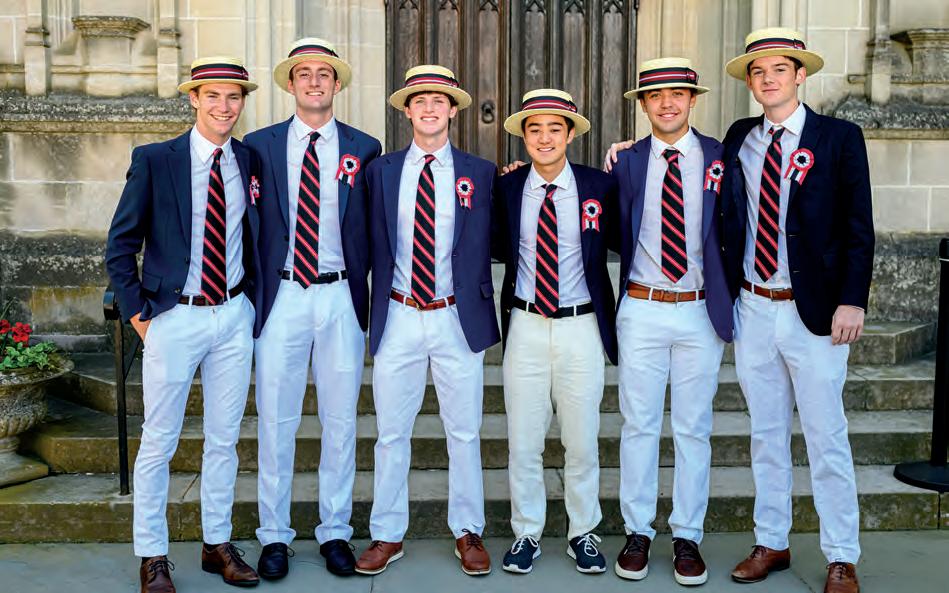
‘Choose to be a builder.’
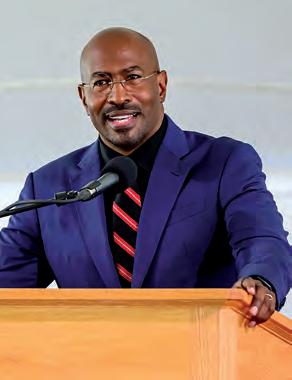
CNN host, bestselling author, attorney, and civil rights activist Van Jones delivered the following keynote address:
Iam all emotional. I don’t even know you all. I’m glad to be here. You all that got prizes, congratulations. I have three degrees. I never got any prize, so if you didn’t get a prize, you still might be up here someday. I want to start off by talking to the most important people here who are not you all. I want to talk to mama, and daddy, grandma, grandpa, and the guardians. These are smart kids, man. They know a lot of stuff, but they don’t know how hard this was for you.
They don’t remember the nights when there was a fever and you didn’t know if it was going to break. They
don’t remember the heartbreak you went through privately and had to shield them from. They don’t remember the scrapes and the scuffles and the parent-teacher conferences when you weren’t sure if they were going to make it, but you kept it together. They’re here because of their own effort, and their own genius, and their own destiny, and because of you. You done good. Thank you, mama. Thank you, dad. Thank you, guardians. Thank you. You done good. You done good.
Now, as for you, I’m not going to talk baby talk to you, especially after Arjun came up here and gave a speech that made me rewrite my speech. You guys are clearly a special generation, mainly because you’ve had some bad times, you’ve gone through some stuff. You came into a world upside down and on fire, and it’s not changing soon. I want to say, good. Good. Good. I’m glad you’ve had it tough. I’m glad you’ve had it tough because you’re going into a tough century and no pressure, no diamonds. No pressure, no diamonds. We need diamonds in this century. And so the challenges that you’ve faced? There are more to come. And we are betting on you to do better than my generation did in the face of these challenges.
But there is a danger that I don’t think people are talking with you about clearly enough.
We’re so impressed with you. We’re so stunned by you. We have to ask you for help with our devices, which is quite embarrassing as an adult. In some ways,
you’re so advanced that I think we don’t warn you that you have a danger of getting the assignment for your generation wrong. You have a big assignment, but there’s a danger that you’ll get it wrong.
I’m watching the young people now. You deconstruct everything so beautifully. You deconstruct racism. Bless you. You deconstruct sexism. Bless you. You deconstruct gender itself. You deconstruct the corporate pollution. All these things you deconstruct beautifully. But that is not your only assignment. The assignment isn’t just to deconstruct everything you see. It’s can you reconstruct something better? Can your generation reconstruct something better? That’s a challenge. And that’s not as easy as it looks, but it’s especially important that you recognize that that is your generational assignment because, as you leave here, you’re entering a global civilization on the birth edge of something new.
A new human civilization is going to be born on your watch. I’m going to say that again. If nobody told you this, a new human civilization is going to be born on your watch. How do I know that? I have two very small children. One is 2 years old, one is 4 months old. We have small diapers and very small diapers in my house. You guys remember that? You got to make sure you get the right one at night. What are their lives going to be like under your leadership? My daughter, who’s 2, her first crush is not likely to be a pop
star like your first crush or a dashing cartoon character like your first crush, or a TV star like your first crush. Her first crush is likely to be an AI
That’s the new human civilization. My little guy, under your leadership, by the time he’s 10 years old, he’s going to have a lot of buddies. Some of them will be human and a couple might be robots. And we’ll see them as toys. He will see them as his friends. That’s a new human civilization. By the time my daughter’s 30 years old, because of advances in biotech, when it’s time for her to give us grandchildren, she might open up a laptop or a holographic interface and design my grandchildren. That’s a new human civilization. Eighty years from now, 90 years from now, 100 years from now, when they’re buried, they may be buried on the moon or Mars. At 100 years, we will be a fully spacefaring civilization under your leadership. That’s a new human civilization. The question I put to you is simply this: In this new human civilization you’re going to be leaders of, will it be human and will it be civilized? Will it be human? And will it be civilized? And I’m not sure that you understand, as a generation, the importance of civility in preserving civilization. I’m afraid. Oh, you can clap for that. Because it’s so much more popular to cancel somebody. It’s so much more popular to attack somebody. It’s so much easier to go viral putting somebody down than lifting somebody up. And so, I’m afraid you may not get the assignment right. Yeah, you can be popular being a divider. You can be popular being somebody who insults somebody, but that’s not your assignment.
You are co-founders of a new human civilization. And the most important choice you have to make right now is not what you’re going to major in. Maybe you’ll be an engineer; maybe you’ll be a theater major. Maybe you’ll major in some stuff that doesn’t even exist yet. That’s not your most important choice. Your most important choice is: Am I going to be, in my profession, a uniter or a divider? That’s
your choice. And I’m going to tell you, it’s not easy trying to be a uniter in this culture. It is certainly not easy being a uniter in your generation, where it’s so much easier to get attention doing it the other way.
I’ll tell you a quick stor y about a tough decision I had to make to divide or to unite, and then I’ll let you get your degree.
Look, I’m not telling you something I don’t know about. I’m a very proud Democrat, as you may know. Certainly, your parents know. But my greatest accomplishment was working with the Republican president, and I got a lot of flak for doing it. But let me tell you the true story of how it happened, which I’ve really never told personally, publicly,
but I want you to understand how this stuff works. I’m a Democrat. When President Trump was elected, I was unhappy and said so publicly. And when he got into office, his son-in-law, Jared Kushner, was unhappy with my unhappiness.
So he took my boss out to dinner. It’s a true story. I was working at CNN He took my boss out, and he said, Here’s the deal. Mr. Jeff Zucker, you’re the boss of CNN. If you want access to the Trump White House, here’s what you got to do. You got to fire Ana Navarro, and you got to fire Van Jones because they’ve been too tough on President Trump, they’ve been too unfair to President Trump. And if you want to have access to this White
“ The assignment isn’t just to deconstruct everything you see. It’s can you reconstruct something better? Can your generation reconstruct something better?’
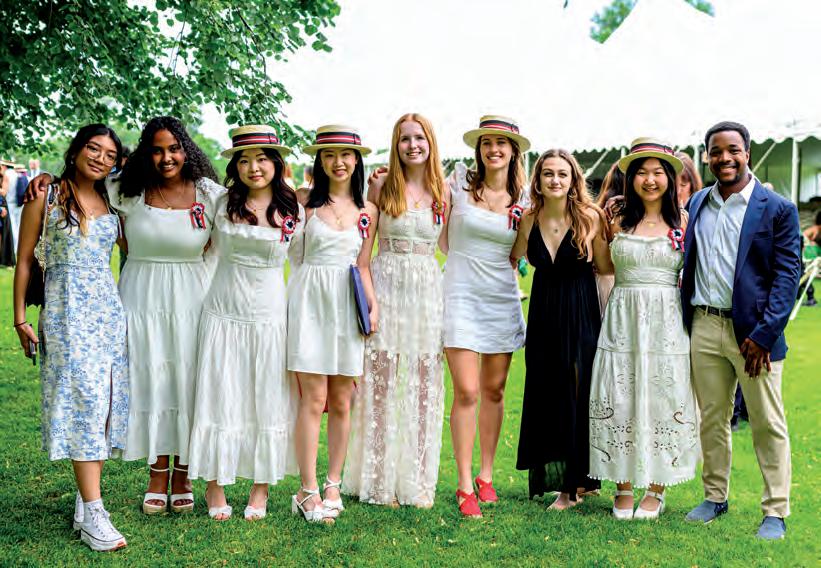
House, CNN, you got to fire Van Jones. I thought this was unfriendly.
So I went on TV that night, and I said, Jared Kushner is riding his tricycle around in the Oval Office and needs to get a real job. He thought that was unfriendly. So we didn’t start off friendly. But then he called me, and he said, “Van, I did some research on you, and I realized that you spent most of your career trying to help people in prison,” which is true.
“You spent most of your life trying to help people behind bars. I want you to know something. My father once went to prison. My father once went to federal prison, and I went to visit him every weekend. And I saw what he was going through, and I saw other people who didn’t have our resources and what they were going through. And I wished at that time, Van, that somebody at the White House level had cared enough about me and my family to do something about those prisons, to help my family, and to help those people. And there was nobody there.” He said, “But
now I’m in the White House, and I want to do something about it, and, Van, I need your help.”
And I said, Crap, this is terrible. Jared Kushner, who works for Donald Trump, is calling me to ask for my help, to help the Trump administration do literally anything. I’m going to get canceled. I’m going to get criticized. My friends are not going to understand what I’m doing. My hardcore Democratic friends are going to think I’m a traitor. You’re a traitor. How can you go and help that administration do something? And then I thought about it, and I said, Do I believe this stuff or don’t I? Do I believe what I say?
It’s easy to make an idealistic speech. It’s easy to write an idealistic essay, especially when you’re trying to get into college. But do you mean it? Do you mean it when there’s a cost, when there’s a consequence, when there’s a price to be paid, do you mean it? And I thought about the people that I’ve met behind bars over all these many years, and I never met a person behind bars who said to me, “Van, I’m
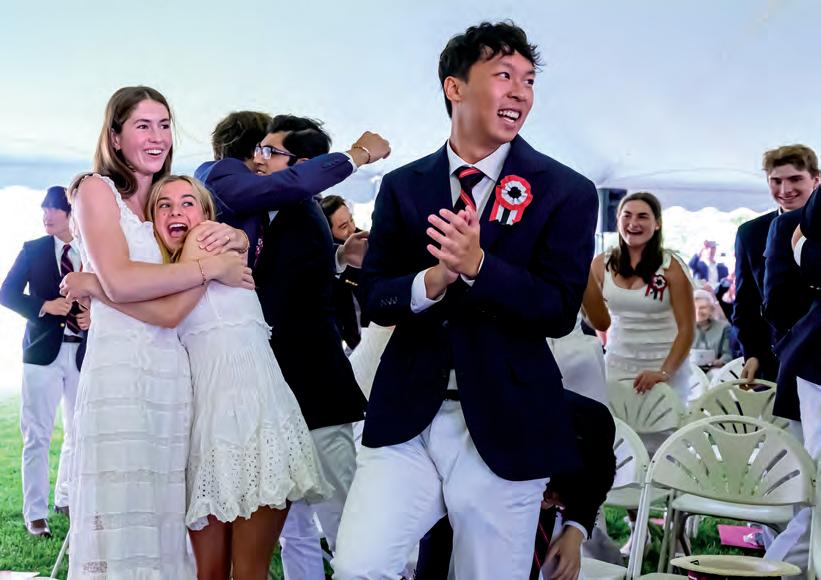
in prison. I’m hurting. I’m scared. I miss my children. I miss my parents. I miss my loved ones. I want to go home. Please help me. But whatever you do, don’t talk to any Republicans.” I never heard that. They didn’t care about who was in the White House. They wanted to go home to mama’s house. They needed help. So I told Jared, I said, “Jared, I’m going to tell you. I’m going to quote my good friend Jay-Z. With you, I got 99 problems, but prisons ain’t one. I will work with you.”
And I caught hell. I caught hell. But we passed a bill called the First Step Act that the New York Times—not Fox News, the New York Times—called the most significant breakthrough in criminal justice in a generation. That bill got 30,000 people home from federal prison. And by the way, ordinarily, by now, 70 percent of those people will be back in prison. By now, ordinarily, 70 percent of those people would be back in trouble. We didn’t have a 70 percent return-to-prison rate. We didn’t have a 60 percent return-to-prison rate. We didn’t have a 50 percent return-toprison rate. We didn’t have a 40 percent return-to-prison rate. We didn’t have a 30 percent return-to-prison rate. We didn’t have a 20 percent return-toprison rate. We had a 15 percent return-to-prison rate. Half of those were technical violations, 8 percent return-to-prison rate—the most successful prison reform in the history of prisons—signed by Donald Trump. And he handed me the pen in the Oval Office.
That’s what civility gets you. That’s what taking risks for unity gets you. The dividers win in the short term. The uniters win in the long term. The destroyers win in the short term. The builders win in the long term. The haters and the harmers win in the short term, but the lovers and the healers win in the long term. So choose to be a healer. Choose to be a uniter, even when it’s not popular. Choose to be a builder. And as you construct this new human civilization, stay human, stay civilized, and build something beautiful. Thank you very much.
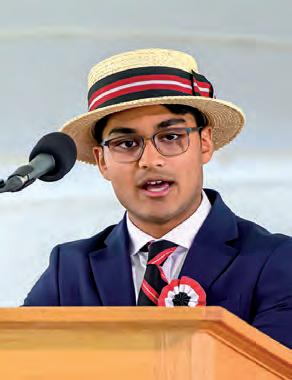
Members of the Form of 2024 chose Arjun Ray ’24 to deliver the student Prize Day speech.
Hello all and good morning. Welcome to our headmaster, trustees, distinguished guests, faculty, students, and families and friends. We are Groton School’s 139th graduating form, and I cannot convey a greater privilege than to speak on behalf of my classmates today.
The Form of 2024 is, in many ways, a phoenix rising from the ashes of the past. The majority of us entered Groton several years ago amid a broader world that had slipped into the throes of tumult with a ferocity that left us stranded in confusion and uncertainty. For the most part, the
“You have distinguished yourselves in your capacity to be a force of good both here and beyond, Form of 2024, and being among your ranks has been a privilege for me.
world still has a great deal of recovery on the road ahead—a recovery that fate has entrusted us—you and me— with undertaking. That we are all gathered here today is nothing short of a testament to stories of unyielding resilience, and a refusal to fall victim to worse and weaker impulses. I’d like to first thank the student body and my fellow members of the Form of 2024 who, as I’ll get into, have welcomed me into a community of strength like no other. Second, we all owe a debt of gratitude to every single member of the faculty and staff, who have created and nurtured an ecosystem for us to grow. Third, particularly as I look out at all of you, to the parents and families who have sacrificed and supported us to provide the opportunity of a lifetime.
If you’ll indulge me for just a bit, I’d like to do a few things: First, to probe and gather what we can from the annals of the past, second to press pause and admire the present, and finally to look to the future.
To start with, the past: Whether two, three, four, or five years ago, we stepped onto the Circle with lofty expectations for ourselves and for Groton. In almost all cases, reality
exceeded them. Speaking for myself, I can say that my perception of boarding schools back then was shaped by pure fable. As I discovered when I first took the train up to Boston, Penn Station is a far cry from Platform 9 3/4 and, rather than being offered a trolley of sweets on the Hogwarts Express, someone threw up on the Amtrak seat next to me. It also turns out that people here don’t dress like they do in Dead Poet’s Society.
Anyways, it would be simple to stand here and recount tales of our struggles but, I am mindful of the words of a former Prize Day guest speaker, who cautioned the audience: You will discover a certain perverse anger in yourself if any of your successors dare to say that they had a worse time than you. There is no joy comparable to that of remembered martyrdom.
Simply put, he’s saying that we have a tendency to become so consumed by our own hardships that we cannot fathom the possibility that past and future generations have and will face ones of equal or greater magnitude. He’s right. As a Sixth Former, I can tell you that when a Lower Schooler complains about the difficulties of school,
“The things that I have seen you do when you come together are astounding, and they have motivated me to continue having faith that greater things await down the road for us ”
there is a certain validation that comes from nonchalantly chuckling and giving a “Back in my day …” spiel that laments how life was so much more difficult for us back then, even though deep inside we know it was not.
Still, we gather here together as it slowly dawns upon us that we’ve finally completed the path that few elect to trod. But we’ve done it in so many different ways, and we’re now headed in so many different directions. As I look back, I have to ask—what is it that binds us together now? Now that we will no longer be bound by a common locality, what is the common link that remains between us?
A few weeks ago, while munching on peanut butter and jelly during 10–12, it hit me: I should probably stop wasting time asking myself nonsense philosophical questions and finish the neglected physics project on my desk. Thankfully, the answer found its way to me anyways sometime later as I was reading a speech delivered by journalist John Mason Brown to the Form of 1958:
We in a democracy shrink from such a term as “the elite.” If, however, we denude the word of its ugly overtones of snobbishness, if we cleanse it of its … perversions, and if we remove from it its odious suggestions of social superiority and think of it only as standing for the best, the true best … there is every reason why we should be proud of the word and no reason why we should be embarrassed by it. We
cannot afford to remain ashamed of the best. Mr. Brown’s sentiment can be summed up in one word: privilege Admittedly today, that word has become bogged down in the abyss of culture wars and politics, diminishing much of its value. When we hear privilege today, we conjure an image of the person who looks down at their peers from a pedestal built with bricks of arrogance and condescension. This is the elite that exists for the sole purpose of leaving a legacy as such. But Brown speaks of a different kind of privilege—one that rejects tyranny and embraces egalitarianism. Rather than the person atop the pedestal, he speaks of the woman or man who stands on the ground at eye level with their peers and who has the gift of empathy and an understanding of how to positively impact them. These thoughtful few are the rarest “elite,” but they are the ones that the world is in dire need of right at this moment. It is from places like Groton that I am most confident they will emerge.
Turning to the present, I can say with confidence that I am not quite there yet. Seeing as we are all on the cusp of adulthood, I’m certain that very few, if any of us at all, are. We probably won’t be for years. But we’re not far off. For most of my three years, I was unsure exactly what I was striving towards. We were all fueled by some ambition and a seemingly
infinite reserve of energy, but to what end? A flurry of material and nominal achievements—maybe a flawless quiz or an essay well done—provided a mild satisfaction that only lasted until we inevitably became disillusioned with it. Along the way, I sometimes fell short of the person that I sought to be—my actions did not always reflect the friend, student, son, and brother that I wanted them to.
But that’s where you all, the Groton community, stepped in. Here, in this final, emotion-filled hour, as we turn the page and look ahead, you are, in every sense of the word as I define it, elite. But not in a way that any ranking or other metric can capture. The things that I have seen you do when you come together are astounding, and they have motivated me to continue having faith that greater things await down the road for us. Whether you were singing out your hearts at Open Mic, devouring generational amounts of cup-noodles and taquitos at 1:00 a.m., or putting up professional performances in games of cornhole, the Circle never failed to leave me in a state of awe. As Mr. Brown said, we cannot be ashamed of the best, and thinking of you all right now, I am anything but.
We served as role models for one another, sources of daily inspiration that kept us going whether we realized it or not. You have distinguished yourselves in your capacity to be a force of good both here and beyond, Form of 2024, and being among your ranks has been a privilege for me.
But finally, in just minutes and hours from now, we together will cross the line from past and present into the future. As we do so, I would like to build on Mr. Brown’s thesis. We are greeted by the unpleasant reality that we enter a world in which the optimism we’ve fostered and grown accustomed to here is foreign. Instead of the
power of what we can achieve together, there is a greater focus on individuals fighting over scraps, trying to bolster themselves with little regard for others. The good-natured way we strive to support each other on the Circle is replaced by a moral ennui—where the definitions of justice and injustice, right and wrong, are unclear.
There won’t be a Sean Greene to smile and wave at me starting tomorrow. There won’t be a David Porter to
joke with, a Kritika to laugh and giggle with, an Allen to school me in physics, or an Amelia to have bipartisan debates with.
The harsh reality is that, starting tomorrow, the burden falls on us to carry forward what we’ve started here, no matter how far apart we are. There’s an ethos unique to this place that we need to grab onto before it is either lost in the wind or someone snatches it away. For the past few years,
we’ve awoken every morning and been greeted by the rich murmur of a hymn from an organ and the sun beaming on us through stained-glass windows. It’s our turn to play the music where it can’t be heard and serve as the beacon of light where it is dim for the compassion that we hold dear in our hearts.
To my classmates and Groton, it has been the honor of a lifetime to be with you. Thank you all.

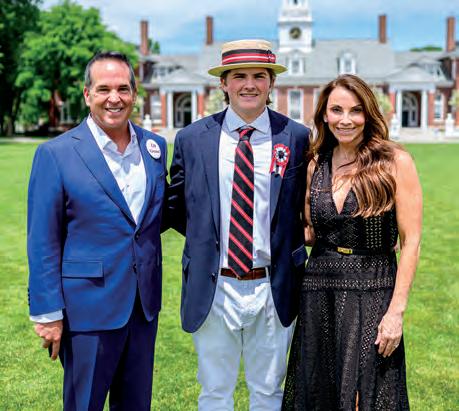
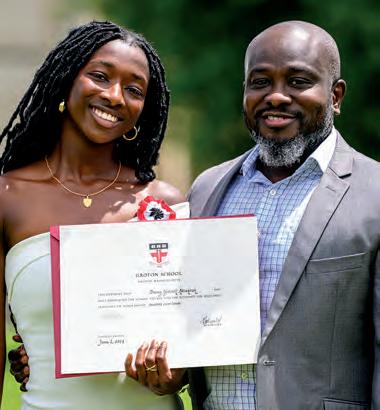
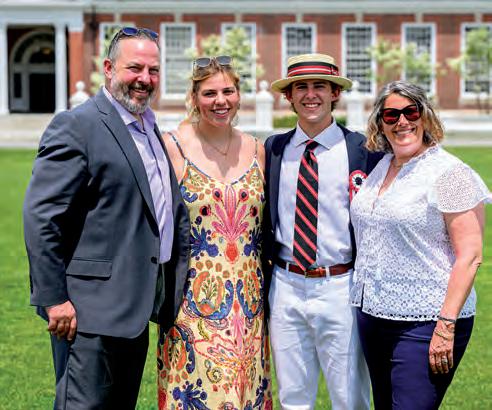
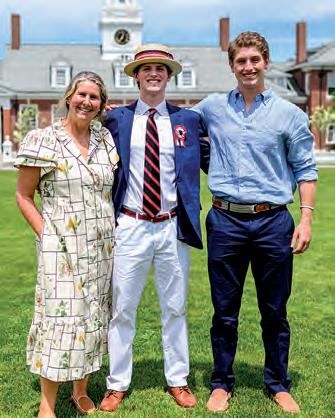
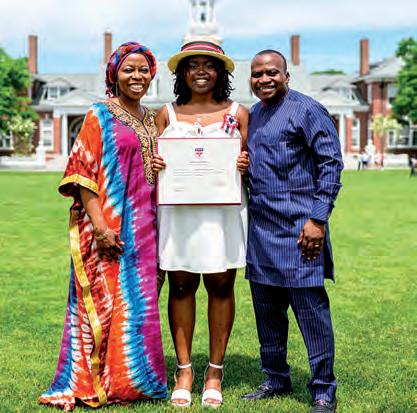
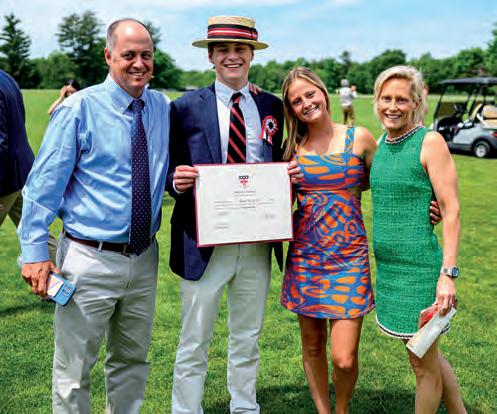

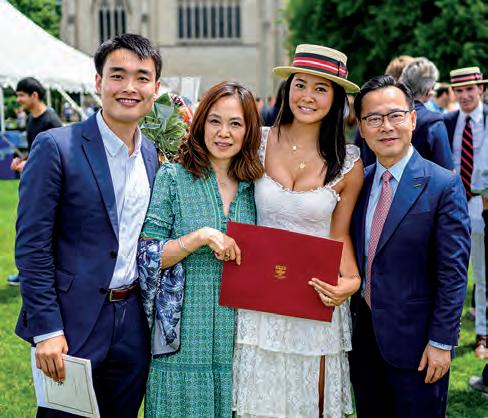
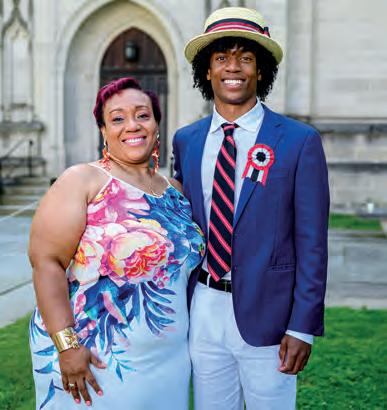
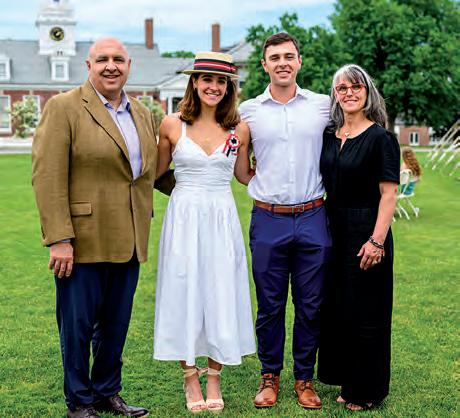
The Charles Lanier Appleton Prize
Awarded to members of the Sixth Form who have greatly served the school
Jeremy Isaiah Lenzel Gall
Keira Hadley Ley
The Asma Gull Hasan 1993 CirC le VoiC e Journalism Prize
Acknowledges outstanding leadership in creating, editing, and producing the school’s newspaper
Eric Jiakai Ge
Alisa Gulyanski
The Tronic Award
Given in honor of Michael G. Tronic and awarded to a member of the Sixth Form who has made especially good use of the resources of the library and has shown strong interest in the life of the mind
Tsion S. Brook
Jasmine Paige Powell
The Bishop Julius Atwood Literature and History Prize
Created by the late Right Reverend Julius Atwood for the best scholar in the combined fields of history and literature
Sheena Oluwatoyin Bakare
The Butler Prize for Excellence in English
Alisa Gulyanski
Jasmine Paige Powell
The Perry History Prize
Given by Mrs. Eliza Endicott Perry to the best scholar in the field of history
Andres Palacios Ruiz Massieu
The George Livingston Nichols Prize
Awarded for the best essay on a historical subject
Isabella Lewis Gardiner
The Rogers V. Scudder Classics Prize
Given in memory of Rogers Scudder, a distinguished teacher of Classics and a much loved member of this community
Junguen “Jessica” Lee
The Franklin D. Roosevelt Debating Prize
Given in memory of Franklin D. Roosevelt 1900 by W. Averell Harriman 1909
Alisa Gulyanski
Arjun Ray
The Endicott Peabody
Memorial Prize
Given in memory of the Reverend Endicott Peabody by the Sixth Form of 1945 for excellence in the field of religion and ethics
Husayn Mohamed Ladha
Jasmine Paige Powell
The Isaac Jackson Memorial Prize
Awarded to the best mathematics scholar in the Upper School
Christian James Armaly
The New England Science Teacher’s Award
Allen Fang
Eric Jiakai Ge
The Bertrand B. Hopkins Environmental Sciences Prize
Given by the Form of 1948
Charles Evans Rogers
The Thorpe Science Prize
Created by Mrs. Warren Thorpe for the member of the Sixth Form who has been the most successful in developing an appreciation of the spirit and meaning of science
Christian James Armaly
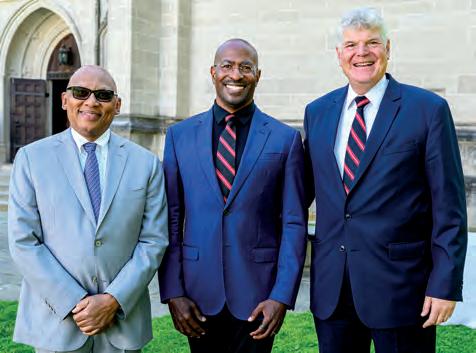
The World Languages and Culture Prize
Ava Jane Bridges
Chloé Marine Farel
Veronika Tereza Hadamovsky
The Hudson Music Prize
Given by the friends of William Clarke Hudson of the Form of 1956 to recognize effort and progress in music during the school year
Brittany Phoenix Deng
The Choir Cup
Awarded to the Sixth Form chorister who has exhibited musical growth in sight reading and vocal technique
Afrika Zahara Gaye Ebunoluwa Jane Lawore
The Photography Prize
William Chen
The Reverend Frederic R. Kellogg Upper School Art Prize
Given in his memory in recognition of distinguished work in art
Qingyang Paopao Zhang
Zimo Liu
The Dennis Crowley Drama Prize
Given by Todd C. Bartels ’01 to a member of the Sixth Form who has made the greatest contribution to the theater program
Timothy Alden Hebard
Ebunoluwa Jane Lawore
The Reginald Fincke Jr. Medal
Given by the Sixth Form of 1928 in memory of First Lt. Reginald Fincke Jr. and awarded to a member of the Sixth Form who has shown in athletics his qualities of perseverance, courage, and unselfish sportsmanship
Sean Francis Greene
The Cornelia Amory Frothingham Athletic Prize
Given by her parents and awarded to a girl in the Sixth Form who has demonstrated all-round athletic ability and has shown exemplary qualities of leadership and sportsmanship
Keira Hadley Ley
The Elizabeth and Margery Peabody Award
Given to a member of the Sixth Form, other than a school prefect, whose contributions to the community demonstrate sensitivity, strength of character, leadership, and integrity
Amelia Flint Barnum
The William V. Larkin Award
Given to the Groton student who best exemplifies uncommon courage and perseverance in meeting a challenge or overcoming adversity
Amelia Flint Barnum
The Carroll and John King Hodges Prize
Given in memory of Carroll Hodges, Form of 1905, and John King Hodges, Form of 1910, to a Sixth Former who has distinguished him- or herself in a capacity to be designated by the headmaster
Christian James Armaly
The Upper School Shop Prize
Colby Coventry Gund
Benjamin Greene Milner
Hawkes Prize
Zimo Liu
Paopao Zhang
The following awards were presented on the Saturday evening before Prize Day:
The Gadsden Prize
Given in memory of Jeremiah Gadsden of the Form of 1968 by his classmates and friends to a member of the Fifth Form who has demonstrated inspirational leadership, encouraging social and interracial understanding in the Groton community
Asante Kiio
The O’Brien Prize
Given by the Hoopes family to a member of the Lower School who has shown qualities of integrity, loyalty, enthusiasm, and concern for others
George Payson Taggart
The Monte J. and Anne H. Wallace Scholar
Given to a student who has completed the Fourth Form in recognition of scholastic excellence, as well as those qualities of character and commitment so important to the Groton community
Sarah Sooyuen Ku
The Laura J. Coolidge ’85 Poetry Prize
Given in her memory by her husband, Peter Touche, to a member of the Upper School who has shown a love for the power of poetic expression and a sustained interest in writing and reading poetry
Madison Vivian St. Clair
The Lower School Creative Writing Prize
Lena Marie Aloise
The Heard Poetry Prize
Sagata Das
The G ROTONIAN Creative Writing Prize
Given by the Grotonian Board of 1946 to a member of the Upper School for the best example of prose fiction written in the past year
Olivia Yubai Deng
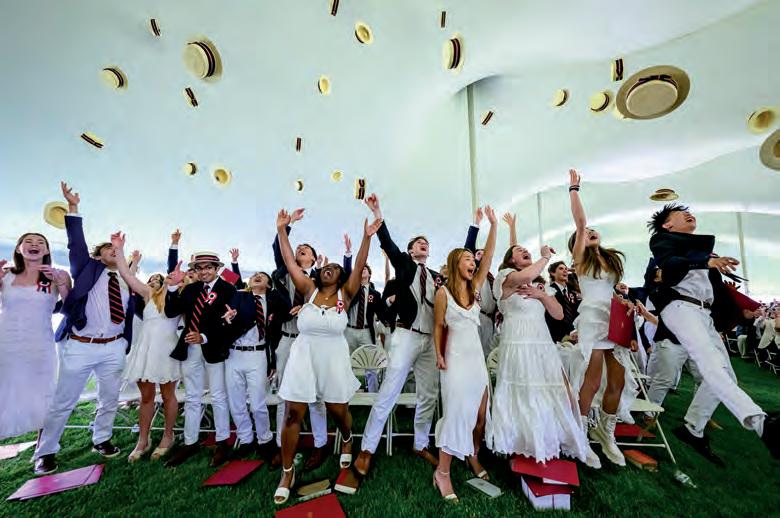
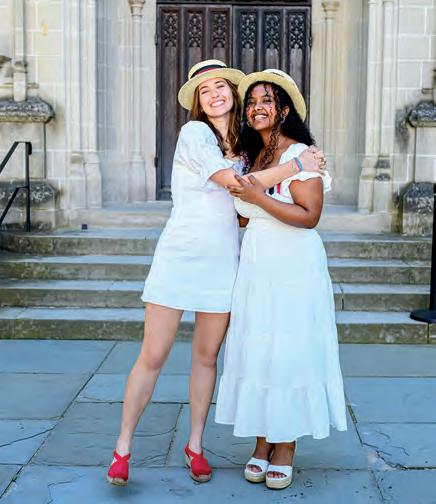
The John Jay Pierrepont Prize
Given to the best mathematics scholar in the Lower School
Philip Holland
The Roscoe C. Thomas Mathematics Prize
Given by the Form of 1923 and awarded to a member of the Fifth Form for excellence in mathematics
Alicia Ye
The Fels Science Prize
Given in honor of Stephen B. Fels, Form of ’58, awarded to a member of the Lower School who has demonstrated exceptional enthusiasm for and proficiency in the experimental aspects of scientific inquiry
Alexandra Seounne “Sasha” Kwon
The Rensselaer Medal
Awarded to a Fifth Form student who has distinguished him- or herself in mathematics and science
Hannah Lousie Gally
University of Rochester
Honorary Science Award
Given in honor of Stephen B. Fels, Form of ’58, to a member of the Lower School who has demonstrated exceptional enthusiasm for and proficiency in the experimental aspects of scientific inquiry
Caiyu Yang
The Richard K. Irons Public Speaking Prize
Established in 1972 by McGeorge Bundy ’36 and Arthur T. Hadley ’42 in honor of their teacher Richard K. (Doc) Irons, presented to the student who most logically and effectively presents his or her ideas during the R.K. Irons Speaking Contest, held at Groton each spring
Alejandro Khaled Hassan
The Lower School Studio Art Prize
Kristin Zihan Qin
Rowan Emelia Trevino
The Anita Andres Rogerson Dance Prize
Audrey Zhang
The Harvard Book Prizes Awarded to two members of the Fifth Form who exemplify excellence in scholarship and high character combined with achievement in other fields
The first Harvard Book Prize, given by Harry Eldridge 1920 in memory of his brother Francis H. Eldridge 1924
Sara Agrawal
The second Harvard Book Prize, given by Mark A. Medlinsky ’76 in memory of his father
William Klick
The Jefferson Book Award
Given to a member of the Fifth Form the faculty considers to best represent the Jeffersonian ideals of scholarship, leadership, and citizenship
Ella Farahnakian
The Dartmouth Book Award
Given to a member of the Fifth Form who is of strong character, has made a positive impact on the life of the school community, and has excelled in at least one non-academic area
Asante Kiio
The University of Chicago Book Prize
Given to a member of the Fifth Form the faculty considers most dedicated in deep intellectual inquiry in a range of academic disciplines
Lindy Zhang
The Frederick Greeley Crocker Memorial Award
Given to a Groton graduate whose record in their first three years since graduating from Groton has done honor to themself and their school
Andres Klema
The Potter Athletic Award
Christian James Armaly
Elinore Claire Smith
The Lower School Shop Prize
Alek Kenneth Chase
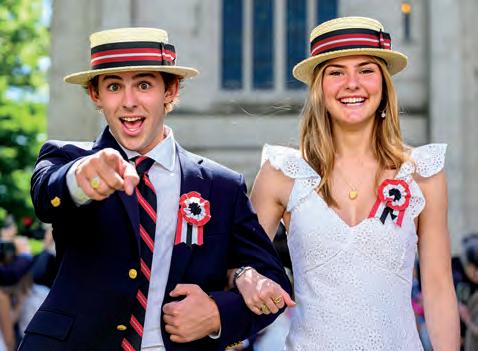
Daisy Yeboah Adinkrah summa cum laude
Christian James Armaly summa cum laude
Kritika Aryal cum laude
Sheena Oluwatoyin Bakare magna cum laude
Amelia Flint Barnum summa cum laude
Inga Pavlova Bartsch summa cum laude
Kogouniwa Emmanuel Sapana Bennsion magna cum laude
Ava Jane Bridges magna cum laude
Joy Cao summa cum laude
Ryder Declan Cavanaugh summa cum laude
Tiankai Chen
Giulia Gray Colarusso cum laude
Gavin Colby Cronin
Cameron Thomas Cunningham summa cum laude
Brittany Phoenix Deng summa cum laude
Charles Dillon Dubois cum laude
Oliver Michael El Hadj magna cum laude
Emelie Anna Elisabeth Engström magna cum laude
Allen Fang summa cum laude
Chloé Marine Farel summa cum laude
Morgan Ashley Fillion cum laude
Devin McNeil Fitzgerald
Jeremy Isaiah Lenzel Gall cum laude
Luisa Garciarramos Petricioli magna cum laude
Isabella Lewis Gardiner magna cum laude
Afrika Zahara Gaye cum laude
Eric Jiakai Ge summa cum laude
Carla Gabriela Granizo magna cum laude
Sean Francis Greene cum laude
Alisa Gulyansky summa cum laude
Colby Coventry Gund magna cum laude
Alicia Sophie Guo summa cum laude
Griffin Parker Gura magna cum laude
Veronika Tereza Hadamovsky magna cum laude
Jiwoo Han cum laude
Michaela Denise Hanson cum laude
Michael Polk Harrell Jr. summa cum laude
Timothy Alden Hebard cum laude
Daniel Alejandro Jaime magna cum laude
Grace Ann Strauss Janusz magna cum laude
Lauren Dineen Jerrett cum laude
Nathaniel Loane Johnson magna cum laude
Brendan Patrick Keegan II magna cum laude
Evan Khym magna cum laude
Katharine Southworth Knuppel magna cum laude
William George Hume Koukopoulos magna cum laude
Miriam Klara Kovriga magna cum laude
Husayn Mohamed Ladha summa cum laude
Jonathan Andrew Lai summa cum laude
Fung Lam summa cum laude
Ebunoluwa Jane Lawore cum laude
Amos Waters Lawrence summa cum laude
Jungeun “Jessica” Lee summa cum laude
Keira Hadley Ley summa cum laude
April Yuxin Li summa cum laude
Zimo Liu summa cum laude
Michael Q Lu summa cum laude
Alexander Ma cum laude
Ma Lin summa cum laude
Aryan Mago summa cum laude
Georgia Eleanor Martin magna cum laude
Bridget Mae McAvoy summa cum laude
Benjamin Greene Milner magna cum laude
Tyra Alyse Montan
Christopher Karl Munroe summa cum laude
Forrest Dillingham Nelson cum laude
Andres Palacios Ruiz Massieu summa cum laude
David, MacDonald, Porter Jr. magna cum laude
Jasmine Paige Powell summa cum laude
Leonard Thomas Quigley summa cum laude
Ethan Ramonetti cum laude
Arjun Amrit Ray summa cum laude
Agathe Jeanne Yvonne Robert summa cum laude
College
University of Chicago
Tufts University
Harvard University
Columbia University
Stanford University
Dartmouth College
University of Michigan - Ann Arbor
Boston College
Brown University
Duke University
Middlebury College
Southern Methodist University
University of Pennsylvania
Vanderbilt University
Williams College
The University of Alabama
Auburn University
Bates College
Brandeis University
Carnegie Mellon University
Case Western Reserve University
Cornell University
Emory University
Ferris State University
Charles Evans Rogers summa cum laude
Madison Vivian St. Clair summa cum laude
Nicolas A. Salazar magna cum laude
Luke Smith Scheible
magna cum laude
Kira Paige Schiavone cum laude
Sydney Marie Senerchia cum laude
Leonardo Baptista Serodio magna cum laude
Tsion S. Brook cum laude
Elinore Claire Smith summa cum laude
Julia Melitta Spada cum laude
Eleanor Grace Taggart summa cum laude
Zachary Fielding Webber cum laude
Arianna Werkun summa cum laude
Duncan Sturgis Wijnberg summa cum laude
Qingyang Zhang summa cum laude
Zhihan Zhang summa cum laude
Georgetown University
Hamilton College
Haverford College
Kenyon College
Macalester College
Massachusetts Institute of Technology
McGill University (Canada)
New York University
Northwestern University
Oberlin College
Occidental College
Pace University
Pomona College
Princeton University
Quinnipiac University
Rensselaer Polytechnic Institute
Rochester Institute of Technology
Rutgers University - New Brunswick University of Massachusetts - Amherst
University of Massachusetts - Boston
University of Massachusetts - Lowell
University of Southern California
Washington and Lee University
Yale University
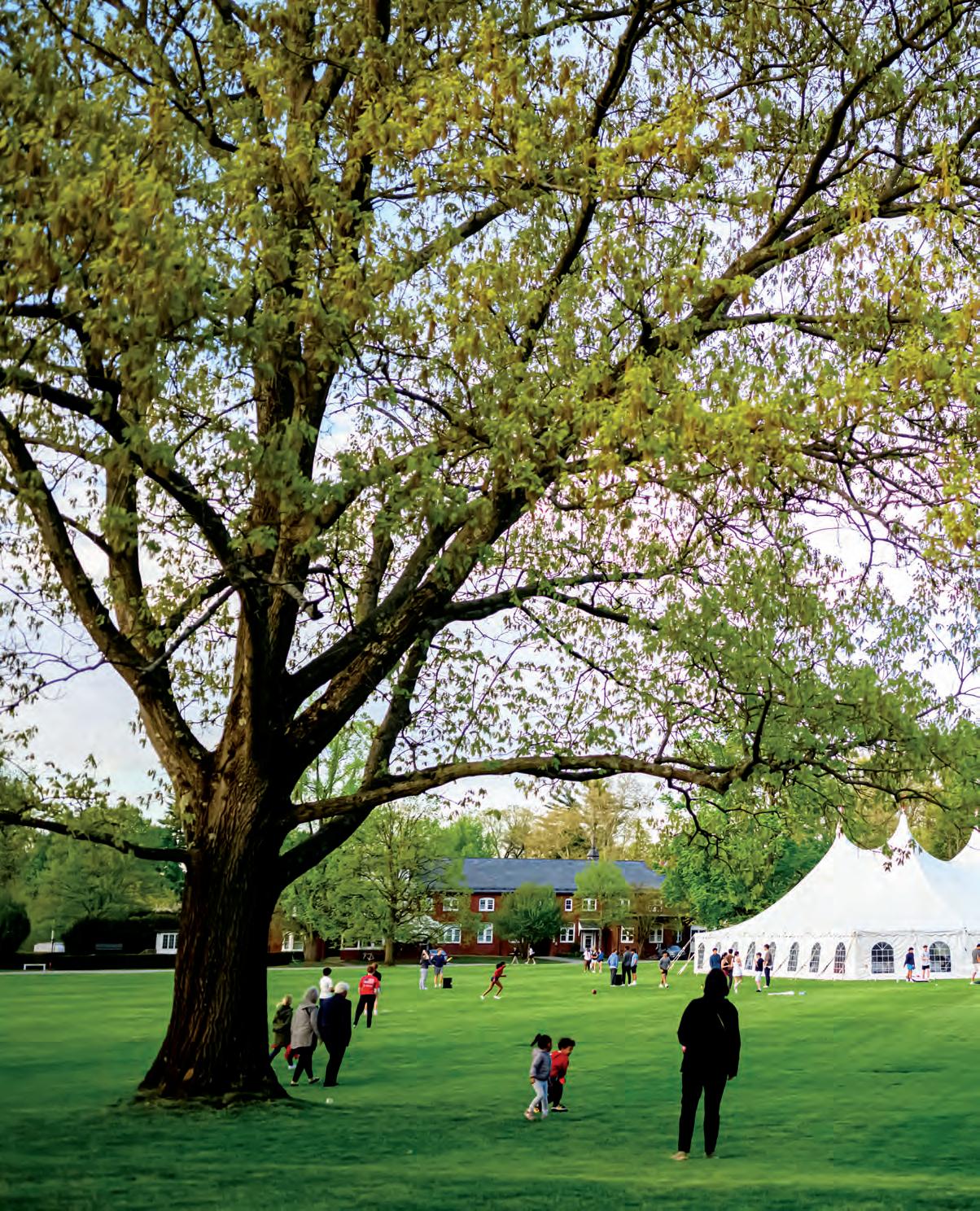
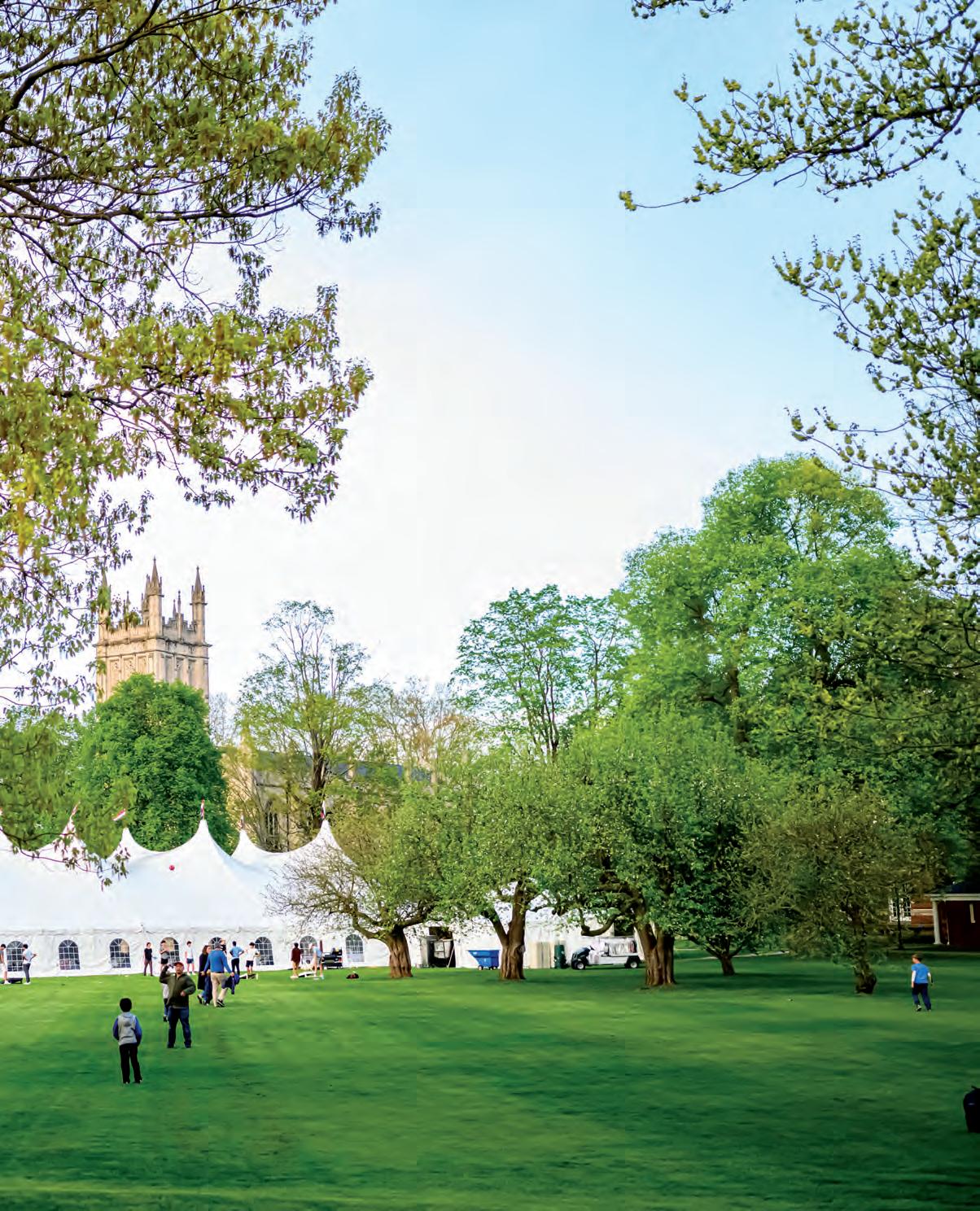
REUNION WEEKEND drew more than 400 Groton alumni and their families back to the Circle May 10 –12 for three days of camaraderie and community.
This year’s Reunion Weekend celebrated alumni from form years ending in four and nine, with the oldest representing the Form of 1949 and the youngest the Form of 2019. With their families, more than 600 people attended the event.
Weekend highlights included tours, receptions, dinners, presentations from Board of Trustees President Benjamin Pyne ’77, P’12, ’15 and the Admissions Office, open classrooms, musical performances, an alumni artist gallery talk, and a special alumni Groton Women’s Network event.
Alumni rowers took to the Nashua River, and the annual Triangle Run was won by 1999 formmates Ryan Kam and Arthur Kinsolving
The first new Athletic Hall of Fame class since 2022 was inducted, with Amy Cunningham Atkinson ’79 (field hockey, squash, and tennis), Karen Carpenter Gray ’84 (basketball, field hockey, and lacrosse), Henry F. Hoffstot ’09 (squash and crew), John Lyons (former Charles C. Alexander Endowed Varsity Football Coach), William P. Pennoyer ’84 (basketball, lacrosse, and soccer), and the 1978 Women’s Lacrosse Team taking their spots in the hall.
Headmaster Temba Maqubela delivered his state-of-the-school address, and alumni awards were given to Chi-Poe Hsia ’99 (Cui Servire Est Regnare Award) and Robin West ’64 (Distinguished Grotonian Award).
Following chapel services on Sunday, alumni, faculty, and staff gathered at the Sunset Farm Barn to close out the weekend by honoring retiring faculty members Stephen Belsky, Kate Dennison, Tommy Lamont, John Lyons, and Paula Marks.

1 Bridget Cornell ’19 and Sophie Conroy ’19 with oars in hand heading for the
2 Members of the Form of 2019 gather at the Headmaster’s House for Parlor with Mr. and Mrs. Maqubela.
3 Liv Ding ’26 performs during the Annual Ned Gammons Memorial Concert
4 Students Grenier Family photo opportunity: Evens ‘09, Joy, Carolyn ‘13, Beau ’74, Dede ’07, and John ’04
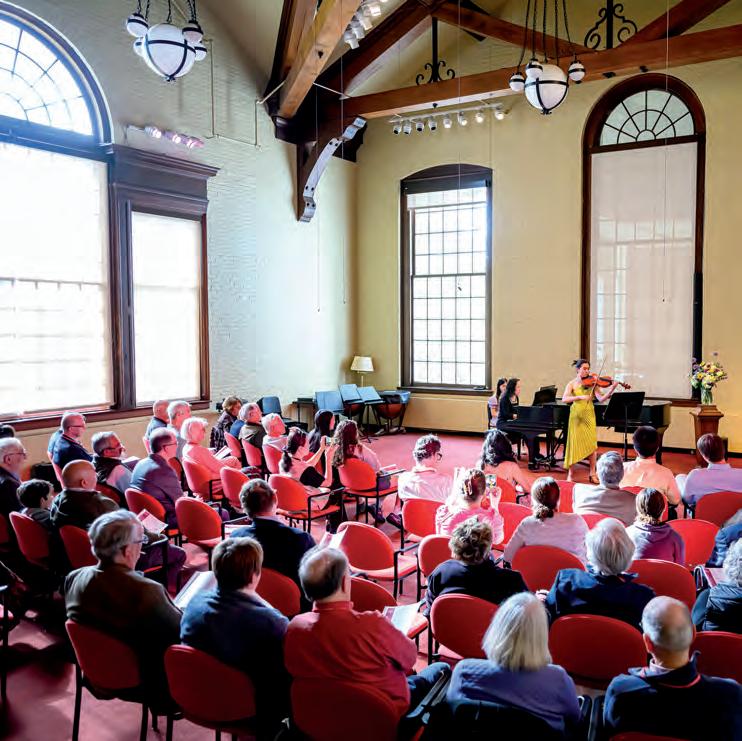

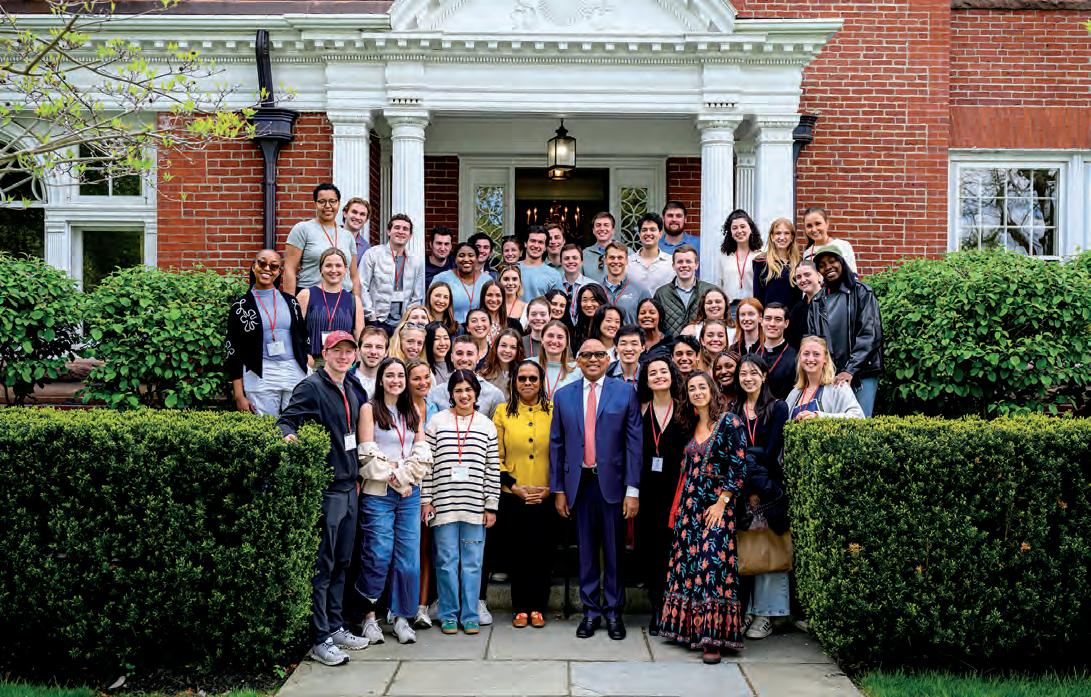

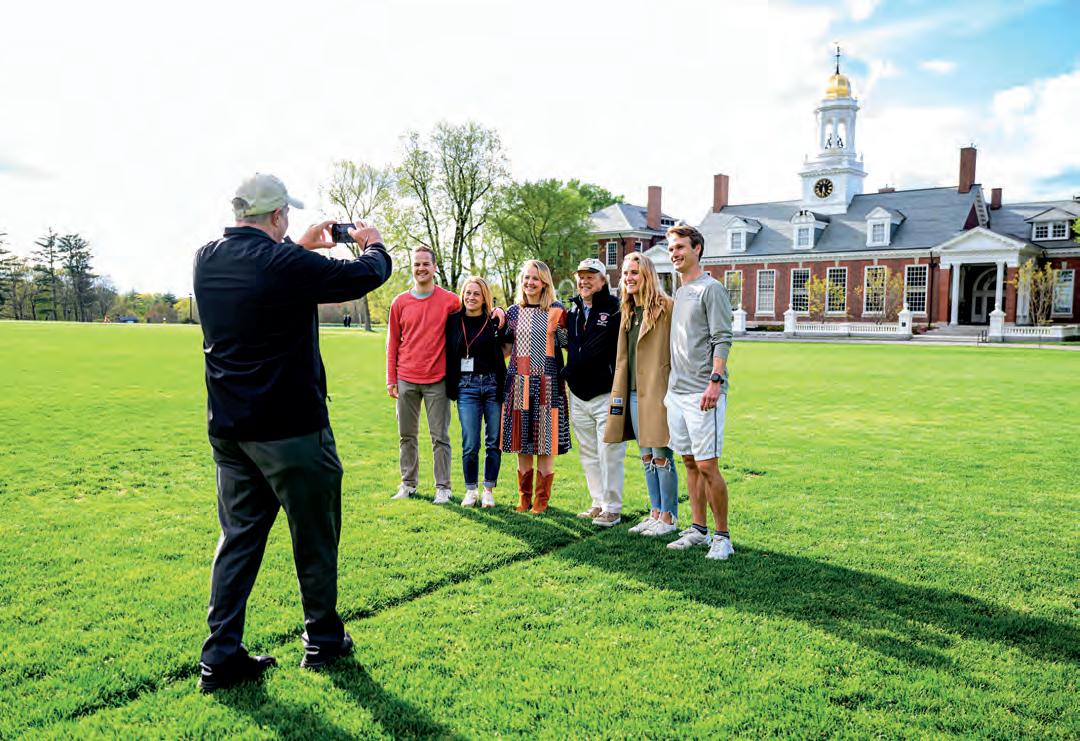
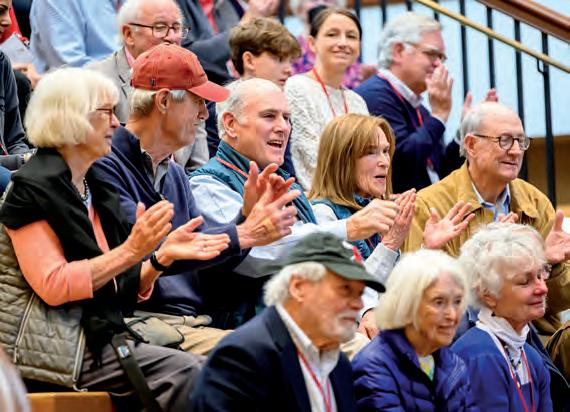
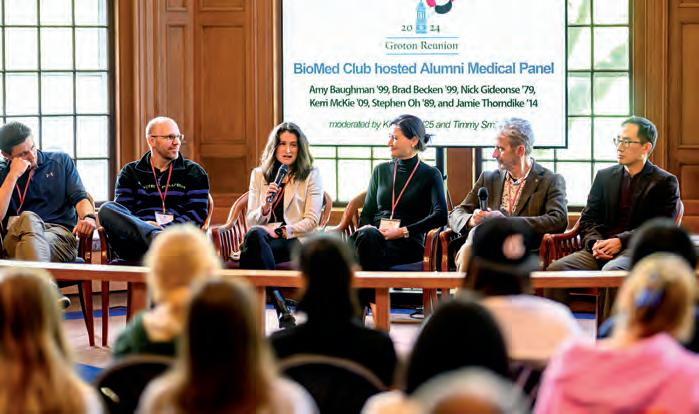
1 Reunion crown applauds the Headmaster’s Address
2 Jamie Thorndike ’14, Brad Becken ’99, Kerri McKie ’09, Amy Baughman ’99, Nick Gideonse ’79, and Stephen 0h ’92 speak on Friday afternoon’s BioMed Alumni Panel hosted by Kiran Sen ’25 and Tim Smith ’25
3 John Pyne ’64 embraces formmate Tim Eberhardt ‘64
4 Lucy Gund ’19, Ishana Sen Das ’19, and Karla Marie Stanford ’19 pose with Vuyelwa Maqubela
5 Iva Shah ’99 and family on the Circle
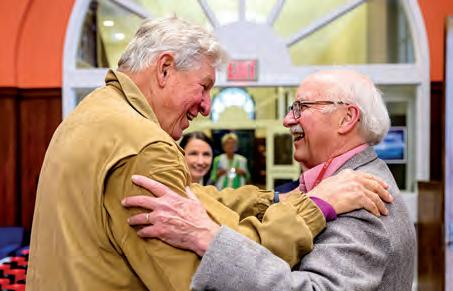
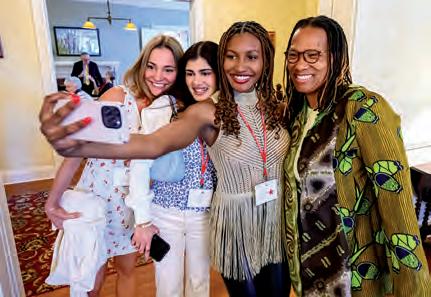
1 Lee Liebolt ’59 and Madeline Wilkins at the Gammons Memorial Recital
6 Max Carter ‘04, John Grenier ‘04, Martin McWilliams ‘04, Dan Perkins ‘04, John Tulp, and Chester Hall ‘04 catch up
2 A 1999 clan catching up: Aaron Snyder, Raksmey and Herman Gaskins, Amy Baughman, and Alston Ramsay
7 Marianne Lu, Clement Banwell, Karla Marie Stanford, Gloria Hui, Montanna Riggs, Dagla Rodriguez, Brandon Slawaska, and Chris Sznip all members of the Form of 2019.
8 Naa-Sakle Akuete ’04 catches up with LuAnn Polk
3 1989s Zack Gund, Roland Reynolds, Peter Everett, Jeff Kim, Jed Webber, Gar Ragland, Lucas Hatch, Hylton Jolliffe
4 Lowell Laporte ‘49
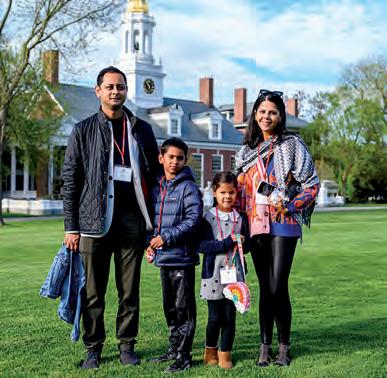
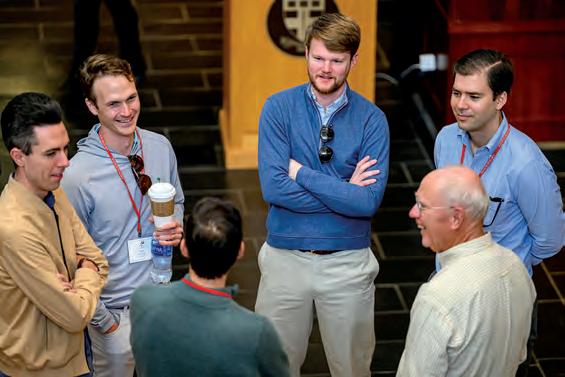
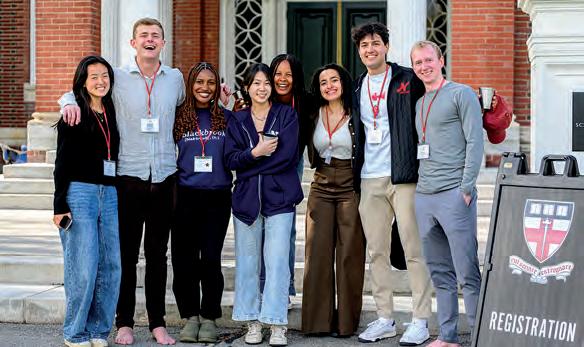
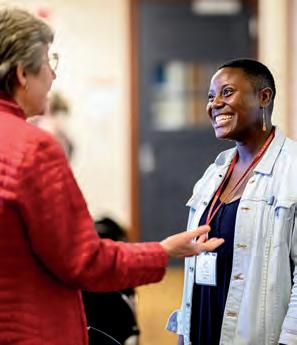
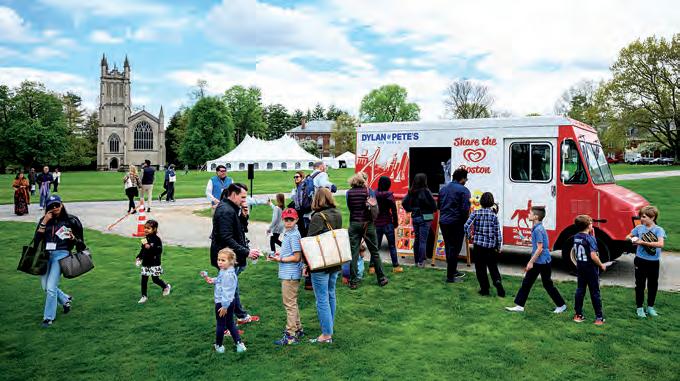
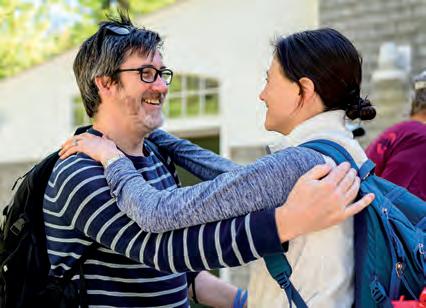
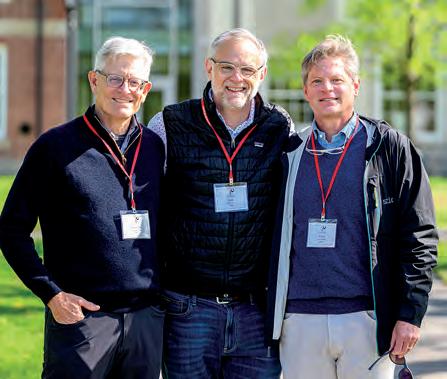
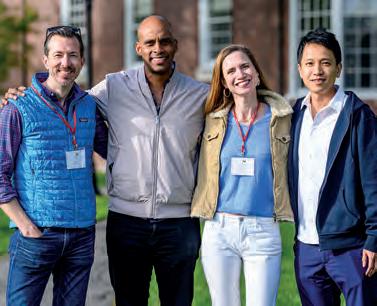
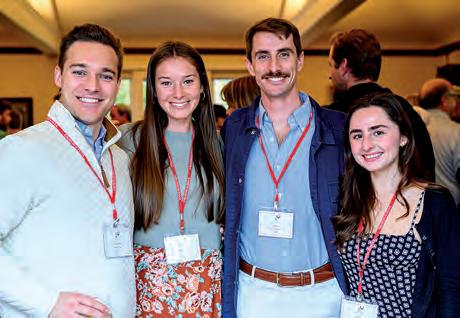

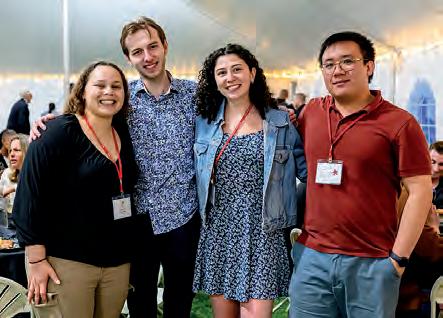
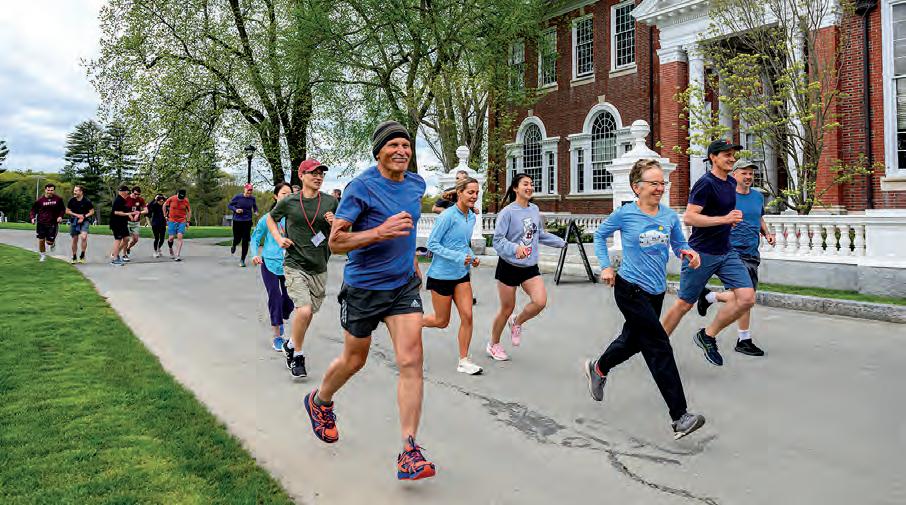
9 Groton Families enjoy ice cream on the Circle
10 Christian Luthi ‘84, John Linn ‘84, and Chris Oldham ‘84
11 Matthew Trowbridge ’99 and Amy Baughman ’99 embrace
12 Jared Craft, Allen Feliz ‘99, Kristen Craft ’99, and Eddie Chin ‘99
13 LuAnn Polk, Bill Polk ’58, and Ziad Haider ‘99
14 Andrew Popp ’14, Brianna Popp, Dan McDonald ’14, and Sofi Llanso ‘14
15Autumn Johnson ’19, Ra’ad Zeid ‘19, Nikkie Pollis ’19, and Brian Xiao ‘19
16 Circle Run start …
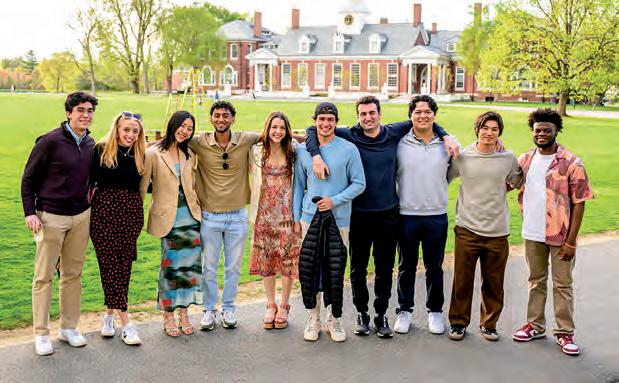
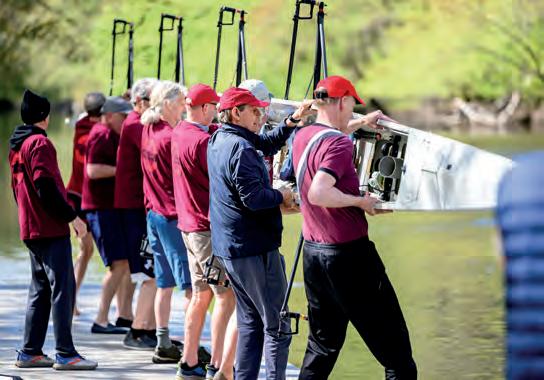
1 Gabriel Scholl, Julia Kendall, Shirley Li, Dawit Ghebremedhin, Sara Glawe, Will Torriani, Noah Kader, Joey Schiavone, Becker Han, and Ademola Ogunsanya heading to the Form of 2019 dinner at Sunset Farm Barn
2 Form of 1954 getting their shell in the water
3 Current students help Harriet and Charlie Day ‘54 check in for reunion
4 Jacob Kissell ’19 playing frisbee on the Circle
5 Barry Armour ’64, Margaret O’Hanlon, Marilu and Peter Sherer ‘64
6 Jaime Earl ‘94, Ricky Rojas ‘94 chat with fellow reunion guests
7 Members of the Form of 1979 enjoy the sun on Saturday afternoon, pictured: Sarah Coe, Ruth Kennedy Sudduth, Sarah Sewall, Suzy Keating, Volker Brandt, Tom Bator, and spouse Tom Conroy
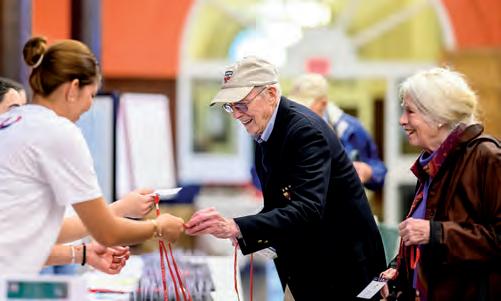
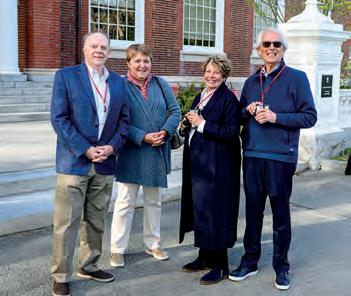
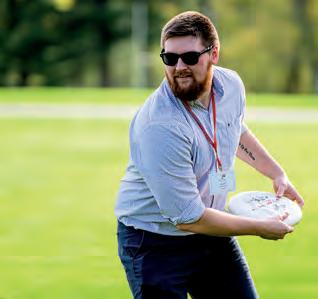
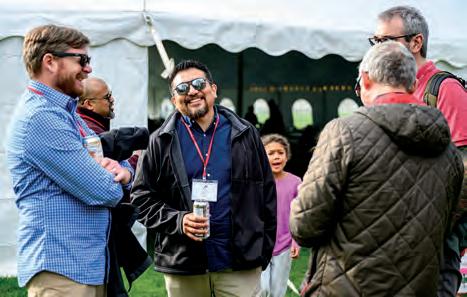

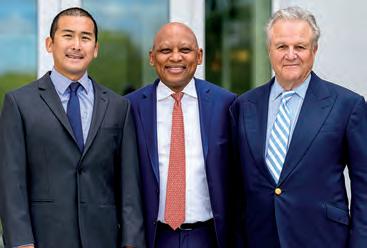
Chi-Poe Hsia ’99 received the Cui Servire Est Regnare Award named for the school’s motto, which celebrates a long-engrained ethos of service for his work as a senior U.S. diplomat and humanitarian.
Each year at Reunion, the school presents its two highest alumni honors the Cui Servire Est Regnare Award and the Distinguished Grotonian Award. At left, this year’s honorees, Chi-Poe Hsia ‘99 and Robin West ‘64, posed with Headmaster Temba Maqubela.
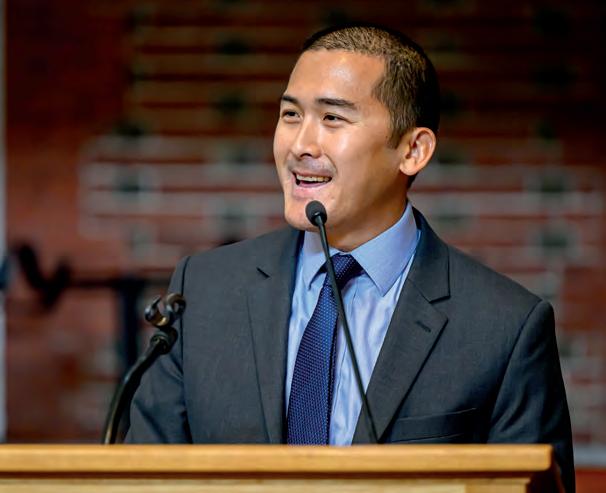
Chi-Poe accepted the Cui Servire Est Regnare Award with these words:
Thank you Temba, and thanks to the entire Groton community for this unexpected honor. First, I think I need to apologize to Temba for what was probably a very disjointed phone call when I learned that my name had been put forward for this recognition. I was very confused about why the Groton School headmaster would be calling me—surely nothing I did twenty-five years ago was catching up to me now?
Second, I need to thank my wife Carolyn, who is in Senegal with our two children, Lando and Ripley. Without
her partnership and her willingness to solo parent from time to time these past several years, I could not have bounced around helping USAID (the United States Agency for International Development) respond to cyclones, droughts, ebola outbreaks, and, unfortunately, more and more conflicts. It was through these experiences that I developed the knowledge and expertise to lead USAID Disaster Assistance Response Teams, or DARTs, in complex emergencies such as Sudan and Afghanistan.
Now, back to this being a
surprise—I will be the first to admit that cui servire est regnare or even the concept of service was not something I dwelled on at Groton. I started down my current path as a volunteer EMT during college because I thought it would be handy to know first aid, and running out of class to respond to a medical emergency looked like fun. I enjoyed volunteering enough that I figured I might as well get paid to do it upon graduation—and I served as a paramedic in Washington, D.C., before joining the Baltimore City Mayor’s (continued on next page)
(continued from previous page)
Office of Emergency Management. But, it wasn’t until after I joined USAID’s Office of Foreign Disaster Assistance—now the Bureau for Humanitarian Assistance—that I stopped telling people: “I don’t know what I want to do when I grow up.”
At USAID, I quickly learned what it means to be part of the largest humanitarian donor agency in the world. Not only do we enable humanitarian action funding NGOs and other partners, but we champion humanitarian considerations in U.S. government policy discussions and lead on humanitarian advocacy.
Despite the challenging contexts—constantly reading about overwhelming needs, hearing first-hand accounts of atrocities, and supporting teammates who are themselves displaced or otherwise affected by disaster—I very much enjoy my work. In my more introspective moments, I recognize that much of this enjoyment comes from knowing that I am contributing to a larger effort to help those most vulnerable, those most in need. When asked about the best part of our work, humanitarians often talk about the personal impact and seeing people receive the assistance they need. While these moments are tremendous, my response would be: achieving systematic change, such as securing humanitarian access commitments from armed groups, or convincing a government to stop moving civilians into harm’s way.
Finally, I recognize that I am incredibly fortunate to have been here at Groton, where the importance of service is so pervasive, modeled by mentors such as my advisor and friend Jack Smith, that it took root in me, someone whose first reaction at being contacted by the headmaster was to assume I was in trouble. Thank you.
Since 1977, Groton School has presented the Distinguished Grotonian Award to a graduate whose life of highly distinguished service reflects the essential values of the school. This year’s Distinguished Grotonian, Robin West ’64, is former director of the U.S. Institute of Peace who has a longtime history of service in the public and private sectors.
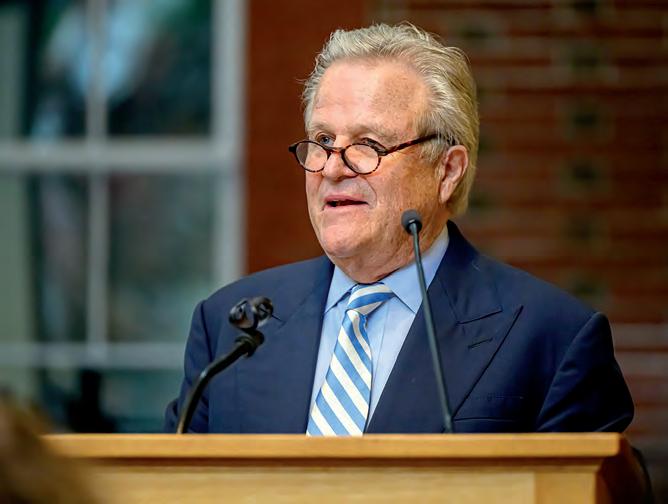
Robin accepted the Distinguished Grotonian honor with these remarks:
Having had issues with scholastic authority in the past, I was startled when Temba called, but deeply touched when he told me that I had received this award. My thoughts first turned to my father, Groton Form of 1926. Dad would have been very surprised but deeply pleased as well. He loved Groton. He was a gentleman of
a certain time and class who seldom expressed his emotions. While I was here, he used to just look at me and utter a sigh, which, of course, said everything. My thoughts also turned to Mr. Crocker, the headmaster, who would have been even more surprised, but appalled, and demanded a recount. He was not a fan. His
judgments were harsh, but in some respects, not always wrong.
Groton taught me some lessons that served me well. No matter what I thought of him, or he of me, I had deep respect for the integrity and character of Mr. Crocker. Both he and my father lived by a code of what they understood was expected of them, whether others were watching or not. These values seem very unfashionable in these equivocal times. For me personally, certain choices arose which, thank God, I declined. Trouble was avoided. Also, if I couldn’t explain it to Eileen, my wife, I just didn’t do it.
Groton changed my life. It was a window into the big world where I wanted to go. I used to roam the halls of the Schoolhouse, reading the letters of past presidents. I subscribed to the Economist in the Third Form and was a sort of a current events nerd, usually winning the Time prize. Later in my life, I never was a star onstage, but I got great seats to watch some of those worlds in boardrooms, the White House, and museums that I had read about at Groton.
Groton taught me humility. I learned early on that I might not be the smartest guy in the room. Dwight Eisenhower said that leadership is the ability to get people to do what you want them to do. Whatever I have been able to accomplish has been by finding people more capable than myself and persuading them to help me achieve what I hoped to accomplish.
While I was chairman of the United States Institute of Peace, we managed to bring together hundreds of people, on both sides of the aisle, from big shots to staffers, among them were two former secretaries of state, the CEO of a Fortune 10 company, the chairman of the Senate Appropriations Committee,
generals, and diplomats, all to help raise a soaring building on the National Mall. Simultaneously, we tried to resolve civil wars in Somalia in the Horn of Africa and Colombia while seeking to reduce the risks of tribal violence in Iraq and Afghanistan. All the while we were being attacked by a jealous congressman. Sometimes we succeeded and at times we failed, but we had to try and, in the end, I came out much stronger. I most certainly did not do it alone.
Serving our country has always been honored and encouraged at Groton, as it should be. In the past, that tended to be elderly white men sitting around the Cabinet table. Now it is often more urgent and hands on. But whatever form service takes, it must imply responsibility. Service without responsibility is utterly hollow. An English admiral from the Napoleonic wars, a tough old sea dog, said responsibility is the test of one’s courage. Too many people in positions of importance, certainly in Washington but also in business, the media and the academy lack a sense of responsibility, and the country and society are worse off for it.
I would hope that service should give a sense of satisfaction, the pleasure of being useful and productive. My classmates will tell you that I am not exactly a sackcloth-and-ashes kind of guy. I want to enjoy what I do. Noel Coward was asked why he continued to work after so many successes. His answer was simple: “Work is more fun than fun.” I agree, and service should be fun too.
I was on campus to deliver a chapel talk in 2016. As I crossed the campus on a perfect fall afternoon to visit Jim Lockney, who had been a wonderful friend to my daughter Kate, I passed many students who looked me in the
eye and acknowledged me pleasantly. I was impressed and struck by how these young men and women had a sense of themselves and their place in this community.
I was reminded of a truism in management consulting, culture eats strategy for breakfast. Culture is the systems and values by which an organization is managed. It is the guts and lifeblood of every institution, Groton included.
During my career, I have seen a lot of supposedly world-class institutions in politics, business and the arts. But Groton, in the quality of its leadership, the alumni, the faculty, the staff, and most importantly of the students, has the strongest culture of any organization I have seen. This is not a cause for complacency. It is a call for all of us to nurture and maintain this school.
Finally, I always come back for my reunions. It is a great pleasure to see some of my oldest and closest friends—as close as family without guilt. We laugh about adolescent antics, excruciating as these oft repeated stories may be to our spouses. But our class is a little platoon that met sixty-five years ago. We went through a lot together. Old rivalries are long gone, replaced by respect and affection for each other, and importantly, their spouses, many of whom are quite remarkable. For me personally, little balloons of self-absorption are burst by gentle humor or knowing skepticism by people who know me best. It is fun and reassuring at this stage of life.
In closing, I am deeply touched by this award from this remarkable community. Thank you. It means a great deal to me.
The 2024 inductees to Groton’s Athletic Hall of Fame include multi-sport stars, a groundbreaking team, and a legendary coach.
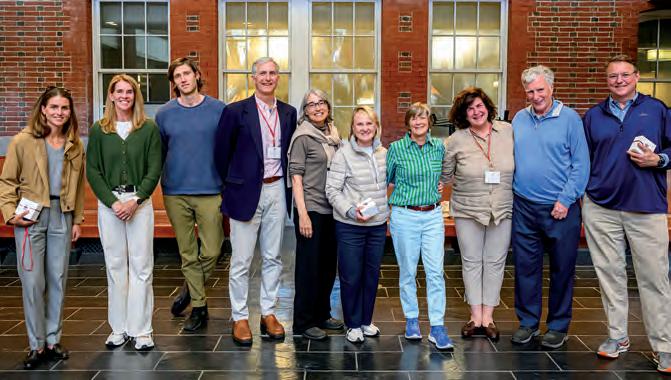
Gabriella Flibotte Walker ’09
Gabriella Flibotte Walker’s journey from Groton to the pinnacle of collegiate lacrosse exemplifies a relentless pursuit of excellence. Graduating from Northwestern University with a BA in Communications and later earning an MBA from Durham University Business School, Gabriella’s academic and athletic achievements reflect her commitment to holistic personal and professional development.
At Groton, Gabriella emerged as a standout student-athlete and leader, serving as a four-year varsity starter and co-captain in basketball, soccer, and lacrosse. Her impact extended beyond the field as she received the prestigious Cornelia Amory Frothingham Athletic Prize and garnered accolades such as Honorable Mention All-American and Lacrosse MVP. Gabriella’s leadership was evident as she guided her teams to success, earning recognition as a two-time firstteam All-Independent School League NEPSWLA All-Star.
Transitioning to Northwestern, Gabriella continued to shine as a defensive stalwart, contributing significantly to the Wildcats’ dominant lacrosse program. Her exceptional senior campaign—marked by a single-season school record 60 ground balls and numerous accolades including IWLCA All-America honors and the MVP of the American Lacrosse Conference Tournament—solidified her legacy as a defensive leader. Gabriella’s pivotal role in Northwestern’s dynasty, which included multiple NCAA appearances and national championships, underscores her status as one of the most accomplished lacrosse players of her generation.
The 1978 Women’s Lacrosse Team emerged as an indomitable force, showcasing unparalleled teamwork and skill on their path to an undefeated season. Led by the exceptional coaching of Elizabeth “Betsy” Dilworth and Gussie
Johns Bannard, the team displayed a formidable presence on the field, outscoring opponents by a staggering margin of 109 goals to 15 across their twelve-game schedule, including a memorable victory against Andover. The team was anchored by the formidable duo of co-captains Amy Frothingham Ford ’78 and Amy Wilmerding Manny ’78, whose leadership and dedication set the tone for this remarkable season.
Comprising players from multiple graduating forms, the team boasted a diverse array of talent and experience. High scorers such as “Bo” Wallace Trase ’79 (29 goals) and Nicole Piasecki ’80 (15 goals) contributed significantly to the team’s offensive prowess, while players like Joan Hirschhorn Bright ’79, Suzanne Keating Lukens ’79, and Sarah B. Sewall ’79, among others, made invaluable contributions despite being first-time lacrosse players in 1978.
The legacy of the 1978 Women’s Lacrosse Team extended far beyond their undefeated season, with many players achieving success in college. Through their collective efforts and unwavering determination, this exceptional group left an indelible mark on the lacrosse community, embodying the spirit of teamwork, resilience, and character that continues to inspire generations of athletes.
Bill Pennoyer’s journey from Groton to Harvard, and later to Columbia, epitomizes a lifelong commitment to excellence both on and off the field. During his formative years at Groton, Bill’s leadership and athletic skill were evident as he excelled in basketball, lacrosse, and soccer. Notably, Bill’s
tenacity on the lacrosse field, where he served as co-captain, helped lead the team to an impressive 11–4 season in 1984 and earned him recognition as an All-League player.
Transitioning to Harvard, Bill continued to leave an indelible mark on the lacrosse field as a tri-captain, earning accolades as a two-time All-American honorable mention and All-Ivy second team member. His stellar performance contributed significantly to the team’s success, culminating in an outstanding 11–4 overall record in 1988, the best since 1980. He led the scoring with four assists and was second on the squad with 69 groundballs. Bill’s leadership extended beyond his playing days, as evidenced by his involvement in various extracurricular activities, including freshman football and the Outdoor Program.
At Columbia University College of Physicians and Surgeons, Bill’s dedication to sports remained unwavering as he embraced the physical challenges of rugby. He later took his passion for sportsmanship and mentorship to an extensive coaching career, during which he selflessly imparted his knowledge of soccer, baseball, and lacrosse to youth athletes.
Karen Carpenter Gray ’84
Karen Carpenter Gray’s athletic legacy is one of dominance across multiple sports. During her time at Groton School, Karen’s leadership qualities shone brightly as she assumed co-captaincy positions in basketball, field hockey, and lacrosse. Notably, she was honored with the Cornelia Amory Frothingham Athletic Prize, a testament to her outstanding contributions to athletics on the Circle. In lacrosse, Karen’s leadership as co-captain propelled the team to remarkable success, securing an impressive 11–2–1 season record, including 9–2–1 in the ISL. Karen’s pivotal role in the team’s triumphs was further underscored by her selection as an All-League player, solidifying her status as a force to be reckoned with on the field.
In addition to her lacrosse exploits, Karen’s impact extended to basketball and field hockey, where she demonstrated her leadership acumen as co-captain. Despite varying season outcomes, Karen’s influence and skill were undeniable, earning her recognition as an All-League selection for
her stellar basketball performances. Her fierce spirit and competitiveness earned her the affectionate moniker “Karen ‘Cut-Throat’ Carpenter” amongst her basketball peers.
After Groton, Karen continued to flourish at Hobart and William Smith Colleges. Her standout performance in the state championships, culminating in a thrilling 14–13 victory over St. Lawrence University, earned her the prestigious title of tournament MVP.
Karen’s commitment to the sporting community also transcended her playing days, as she played a pivotal role in the renovations of the Hobart and William Smith Tennis Center, leaving an enduring impact on future generations of athletes. Karen’s passion for sports further manifested in her coaching endeavors at Western Hills/Colorado Academy, where she imparted her knowledge and leadership to aspiring athletes, embodying the true spirit of sportsmanship and mentorship.
Amy Cunningham Atkinson ’79
Amy Cunningham Atkinson’s journey from Groton to Yale University and beyond is characterized by her multifaceted talents and unwavering commitment to excellence. During her tenure at Groton, Amy showcased her athletic prowess as a standout player in field hockey, squash, and tennis, earning leadership roles as co-captain in squash and tennis. Her dedication and skill were evident in her stellar performances, notably leading the squash team to a commendable 6–4 record in the 1978–79 season and consistently ranking as the best player on the tennis team from 1976 to 1979.
At Yale, Amy continued to excel academically and athletically, representing the university on its squash team and ultimately rising to fourth on the squad in 1982. Amy’s sportsmanship and leadership was further exemplified by her involvement as a Groton School trustee from 2001 to 2010, where she contributed to the school’s growth and development, leaving a lasting impact on the institution.
Amy’s journey serves as a testament to the transformative power of perseverance, passion, and dedication. Her achievements in athletics and beyond underscore her
ability to excel in diverse arenas and make meaningful contributions to the communities she serves.
John Lyons
John Lyons, well known both as a teacher, coach, and player, exemplified leadership and sportsmanship in athletics. His football coaching journey, spanning over four decades, is a testament to his love of the game and the joy he experienced working with players and coaching colleagues.
While a student at Middlebury College, John was a starting tackle on one of the school’s most outstanding teams in 1980–81. As a senior, he was a recipient of the H.R. Rapp Football Award as Middlebury’s top offensive linemen. He was also named to the UPI and ECAC All-East football teams. Following graduation, he was appointed coach of the Middlebury freshman team in 1982.
John began his teaching and coaching career at Northfield Mount Hermon School, where he was the assistant football coach from 1983 to 1985. He also coached NMH’s varsity hockey and varsity baseball teams. From 1985 to 1995, he served as head coach and assistant baseball coach at St. Andrew’s School in Delaware. His football teams there enjoyed considerable success, including one of the school’s all-time strongest teams in 1991, which earned a Delaware Independent School Conference championship.
John arrived at Groton in 1995 as history teacher and head varsity football coach, a position he held until 2006. During this period, he coached several storied Groton football teams, including an outstanding undefeated ISL Championship team in 1997. After a break from head coaching, John returned to the sidelines as head coach from 2011 to 2015, a period that witnessed some of the most memorable games in recent decades, including two unforgettable, lastminute wins over St. Mark’s. The 2011 team was one of Groton’s most talented teams in recent decades, earning a 6–2 slate in an increasingly competitive ISL. In his final years, John continued working with competitive varsity teams, serving as offensive coordinator. His valedictory game was a joyous 33–0 win over St. Mark’s in November 2023.
1 Alumni applaud Max Fan ’25 after his piano performance
2 Holly Green Gordon ’89 and formmates speak with Dagla Rodriguez ’19, Amy Lu ’19, Katherine Brown ’19, and Ayando Tambo ’19 at the conclusion of the Groton Women’s Network Panel
3 Rose Shingles ’23, Amber Gumira ’23, Ned Kaneb ’23 and Christina Chen ’23 gather to celebrate departing faculty on Sunday afternoon
4 Alumni join students in discussing literature in Fourth Form English with Mr. Capen P’17, ‘22
5 Kate Dennison hugs a former student at the farewell celebration for her and other departing faculty members
6 Alumni gather on Friday evening at the Headmaster’s House to kick off reunion weekend
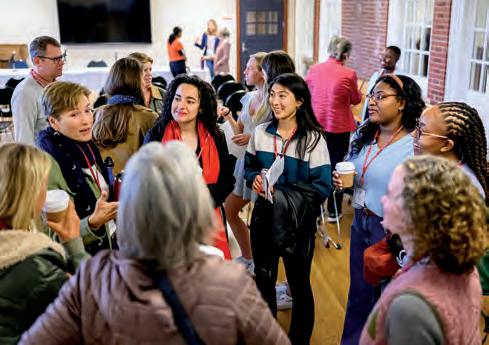
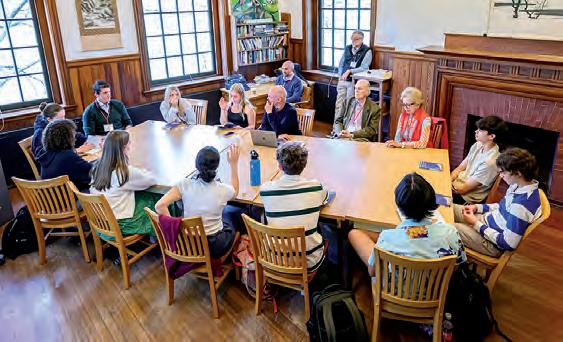
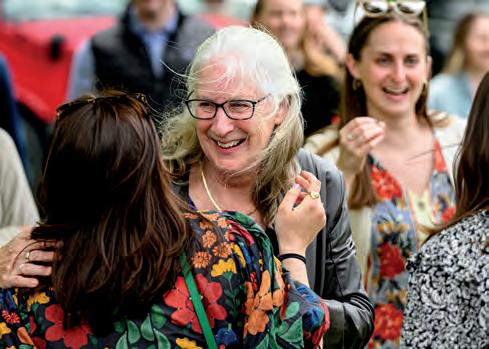
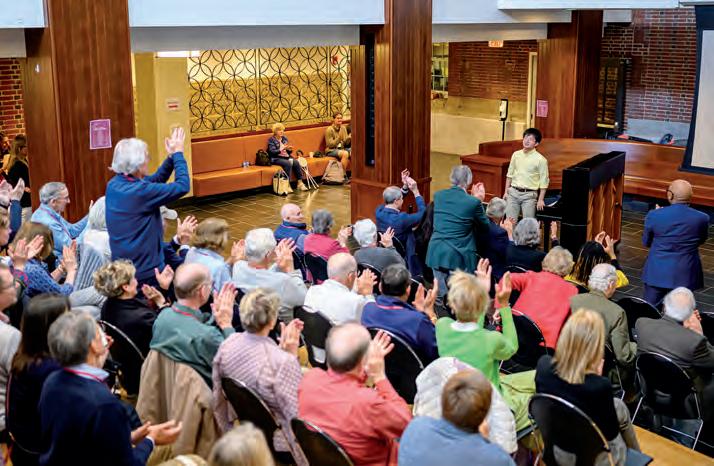
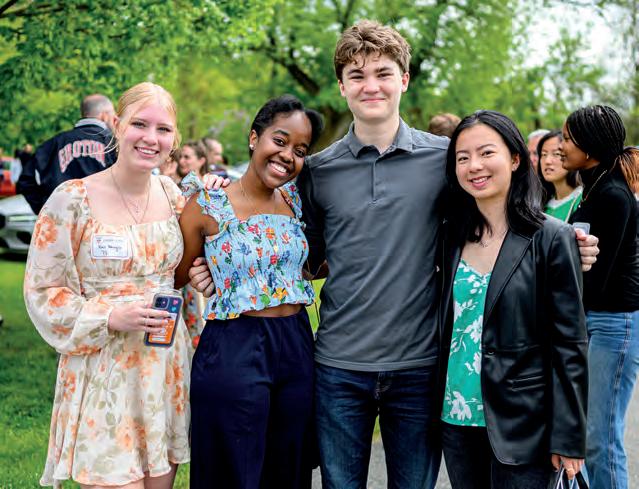
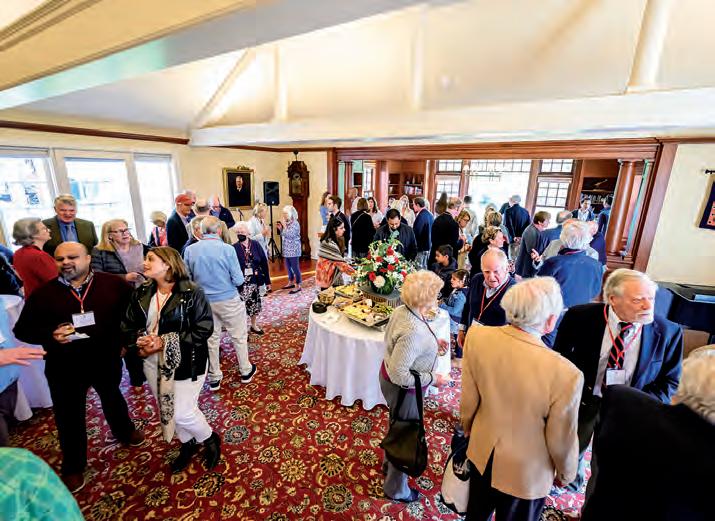
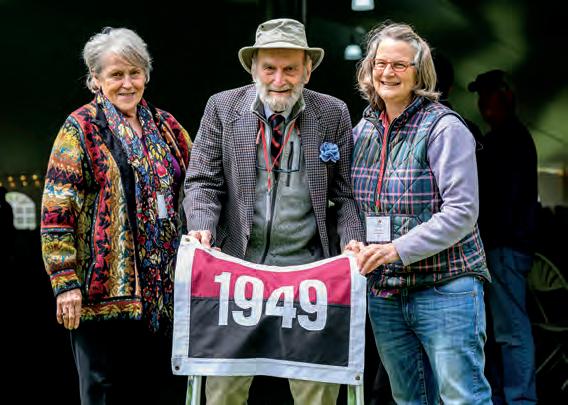
1949
Patricia and Frederic Rhinelander with daughter Sandra Rhinelander ’85
1954
Front row: Bob Faesy, Charlie Hudson, Gordon Shaw, Mary Sloat (friend of John Niles), John Niles, James Brown, Charlie and Harriet Day
Back row: Nancy Faesy, Charlie and Jean Chapin, Joy Shaw, Nancy Brown, Carol and John Crossman
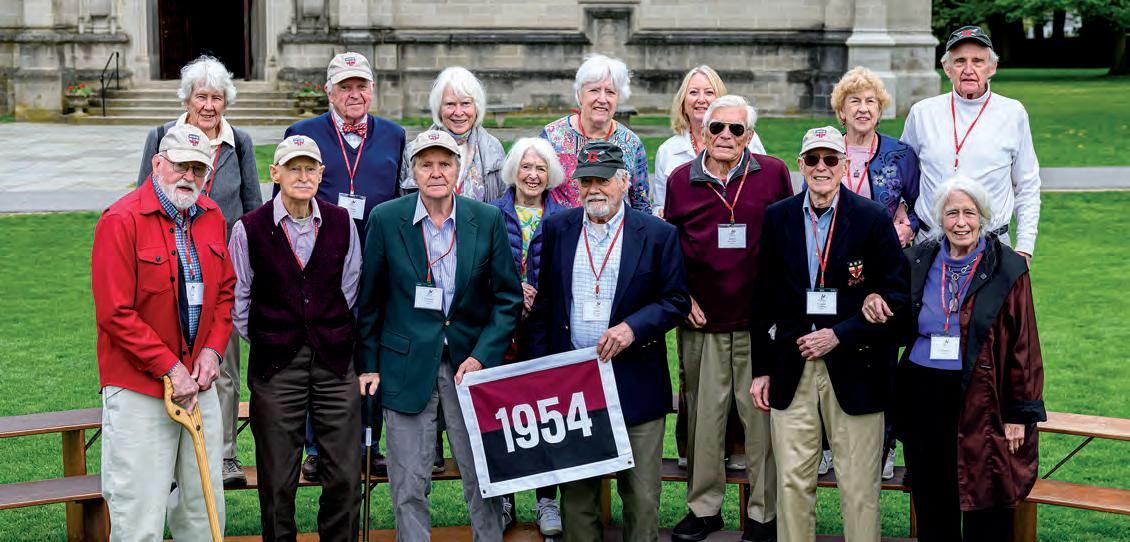
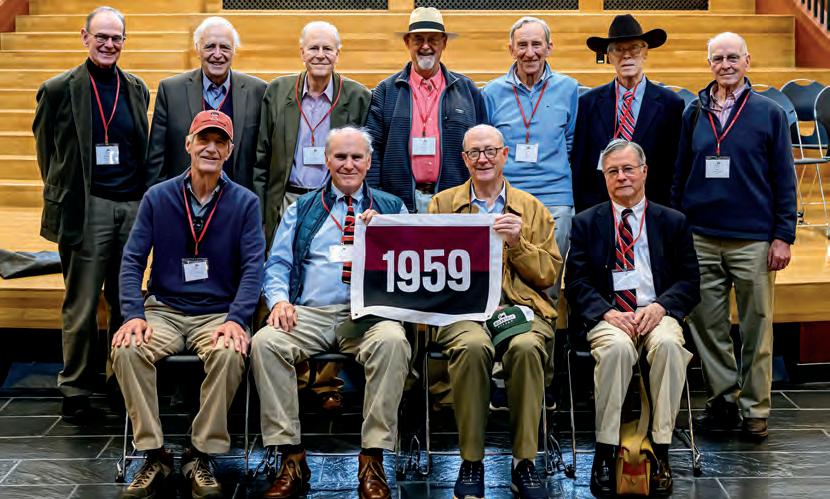
1959
Front
Bart
In attendance but missing from the photo are John Childs, Tom Rush, and Tony
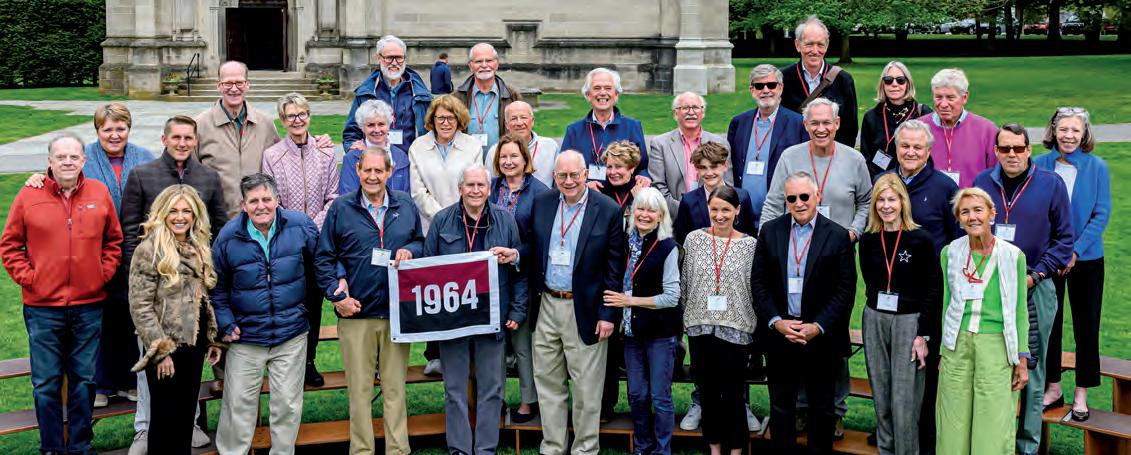
1964
First row: Eileen Wilder, Peter Clarke, Ian Gardiner, Sam Pease, Lawson and Jane Whitesides, Sarah Guth Eberhardt, David Eckel, Eileen Shields-West, Missie Taylor
Second row: Barry Armour, Harrison Wilder, Sarah Pease, Marilu Sherer, Charles Bernard, Sandy Treadwell, Robin West, Zach Taylor
Third row: Margaret O’Hanlon, Nason and Erica Hamlin, Judy Deiro, Antonia and Thurston Clarke, Peter Sherer, Tim Eberhardt, Stephen Pierce, John and Ann Pyne
Fourth row: Mike Knapp, Tom Moser, St. John Smith and Kay Barned-Smith
1969
Front row: Jim Blackey, Alan McDonald, Charles Lane, Donald Murchison
Middle row: Bill Loring, Steve Bundy, Rick Grosvenor, Rob Lawrence
Back row: Rob Sedgwick, Jeff Eberle, Larry Masland, John Hauge, Josh Metcalf
1974
Front row: Joy Grenier (spouse of John), Will and Paula Bundy, Rob and Lynn Key, Blake Hanson, John Cooper, Christiane and Juergen Hueting
Middle row: Beau Grenier, Alan Gregory, Robin Pierson, Jim Morrison, Hank Utter, Andy Post, Cabot and Michele Lodge, Lee Cawley and Tom Viles
Back row: Ned Childs, Robert Higginson, Alex Garthoff, Walter Stern, Jim Yannopoulos, Dusty Davison, Dave Shontz, John Barker, Gus and Cathy Stuart
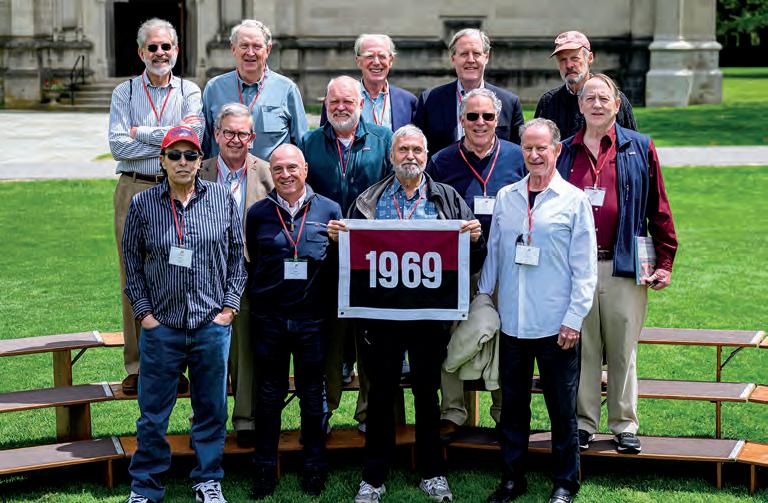
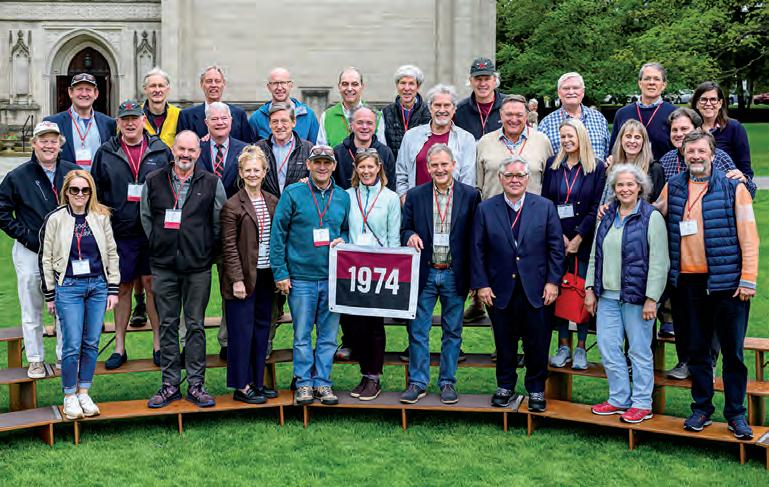
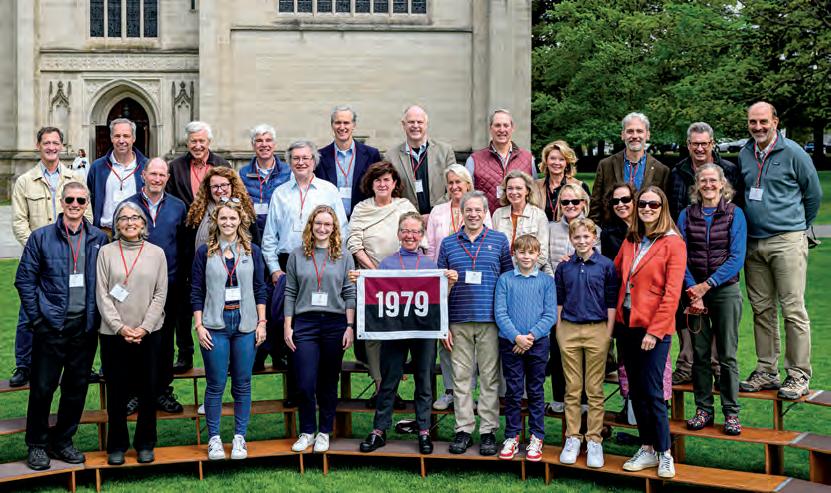

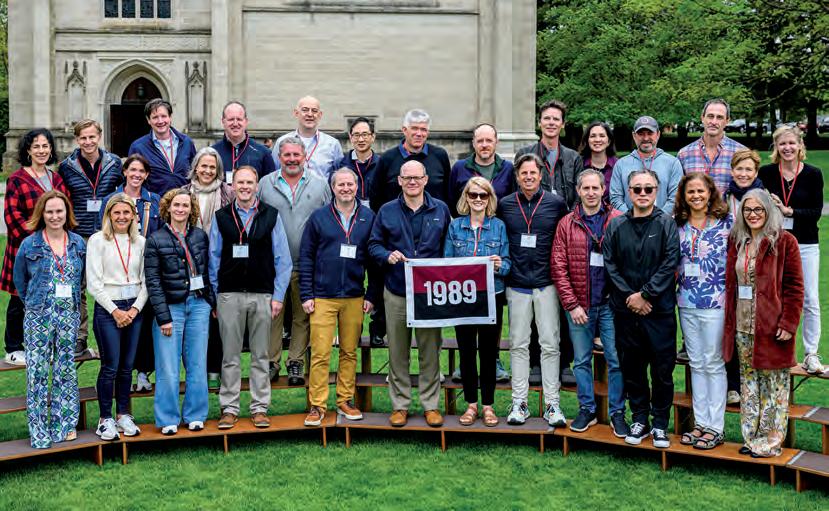
Front row: Tom Conroy, Sarah Sewall, Megan and Katie Jacobson, Sarah Coe, George Jacobs with sons Wesley and George, Helen Burnham Jacobs
Middle row: Tom Hoopes, Jill Conda, Volker Brandt, Amy Cunningham Atkinson, Sarah Alexander MacEachern, Claudia Lewis, Suzy Keating, Donna Brown, Eliza Story Anderson
Back row: Tony Borden, David Wilmerding, Digger Faesy, Tom Bator, Ernie Tracy, Minturn Osborne, Peter Fleming, Georgie Thompson, Nick Gideonse, Shep Brown, David Rimmer
Front row: Karen Carpenter Gray, Nina Tracy Jaeger, David Chapin, Liz Robinson, James Socas, Jessica Perera Vitrouk, Jamie Nicholls, Ellie Bassick-Trovato, Dominique SaintLouis, Ham Southworth, Renee Noto, Bobby Han, Henry Davis
Middle row: Amy Barrett Lindholm, Lucian Snow, Christian Luthi, Andrea Bruce, Greg Edelin, Peter Cawley, Joy Frelinghuysen, Elizabeth Helland Johnston, Lanny Thorndike, Chris Wilmerding, Alec Casey
Back row: Tim Cunningham, Matt Roberts, Chris Oldham, Peter Harper, Ed Childs, Alec Crawford, Bill Pennoyer, Russell Werkman, John Linn, Hutch Robbins, Chris Rhoads, Chris Wagner, Ted Patton, Stacey Symonds
Missing from the photo but were in attendance: Chip Pierce, Chris “Vitas” Williams
Front row (staggered): Jenny Minton Quigley, Lilly Oates, Margot Whinery Pearce, Helen Blair, Diana Montgomery, Jeff Quinn, Phil Dundas, Ben Sheffner, Abbott Lawrence, Caroline Hall, Lucas Hatch, Ian Schmidek, Bernie Cho, Sharon Thompson, Holly Green Gordon, Katya Fels Smyth
Back row: Stephanie Plasse, Roland Reynolds, Fritz Foley, Hylton Jolliffe, Brad Peebles, Steve Oh, Allan Chandler, Roger Murphy, Bill Getty, Maggie Tucker, Jason Wood, Jed Webber, Kimbrel Bunn Morris
Front row: Brooke Philpott, Aliki Peabody (daughter of Kit), Varsha Mathur and Mahesh Sardesai, Suehyun Kim Lindo and children
Middle row: Jaime Earl, Seon Jou Lee and partner, Michael Lindo (spouse of Suehyun), Erica Pinciss and son (spouse of Eric), Ricki Robles Akiwenzie, Tara Mohr
Back row: Sophie Milner ’26 and Pat Milner (daughter and spouse of Taylor), Luca Laino, Kit Peabody, Taylor Milner, Andrew Mercer, Sam Savage, Eric Pinciss, Ricky Rojas, Teebie Bunn Saunders
Front row: Eric Olson, Ana Maria Fernandez, Maria Lingnau von Schack, Vishal and Iva Bahuguna Shah, Patrick Connorton and Jenny Stybel, Kate Reibel, Peter Oliver, J.R. Nutt, Whitney Gosden and Jason Hall, Jake Claghorn, John DantzlerWolfe, Emily Cuthbertson
Middle row: Stephanie Kabala (spouse of Bolek), Michelle Canero Davis, Christine Kim Ciampini, Richard and Gillian Kasser Trepp, Matthew Trowbridge, Anne Howard Davis, Ted Wiley (spouse of Amy Baughman), Katherine Trainor Bielefeld, Beth Bartalot Coco
Back row: Bolek Kabala, Aaron Snyder, Valentine Edgar, Aria and Mike Caldwell, Ryan Kam, Eddie Chin, Noh-Joon Choo, Ned Claflin, Harding Dowell and Wells Bullard, Gardner Ellner, CP Hsia, Mayo Shattuck, Kent Ho, Arthur Kinsolving, Amy Baughman, Matt Hession
2004
Front row: Vicki Hayne Selesnick, Peter Zaroulis, Amanda Morgan, Jack Lysohir, Emma Bloomfield, Martin McWilliams, Chester Hall, Max Carter, Naa-Sakle Akuete, Dan Perkins, Daan Usmani, John Murphy, Blair Fletcher Hardy, Binny Rubeor, Vaughan Leatherman Stewart, Meg Witherbee
Back row: Louise Denny Considine, Tom Hardy, Marvin Klein, Alexis Rathborne, John Grenier, Charisse Shields, Mike Snyder, Christina Razook, Chris Wu, Jeff Postera, Chip Sherwood, Rich Dunne, Dan Van Der Meulen, Neal Connors, Bunny Bispham, Sam Anderson
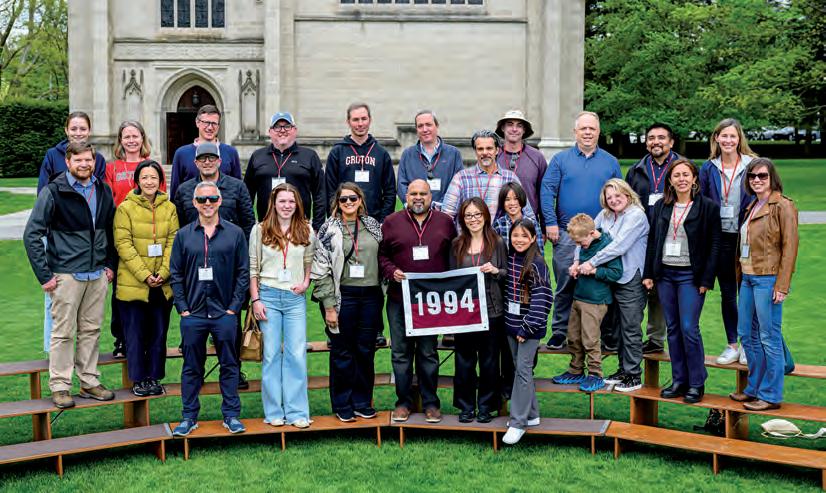
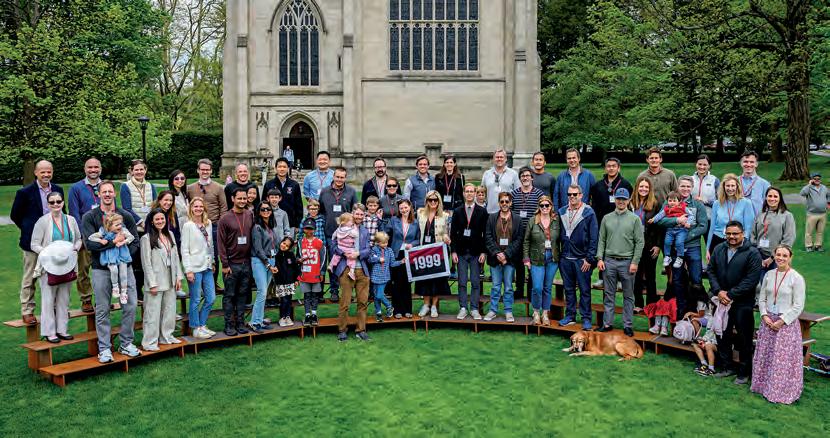
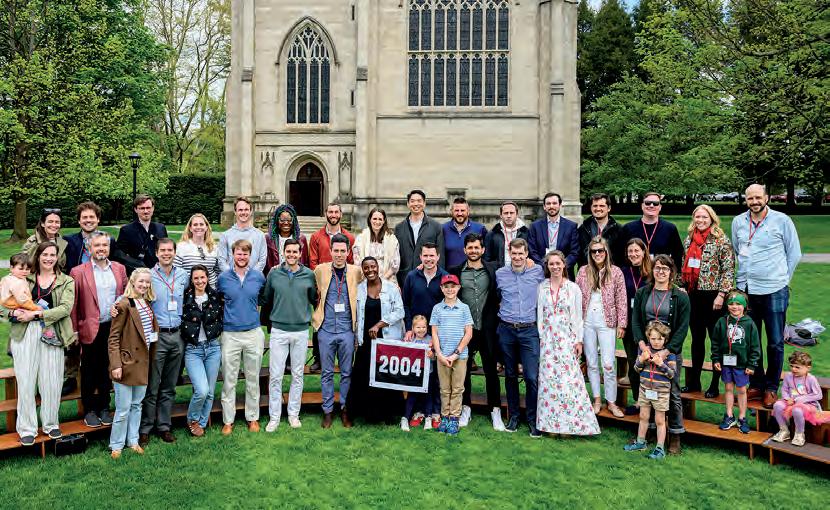
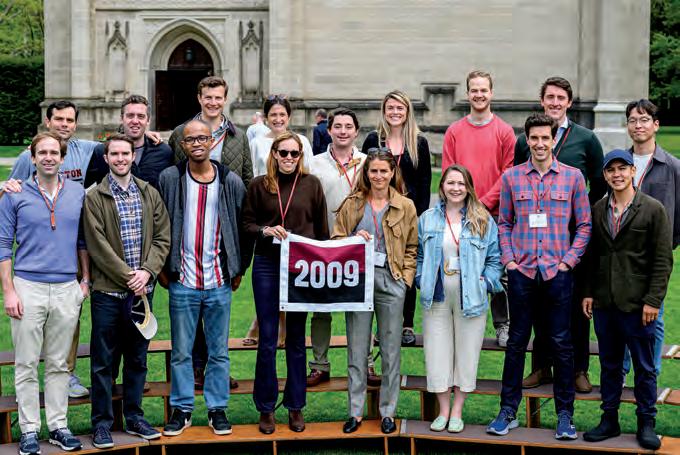
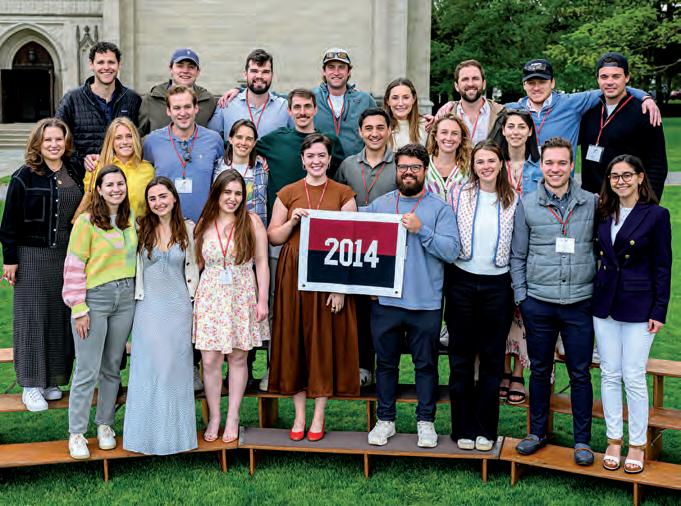
Front row: Reed Simmons, Lorcan McGonigle, Ud Okorafor, Ripley Hartmeyer, Gabriella Flibotte Walker, Perin Adams, Seppi Colloredo-Mansfeld, Aaron Primero
Back row: Peter Taylor, Alistair Cummings, Adam Reeve, Kerri McKie, Billy Larkin, Ali Maykranz, Evans Grenier, Ames Lyman, Jungho Son
Front row: Morgan Pagliocco, Sofi LLansó, Violet Papathanasiou, Becca Gracey, Matt Borghi, Mimi Fiertz, Andrew Popp, Alexis Ciambotti
Middle row: Lucie Oken, Addie Ewald, Will MacEachern, Lauren Dorsey, Dan MacDonald, Rob Beshere, Lucy Brainard, Diana Sayegh
Back row: Liam Cashel, Jamie Thorndike, Henry Bator, Axel Brown, Hannah Conner, Joe Gentile, Griffin Dickson, PJ Johnson
First row: Becker Han, Edward Cho, Ishana Das, Lucy Gund, Nikki Pollis, Ra’ad Zeid, Jaden Cheeks, Francisca Saldivar, Cho Nikoi, Angelika Hillios
Second row: Brian Xiao, Ademola Ogunsanya, Faiz Malik, Andrew Yang, Patrick Ryan, Owen Gund, Rajit Khanna, Gus Vrattos, Bridget Cornell, Amy Lu, Eliza Lord, Julien Alam, Lily Cratsley, Marie Sanford, Lilias Kim, Sophia Conroy, Autumn Johnson, Halle Livermore, Chip Pontifell, Ayanda S. Tambo
Third row: Noah Kader, Brent Gorton, Land Tantichot, Julia Kendall, Shirley Li, Sara Glawe, Walker Davey, Christopher Sznip, Marianne Lu, Abby Kirk, Montanna Riggs, Gloria Hui, Dagla Rodriguez, Lily Delaney, Lyndsey Toce, Emma Matthews, Evie Gomila, Sarah Conner, Freddie Tobeason, Katherine Brown
Fourth row: Dawit Ghebremedhin, Gabe Scholl, Joey Schiavone, Vlad Malashenko, Jake Kissell, Will Torriani, Brandon Slawaska, Clement Banwell, Mark Bruni, Drew Burke, Bobby Meehan, Nick Steinert, Johnny Stankard, Anders Orr, Jack Wilmerding, Bennett Smith, Ali Brown, Tilly Brooks
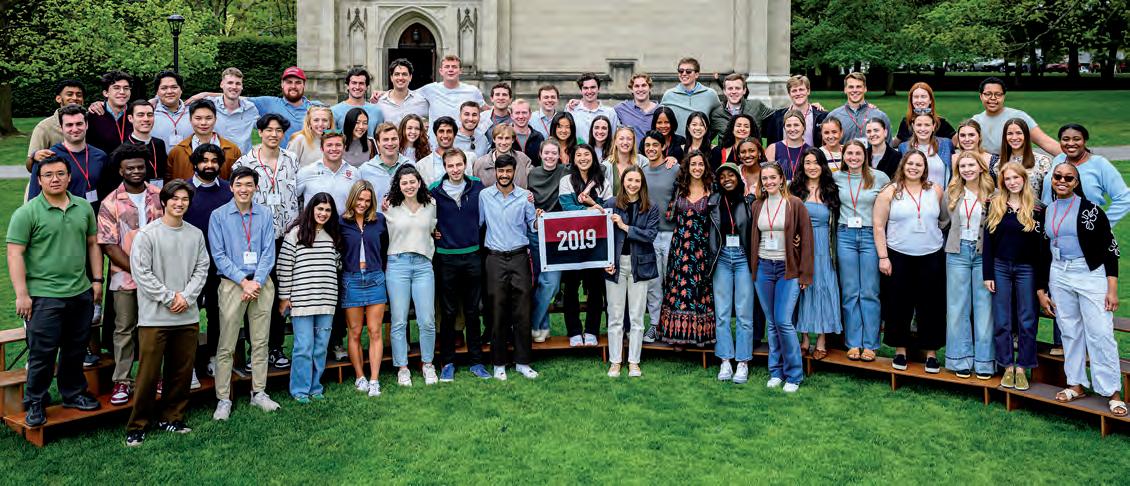

A CHAPEL TALK
by David Altshuler P’13, ’15, ’18, ’20, TR’12–
April 26, 2024
There are eight people in a conference room—I’m one of them. We’re asked a simple question: “When in your life have you felt a sense of real accomplishment?”
This was an impressive crowd. There was a star doctor, an environmentalist, an artist. There were people who’d succeeded in major, public ways—ways I never have.
They start answering the question. The doctor answers, “Well, I don’t know—I’m not sure I’ve ever really felt deeply accomplished.” Then, the environmentalist: “Not that I can remember.” Then the artist, the most celebrated person in the room, answers: “I’ve never felt that accomplished in my life.”
Now it’s my turn—I don’t know what to say. By almost any metric, I’m the least accomplished person in the room. But there I am, thinking, “I feel a sense of accomplishment every day.”
I didn’t always feel this way. When I was a kid, I was surrounded by some truly smart and accomplished people. My dad was a brilliant doctor and inventor; my mother was a valedictorian. My uncles, well, the dumb one was a Rhodes Scholar. So, from an early age, I was acutely aware that I could never best the people around me. I couldn’t tie them. I wasn’t even in the race. I was condemned, at least around them, to be the loser.
Then I went to college with the promises of new people and new surroundings. I thought, “Maybe now, this is my chance to shine!” Then, a new friend invited me to his piano recital … with the Boston Symphony Orchestra, where he was a soloist playing Rachmaninoff. So, there I was again—at least around him—the loser.
Does anybody see a pattern here?
Jump a couple of decades forward, and there I am in that conference room. Once again, I’m surrounded by
amazing, celebrated people. And once again, I’m the loser. But somehow, I’m the one who feels accomplished—in fact, I feel great.
So how did I go from being the loser and feeling not good enough to still being the loser, but feeling great?
This morning, I want to share with you my Loser’s Guide to a Meaningful Life. This guide is a set of three questions I ask myself almost every day; three questions that have made a difference in my life; three questions I share with you in the hope that they may make a difference in your life.
Question One: What do I feel good about today?
Every morning, when I step into the shower and the steam fills the air, I reflexively, automatically, compulsively ask myself the same question: What do I feel good about today?
Everyone, repeat after me: “What do I feel good about today?”
[AUDIENCE REPEATS]
Here are some of my answers from showers gone by: I feel good that my wife safely delivered our son, and both mother and child are alive and well; I feel good that Amazon delivered my Santa hat in time for the office party; I feel good because I finished the Saturday crossword with almost no cheating.
As you can see, some of the answers are small, trivial, selfish. Then again, hey, it’s my shower! By starting my day this way, I fill my tank with happiness, positivity, and even optimism.
So, let me ask: “What do you feel good about today?” Maybe you got a better grade than you expected on that essay. Sure, it’s not world peace, but it’s something. Use it. Maybe you went to see your friend’s show, and just by
“Doing something kind for someone else is the single most effective tool to increase our own happiness and well-being.
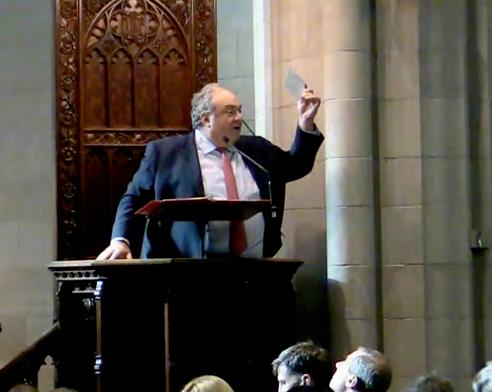

showing up, you made them feel a little bit more loved. Still not world peace, still something. Use it
OK. Let’s practice. When I say GO!, turn to someone next to you and tell them one thing you feel good about right now, and then listen to their answer. Seriously, you have thirty seconds. On your mark, get set, GO!
[AUDIENCE PRACTICES]
Great job. Tomorrow morning and for the next week, whenever you’re in the shower, I challenge you to ask yourself, “What do I feel good about today?” and see what it does for your day, your week. It has done wonders for my life.
That’s the first question. But what happens when you step out of the shower, happier and ready for the day, only to slip and fall on your face? Well, now it’s time for …
The second question of the Loser’s Guide to a Meaningful Life. Now, this question comes in two parts: So what? Now what?
Repeat after me. “So what?”
“Now what?”
[AUDIENCE REPEATS]
[AUDIENCE REPEATS]
As soon as you get out of that warm, cozy and happy shower, the world can throw a lot at you—from minor
disappointments to real-life disasters—a failed quiz, a romantic rejection, even the loss of loved ones.
Now, I don’t know your stories; I don’t know the mountains you’ve had to climb to get here today, the mountains you’re still climbing. But, for me, on both my best and bleakest days, these two questions have been indispensable. So what? Now what?
Loath though I am to utter the word “college” in a chapel talk, many of you have likely experienced falling for a particular college only to be rejected—I know the feeling.
So what? Nobody died, but it stings.
Now what? One option: Give up, roll up in a ball, and hide under a desk. That’s a real option. But you won’t do that. You’ll double down on the dreams that matter most to you: What kind of person do you want to be? What greater dreams do you want to achieve? Use this disappointment to your advantage and muster twice the energy to make these greater dreams come true.
So that’s college rejection. What about life and death?
My father was a lifetime competitive athlete. In his sixties, he became an avid bicyclist, the type to cross the Rocky Mountains on a mountain bike. In his early seventies, he got in a bicycle accident and died.
“So what?” Well, in this case, a lot. I lost my dad; my mother lost her husband; my children lost their
grandfather. Had he lived as long as his grandparents, my father might be here today in Chapel, not dead these twenty years.
So, “Now what?” After my father’s death, my “Now what?” was to plumb my memories and bask in our life together—the time he kidnapped me from elementary school just to take me out to lunch, the all-nighter we pulled building a model car, his trumpet, his dancing, the food fights with his grandchildren. When I remember him, when I talk about him to my children and to all of you today, I keep my father alive in some sense—for as long as we remember him, he’s never entirely lost.
Whatever life throws at you, whatever you encounter when you leave that warm shower, I challenge you to ask, “So What? Now What?” I think you will be surprised how much it can help. This brings us to . . .
The third and final question in my Loser’s Guide to a Meaningful Life: Who can I help today?
One of my heroes, psychologist Martin Seligman, has spent a lifetime developing the field of positive psychology. Marty is arguably the father of the academic study of resilience and grit, happiness and optimism, and how we find meaning and purpose in our lives. Here is a central finding of his career: doing something kind for someone else is the single most effective tool to increase our own happiness and well-being, and that’s in addition to helping others.
So, who can you help today? One way to answer this question is to think of making gifts of your time to someone else. You can tutor, you can coach, you can clean litter from a beach. You can call your grandmother and make her day. You can write a thank you note that tells a friend or mentor how much they mean to you.
OK, everybody, it’s time for our Oprah Moment. If you check the seatback in front of you, you’ll find a small white postcard, stamped, and ready to
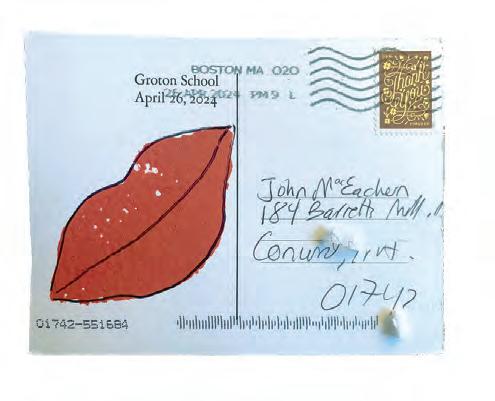
[AUDIENCE FINDS POSTCARDS]
With a pen and a minute of your day, today, you can reach out and change the world. Now, everybody, repeat after me:
I solemnly swear …
[AUDIENCE REPEATS]
To write my postcard …
[AUDIENCE REPEATS]
And drop it at the mailroom …
[AUDIENCE REPEATS]
TODAY!
[AUDIENCE REPEATS]
Great. Now, later today, when you drop off your postcard, as you just solemnly swore you would, pay attention to how it makes you feel. I’ll give you a hint: it’s gonna feel great. And that’s great
Seligman’s research also shows us that we are most productive and effective when we’re happy. And, this applies across the board—from sending your postcard today—as you swore you would—to pursuing a life-long career. If you can do something you enjoy and do it for others, you’ll be doing good and doing it well. And if you do this, you may even discover your true calling, your vocation
As Frederick Buechner writes:
There are all different kinds of voices calling you to all different kinds of work, and the problem is to find out which is the voice of God rather than of Society … the place God calls you to is the place where your deep gladness and the world’s deep hunger meet.
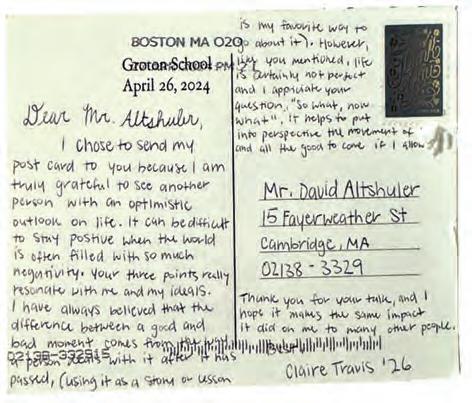
So, that’s it … my Loser’s Guide to a Meaningful Life in three little questions: What do I feel good about today?

So what/Now what? and Who can I help today? They are yours to take and make your own, so that someday … should you find yourself in a conference room surrounded by people who’ve conquered the world, at least compared to you, you’ll feel as deep a sense of accomplishment, meaning, and joy as I do … every day
I wish you wonderful, wonderful lives. God bless you all.
[In the last weeks of the 2024 spring term, the Groton community sent over 1,000 postcards to recipients around the world. —Ed.]

by Sheena Bakare ’24
April 5, 2024
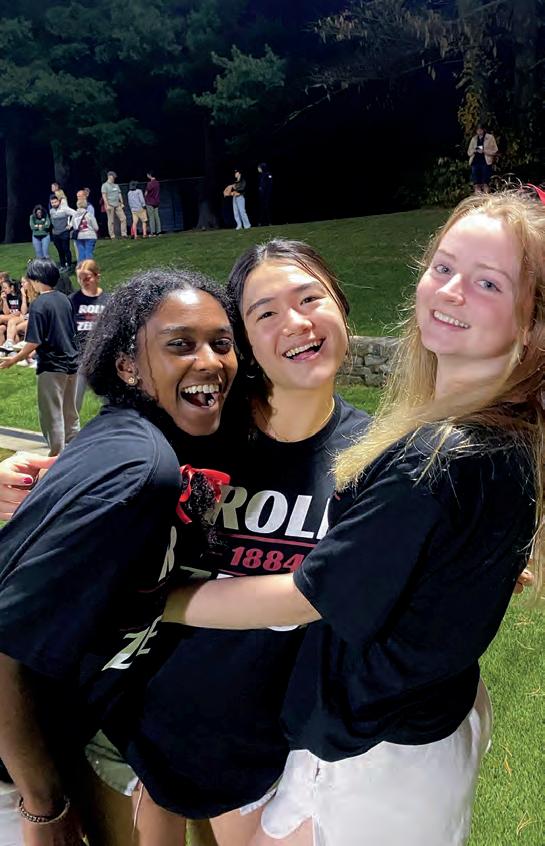
The first story I was ever told feels like a memory. It begins in the Eastern Cape of South Africa, where the sun cascades down red hills and valleys. There, high up on the hillside, is a farm. The plantation is simple and unremarkable, except for the land on which it sits. This land gives gifts of fruit: there are rows of banana trees with leaves that hang like great lampshades over the ground. There are groves of lychees and mangoes.
On the other side of this hill, called Marian Hill, is a river. And somewhere in this story is my mother, learning Zulu from the women who lived some miles away. Women who carried pots of food and water on their heads, whose dark faces never cracked, whose voices carried over the mountains. They carried life and joy from their homes into the land they worked.
This was the setting of my mother’s childhood holidays. In the heart of Zululand, she spent her days running around with her sisters and cousins, digging in patches of vegetables, and discovering the richness of the earth. From the top of the hill she would hear the full sound of the Zulu drumbeat as it echoed from the valley. And, from this hill my mother studied for her English exams.
Then there are those rare stories from my father, how he would run alongside tires with his friends all afternoon, until he saw the red of his father’s car turn up the road, and the dust that billowed behind it. How he scrambled back to the house, back to his books, because there was nothing my Nigerian grandfather valued more than hard work and education. A father who he admired and adored.
The stories I fell in love with were not ones I read, but ones I listened to. Stories that, over time, I
“The best way we can approach a place of deep resonance with one another is by telling our own stories.
understood shaped the very being of my parents. And, in their own way, have shaped me. They were beautiful because they possessed a feeling of true meaning for those who told them. And so I looked for this beauty in every book I read as a child, and in every short story I wrote in notebooks at school. It was a feeling shared with my sister in our childhood bedroom, as we told each other our dreams before we fell asleep. It was a feeling that shaped each game of make believe with my elementary school friends, set on the stage below the great oak trees of the playground.
Once my parents realized my interest in reading and writing, they took it very seriously. My mother was especially determined that I could be forged into a prepubescent author. So, in fourth grade, I was promptly enrolled in creative writing classes three times a week after school. During those Monday, Thursday, and Friday afternoons I learned from my teacher how to write a story. First, I learned, a story needed a round character. A round character was someone who wanted something, and that desire defined everything they did or believed. Next, was the structure. In the exposition the reader should have a layout of the characters, and setting. Then, as the plot continues, the character is introduced to some kind of conflict, maybe something that had been building over time or something completely out of the blue. And, as the conflict reaches a climactic point, the character has a profound shift in thinking, or a deep seeded realization about themselves, life, or their wants versus their needs. After this moment, the change takes root and the story is resolved. This is how I was taught all stories should be.
So, with my fourth grade ambition, I set off to the task. Over several weeks, I produced my debut novel, called Tiger Girl. If you are really interested in reading the whole story, I can share it with you, but for now I’ll just give you a brief summary:
My round character was named Tara. In a dramatic
exposition, Tara is abandoned in the jungle by her parents at only a few months old. Miraculously, she is taken in by a family of tigers and granted the gift of understanding animals. Then, just as I was taught, I defined her underlying want: to be with her real family. So, naturally, this drives Tara to leave her home in search of her lost parents—a starting point of conflict. I built the action through Tara’s treacherous journey in the outside world, and at the story’s climax, Tara encounters a bandit that reveals he had killed her parents. And then he tries to kill her. But Tara escapes, and has the profound realization that family is “any animal or human that loves you and supports you no matter what.” I concluded the story with Tara happily returning to her jungle home. When the story was posted to the writing workshop’s website, I received praise from comments that said: “Super Sheena!!!! I enjoyed reading your story and look forward to more to come.”
Unfortunately, my story was not as “super” as the commenter had described. There were many things wrong with it. The writing was cliché, the plot was messy, and some “chapters” were a paragraph long. Parts were also probably plagiarized from The Jungle Book. But what continues to resonate with me today about Tiger Girl is how it felt to write it. To put everything I knew and understood about the world, about family, love, and the journey of personhood into writing. And what I understood about these themes came from the stories I had known from my childhood. Tara’s jungle was carved from my mother’s stories of the lush Eastern Cape—the animals, and the people, the affection and reverence for the natural world. The principles of familial love came from the stories of my father’s upbringing in Ibadan, Nigeria. There, my dad was raised by an aunt who was family by more than just blood, but by love. My parent’s stories and Tiger Girl echoed one another in their honesty about the fundamental truths of the human experience. They existed in conversation.
Good stories are more than just good writing. They are more than a distinct catalyzing event, a rise and fall, a climax and a neat conclusion. In fact, I think there are very few people that can say they have experienced life in this categorical way, and any “good story” plays on this structure with some new invention. What makes a good story is its sincerity. A good story reminds us of our humanity. A good story makes us laugh at a lunch table, or cry in our bedrooms. A good story expands our minds beyond our own world, into someone else’s, to where we can see the two intersect.
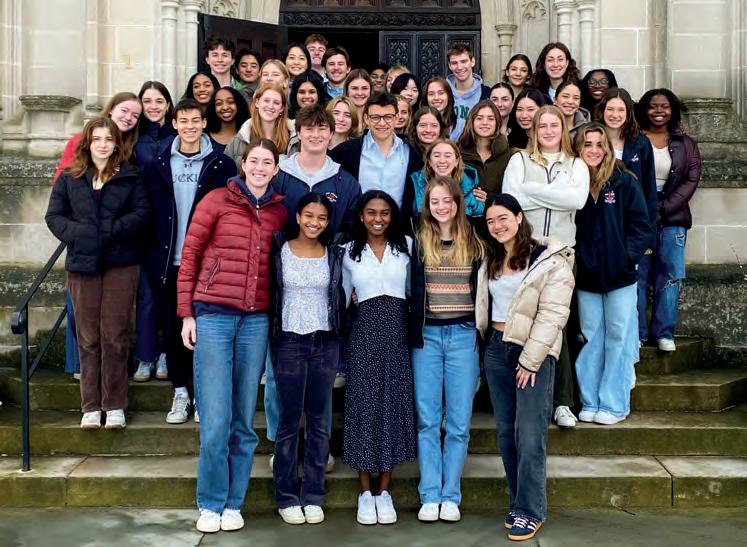
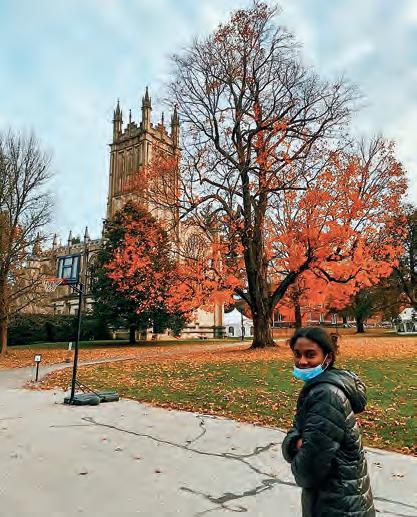
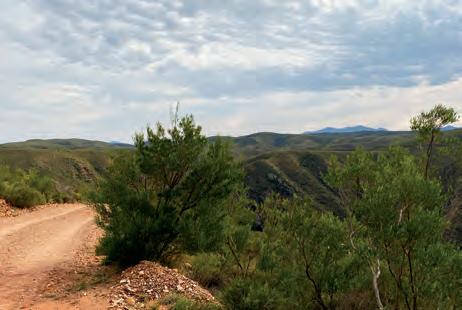
And the best way we can approach a place of deep resonance with one another is by telling our own stories. We spend so much time dissecting the human condition that we forget to observe our own experience. We forget what it means to feel, to see, and to be. We forget what is really valuable. Storytelling is powerful because through it we arrive concurrently at ourselves and at mutual understanding.
For me, storytelling looks like gathering in the living room of my aunt’s house in Cape Town, listening to the laughter of my mother and her sisters that fill the room as they reminisce about their girlhood. And in that moment I can recall the same joy in my memories of riding bikes in the park with my sister, or swimming in the river with my cousins on our South African farm. For me, storytelling looks like late nights in Third Form, listening to Michaela tell stories from her childhood in New Jersey, or resting my head on Arianna’s shoulder
as she described summers in Poland. From their stories I share in their nostalgia, and call to mind my sweet Carolina summers, rolling down sand dunes in Kitty Hawk. Their times and places echo my own memories. The stories of the people I love become a part of me.
At Groton, we have the privilege of being surrounded by many different stories, from different places, with different truths. All of you, including you newly admitted students, will bring your own stories to the circle. Lean into them. Do not shy away from who you are. Because when you come to Groton you are not leaving your home behind but bringing a piece of it with you: your stories. And they will be woven into the complex tapestry of our community.
In the words of Rainer Maria Rilke, “I can’t give you any advice but this: to go into yourself and see how deep the place is from which your life flows.”
There you will find a good story worth telling.
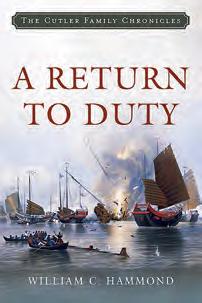
William Hammond III ’66
A Return to Duty, the eighth volume in the award-winning Cutler Family Chronicles series, is set in Massachusetts and the Far East in the early 1850s during the aftermath of the First Opium War fought between China and Great Britain. The subsequent flood of opium into North America and Europe, from Turkey and the eastern provinces of India through China, threatens the very fabric of America. As a premier carrier of goods along Far Eastern trade routes, Cutler & Sons, in league with the U.S. Navy and the Royal Navy, plays a key role in the struggle to eliminate the scourge of narcotics. Family loyalties, core values, and passions are woven into a plot that takes the reader from Boston to Washington, and from Java to Hong Kong and the Gulf of Tonkin, in a savage conflict with cutthroats and brigands who defy their emperor to amass huge fortunes by ransoming sailors and smuggling opium. The fate of Cutler & Sons and the future of Western civilization hang in the balance.
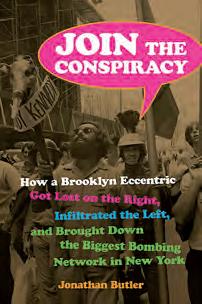
Jonathan Butler ’87
Join the Conspiracy
In the shadow of recent turmoil, Join the Conspiracy transports readers to a pivotal moment of division and dissent in American history: the late 1960s. Against the backdrop of the Vietnam War and a nation grappling with internal conflict, this compelling narrative follows the life of George Demmerle, a factory worker whose political odyssey encapsulates the era’s tumultuous spirit. From his roots as a concerned citizen wary of his country’s leftward tilt, Demmerle’s journey takes a dramatic turn as he delves into the heart of radical activism.
Join the Conspiracy reveals Demmerle’s complex role in a society at war with itself, where his deepening involvement with the radical left and a bombing collective forces him to confront his loyalties. The narrative, enriched by a rare trove of period documents, candid photos taken from inside the radical movement, and underground art more than a hundred of which are included in the book not only charts Demmerle’s saga but also reflects the broader story of a nation struggling to find its moral compass amidst chaos.
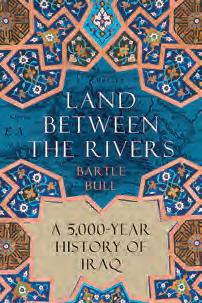
For his magisterial history, Land Between the Rivers, author Bartle Bull was inspired by his extensive reporting from the region to spend a decade delving deep into its history. Bull chronicles the story of Iraq from the exploits of Gilgamesh (almost certainly an historical figure) to the fall of the Iraqi monarchy in 1958 that ushered in its familiar modern era.
Central themes play out over the millennia: humanity’s need for freedom versus the co-eternal urge of tyranny; the everpresent conflict and cross-fertilization of East and West with Iraq so often the hinge. We tend to view today’s tensions in the Middle East through the prism of the last hundred years since the Treaty of Versailles imposed a controversial realignment of its borders. Bartle Bull’s remarkable, sweeping achievement reminds us that the region defined by the land between the rivers has for five millennia played a uniquely central role on the global stage.
Book summaries were provided by the authors and/or publishers.
Please send information about your new releases to quarterly@groton.org.
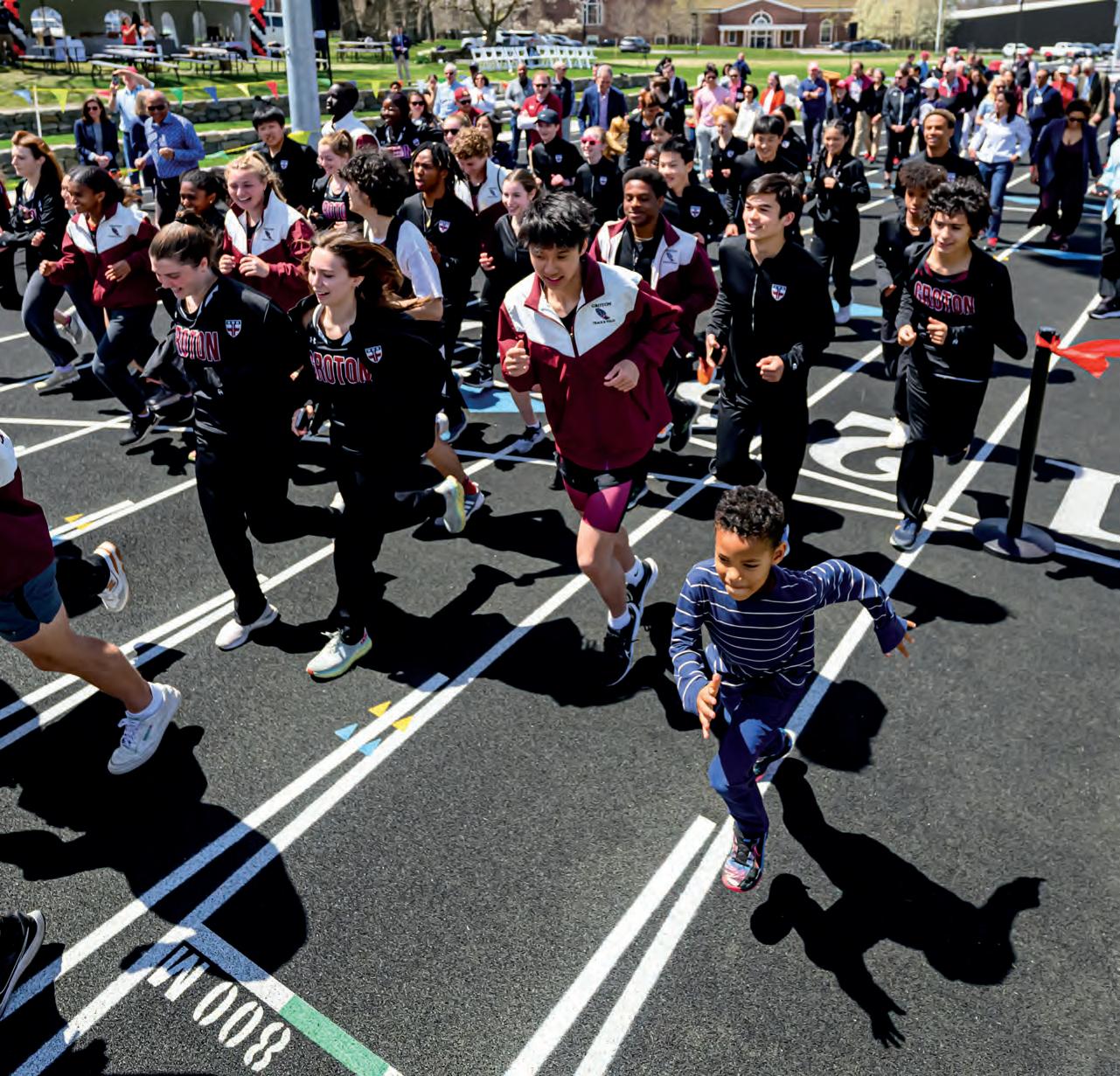
After sixteen years as a program without a home, the Groton track and field team wasted no time settling into the new Vuyelwa and Temba Maqubela Track and Field Complex, as the boys won its first-ever New England Preparatory School Track Association (NEPSTA) title. The spring sports season saw outstanding performances in other sports as well, with Zebras setting new standards on the courts, fields, and water.
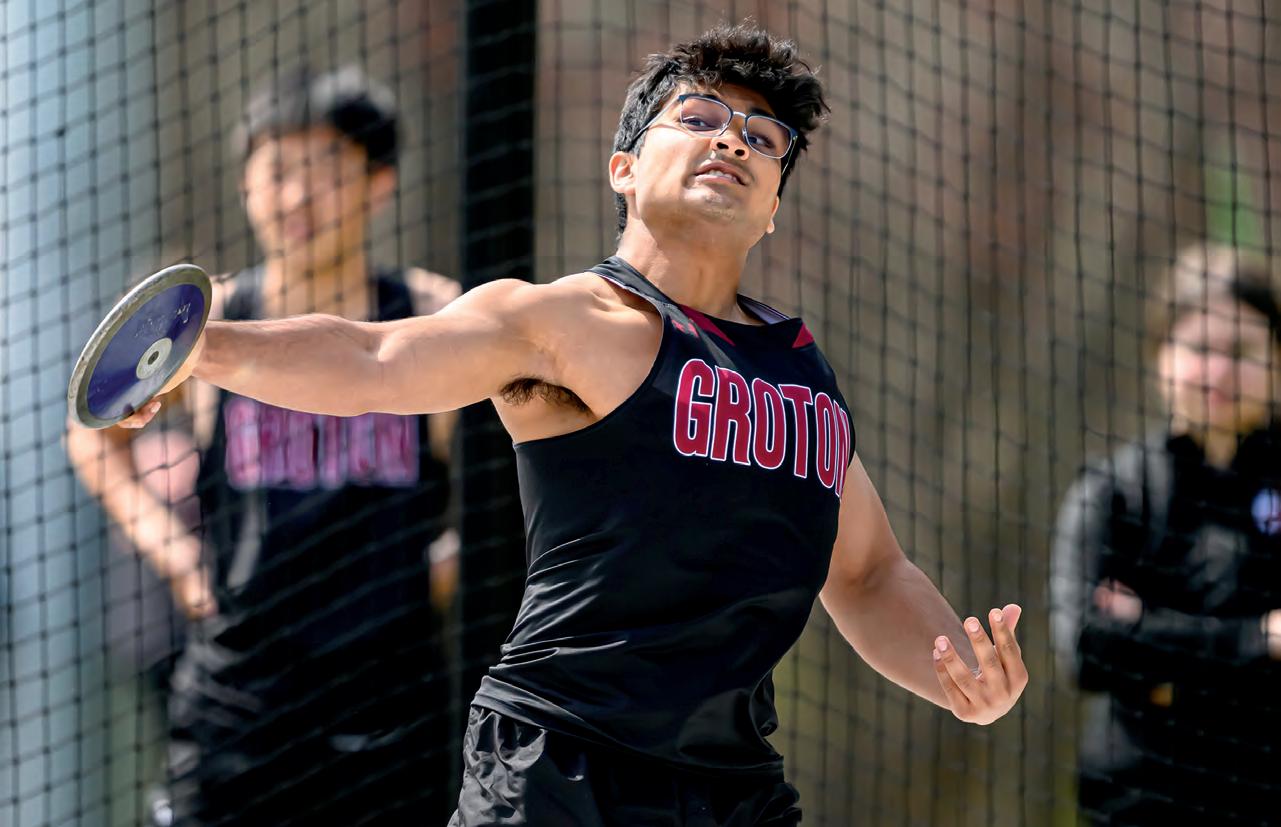
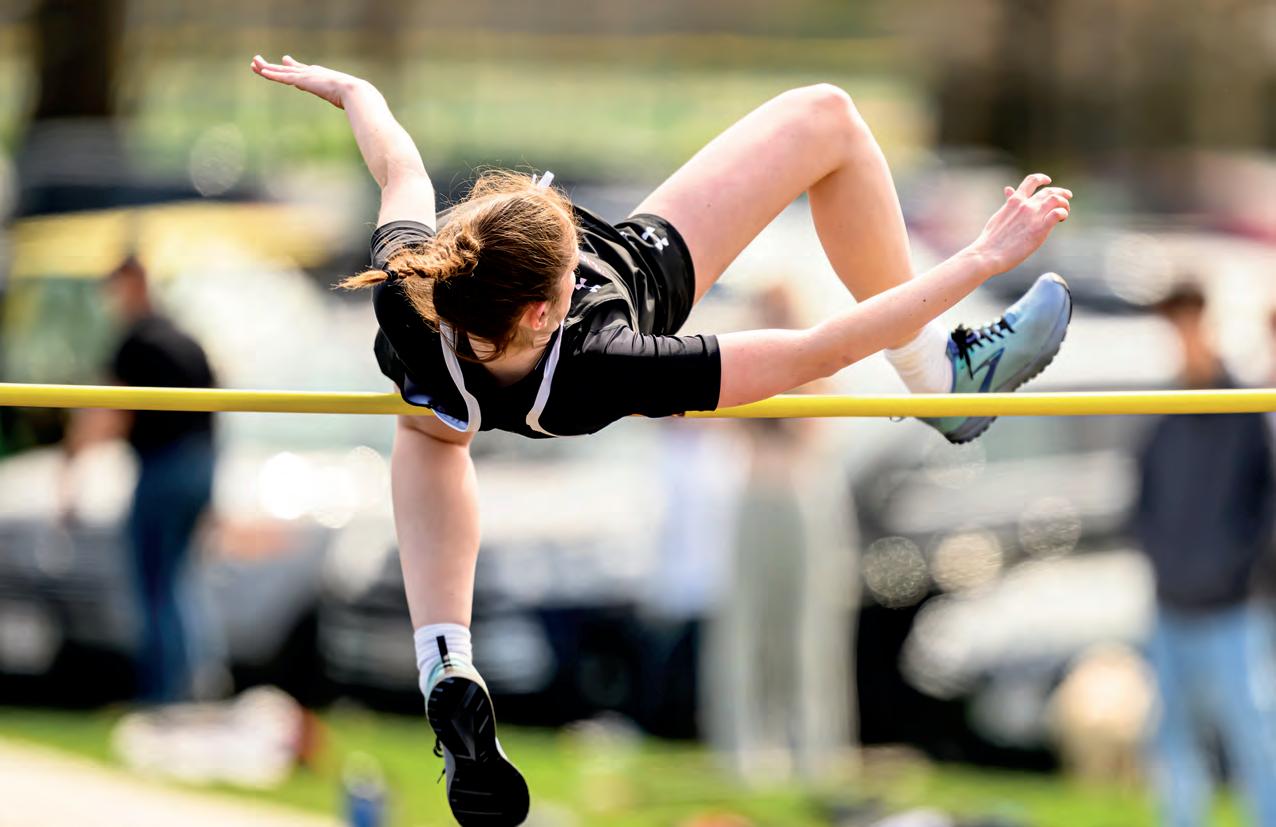
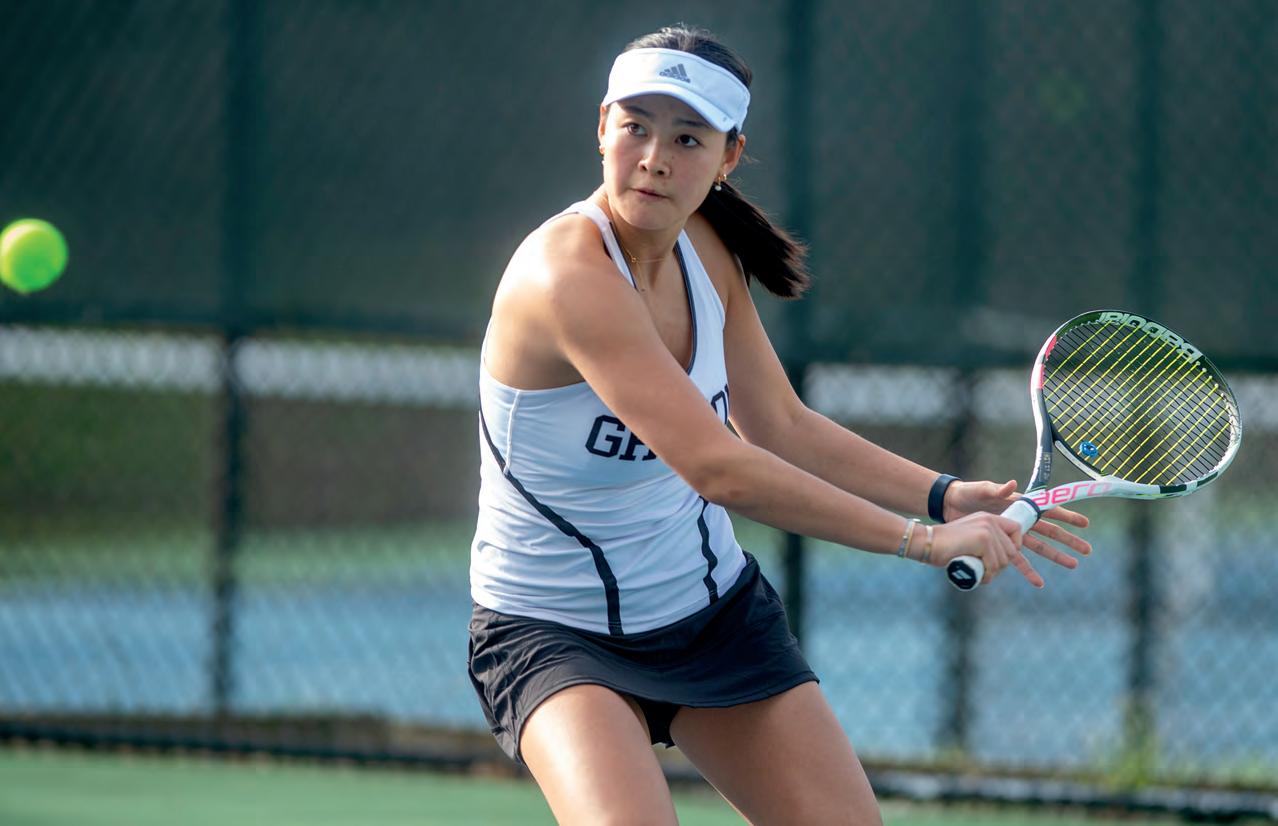
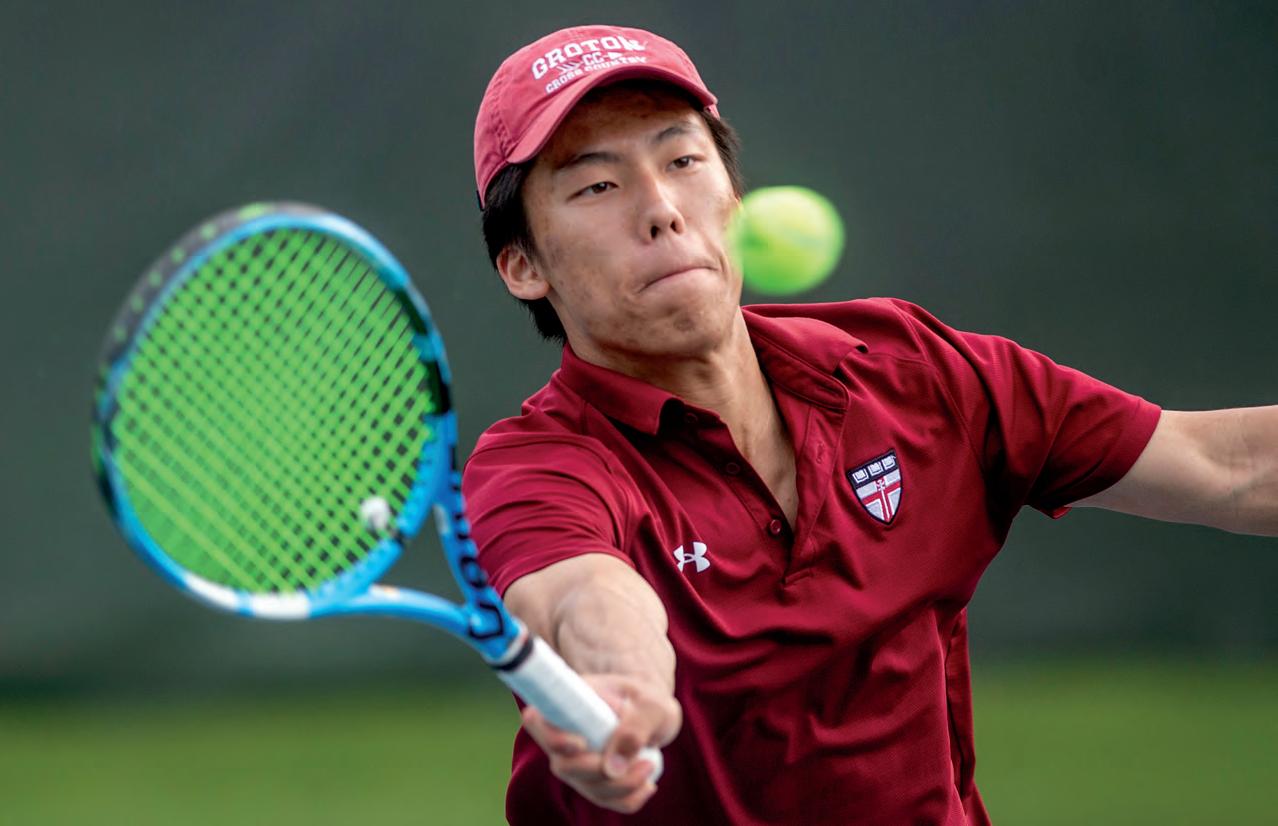
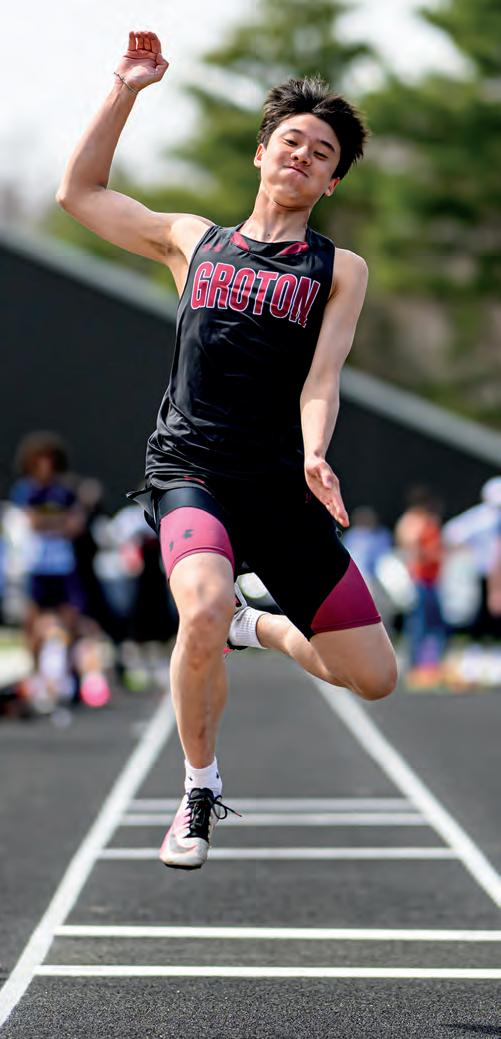
In just its first season with an on-campus facility, the boys track and field team won its first-ever New England Preparatory School Track Association (NEPSTA) title, with Salim Hill ’25 being named Most Outstanding Male Athlete.
Salim took home first-place finishes in the 100m and 200m, as well as finishing third in the long jump and contributing to Groton’s 4x100m relay team.
Groton’s girls team finished fifth in the NEPSTA. Colby Gund ’24 won the pole vault in her first season competing in the event.
Other top Groton finishers included Jenny Polynice ’25, who finished second in the shot put, Christopher Hovet ’25, who finished third in both the 1500m and 3000m,
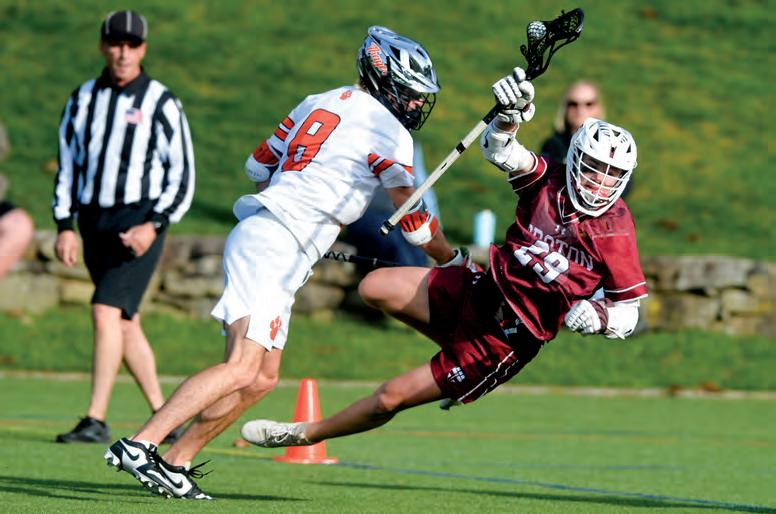
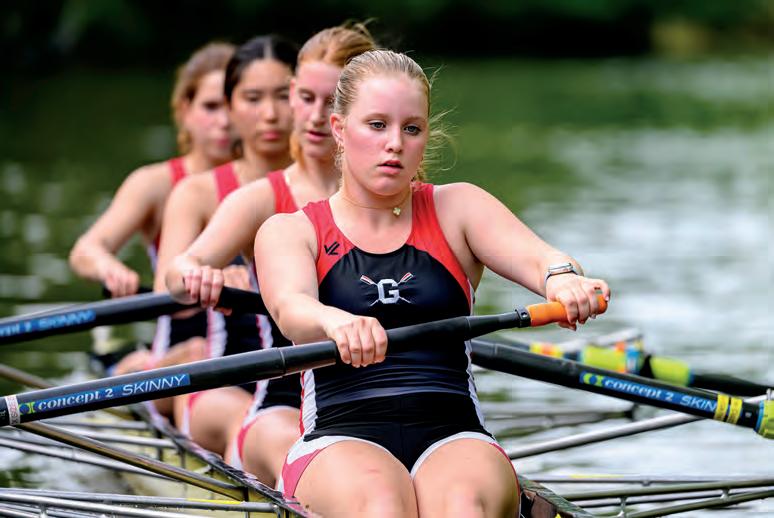
and Jeremy Gall ’24, who finished third in the 400m. Groton’s girls relay teams also finished second in both the 4x100m (Camille Kucera ‘26, Alicia Ye ’25, Tori Reece ’25, and Daisy Adinkrah ‘24) and 4x400m (Grace Best ’26, Inga Bartsch ’24, Lauren Jerrett ’24, and Tabitha Picucci ’27).
—Sean Kerrigan
What more can be said about a program that continues to exceed their lofty expectations each year? The girls went unbeaten in the regular season, a remarkable 16–0 against the toughest competition in New England. For the third consecutive year, the
ISL title has found a home at Groton School.
The season began with a win over Andover, punctuated by the deciding match being won by new Third Form star Olivia Herr. The girls did not stop there, as they rolled through top NEPSAC opponents in Deerfield, Nobles, Exeter, BB&N, and Milton. Caiyu Yang ’25, Ella Farahnakian ’25, and Lindy Zhang ’25 continued their dominant run over the region, winning nearly every match they played. The return of Alicia Guo ’24 was a welcomed addition; her energy and spirit helped lift the team. Clarke Trevino ’25, Leah Bay ’27, and Tina Scalese ’26 were all major contributors to the squad and showed how deep the team was.
Our captains, Amelia Bar num ’24 and April Li ’24, leave behind a tremendous
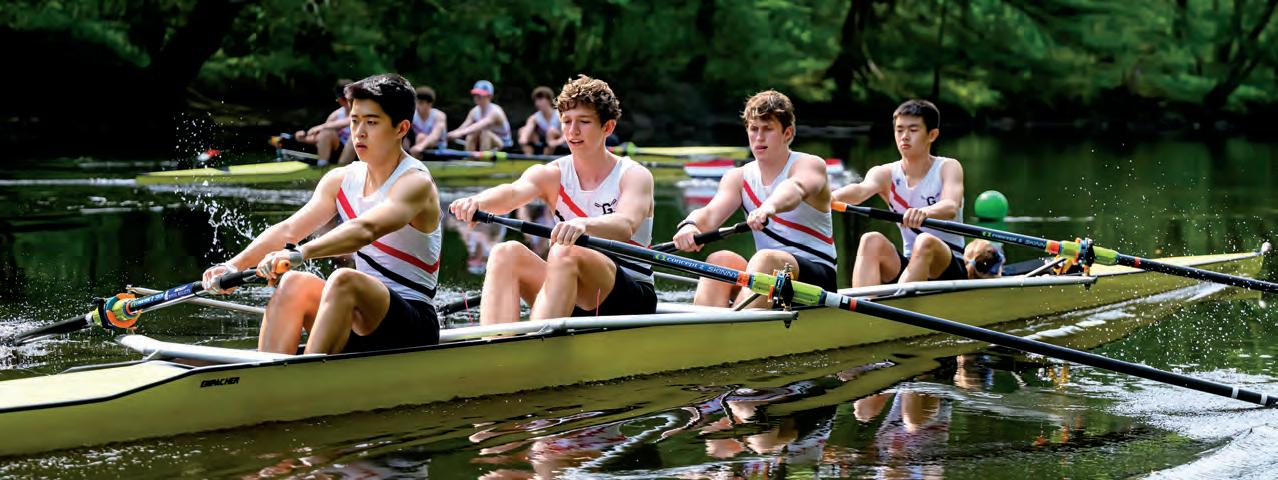
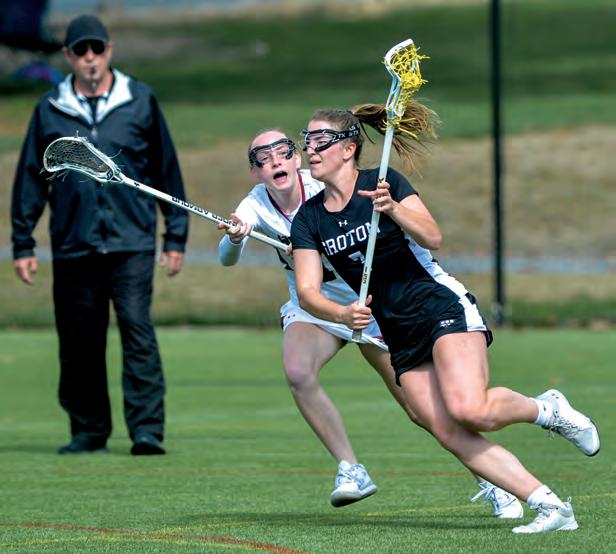
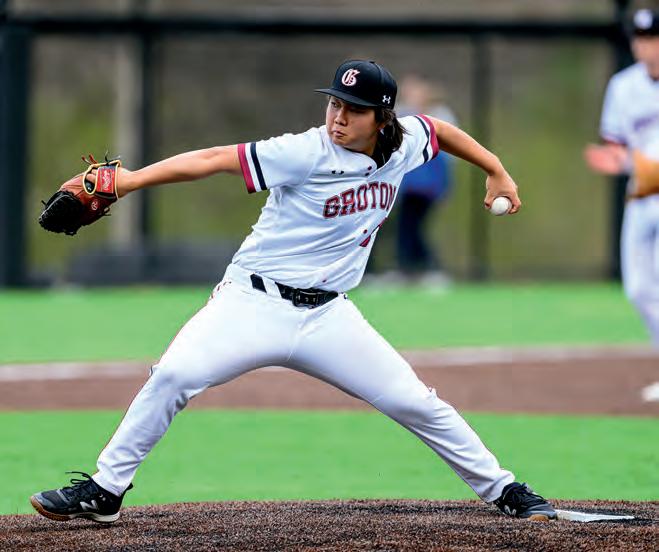
legacy. The team was an incredible 45 –3 in their time at Groton. These two players not only shined on the court but also brought so much passion and drive to the squad. They will never know the feeling of losing the ISL, and they have set the girls who follow them up for future success.
Coach R yan Holmes
The boys tennis team fought valiantly this spring, and finished with a dual match record of 13–5. A match in this sport can often be decided by a single point or two, and, unfortunately, a number of these matches ended that way.
W ith great leadership from our three captains (Griffin Gura ’24, Michael Lu ’24, and Trip Wight ’24), improvement from returning players (Husayn Ladha ’24, Miles Zhang ’24, and Charlie Stubbs ’26), plus the arrival of new players (Samuel Lu ’27 and Thaddaeus Flatz-Ehrfeld ’27), the squad worked well as a unit, bringing great spirit and joy each day to practice. The season began strongly with wins against Deerfield and Exeter and another championship at the Kingswood-Oxford tournament. At that event, Groton came out on top against such rivals as Hotchkiss, Lawrenceville, Choate, and Deerfield, among others.
The team lost a few very close matches in the ISL, yet ended up being the No. 3 seed in the New England A Division tournament.
In the quarterfinals, Groton took on Exeter again. The match was thrilling, and it all came down to a tiebreaker at the No. 1 singles position. Trip Wight was victorious, earning Groton a semi-final berth against the No. 1 seed, Andover, where the boys fought hard but did not prevail.
I loved working with this group, and I am particularly grateful for the spirit of these fine athletes. Griffin Gura ends what I call the “Gura Era” of Groton boys tennis, a period of nearly eight years in which Griffin and his older brother Jared ’22 combined to lead Groton to league championships, undefeated seasons, and incredible fun representing us around New England.
Coach John Conner
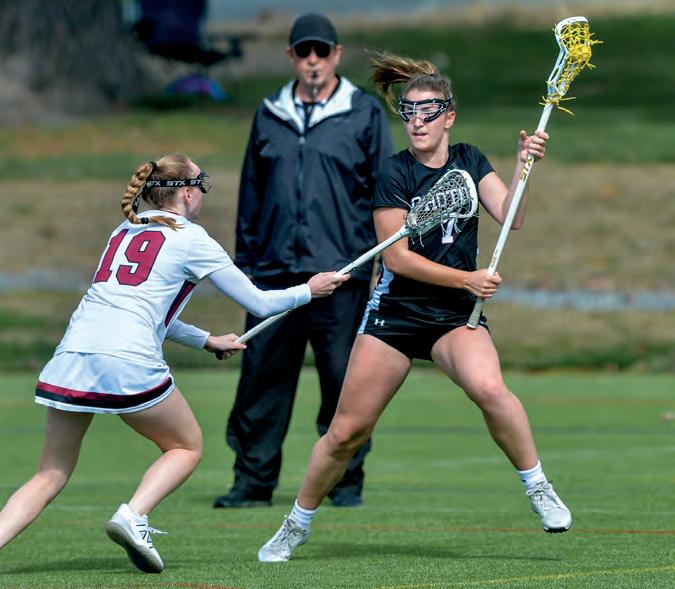
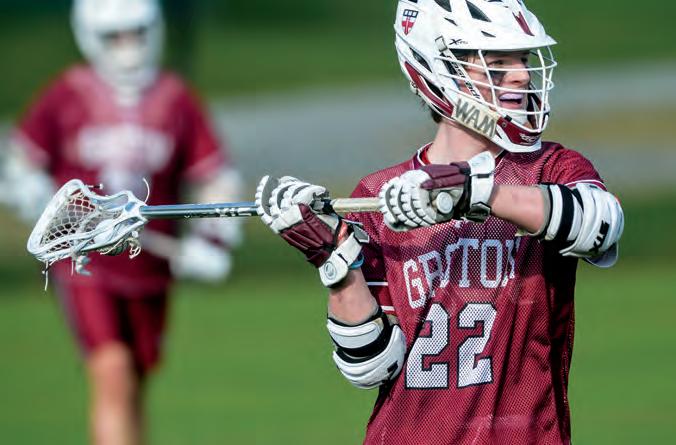
The girls lacrosse team had a successful season of growth and competition. Going 7 – 5 during the ISL regular season, the Zebras earned the No. 5 seed in the ISL tournament. Despite having five ISL regularseason losses, three of those came by one goal, and one game was lost by two. We felt that we were on the cusp of greatness for much of the season. During one of our two non-league games, we played a very talented St. Paul’s team, one with just as many committed players as we have players on our roster! We fought tooth and nail against St. Paul’s and eventually fell 5 – 4, but it was a great battle, and one that shows a lot of promise.
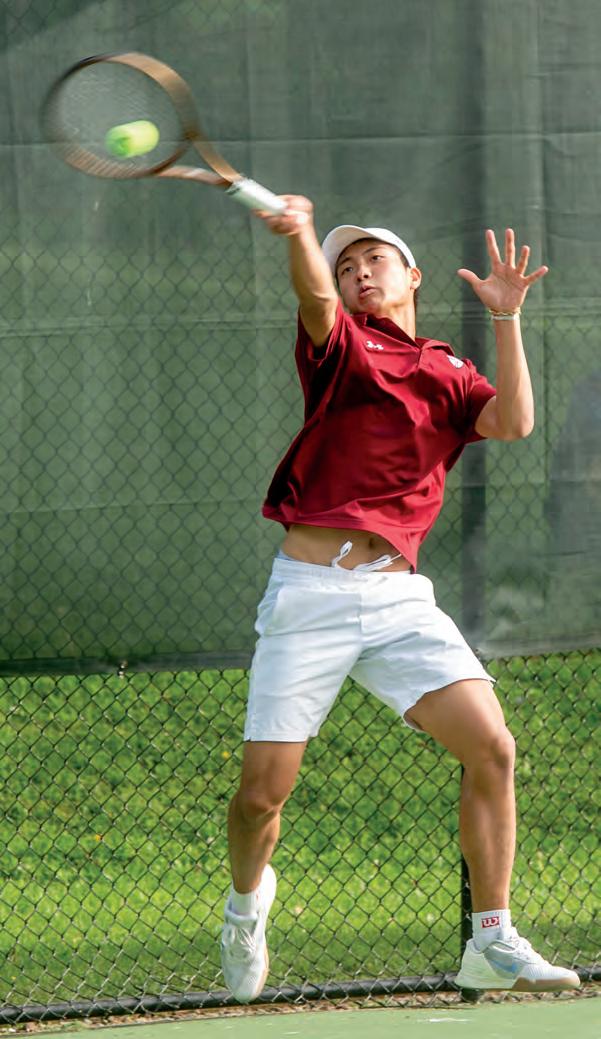
After the regular season finished, we were ready to avenge our first loss of the season, a 6 – 7 loss to the Rivers School. Rivers, the No. 4 seed, had home field advantage, but that was not going to scare us. In one of our best showings all year, we played a full 48 minutes and bested Rivers 9 – 6 in the only upset of the entire ISL tournament. Next, we were slated to play undefeated Nobles for a chance at the championship. On the Nobles home turf, they were Goliath and we were David. After a semi-slow start, going down 0 –3 in the first, we clawed our way back into it. At halftime it was 2– 4, the closest game Nobles has seen all year. We came out and scored the first of the third quarter. With six minutes to play in the third, the score was
3 – 4. You could feel the Nobles nerves, and the Groton energy. Nobles went on a run, and we ended up losing 4 –10, still Nobles’ closest, most competitive game, all year.
That game taught us that we can play with anyone, and we cannot wait to see the best of the best next season as we continue to build as a program.
Coach Julia Rowland
Our 2024 “Band of Brothers” embarked on their journey in a team huddle in the middle of an unforgiving sun-blazed Florida lacrosse field, when we listened to Kenneth Branagh’s delivery of Shakespeare’s inspiring

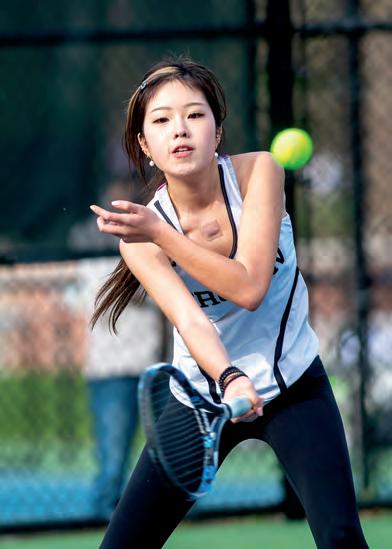

St. Crispin’s Day speech. The season culminated two months later with a resounding victory over rival St. Mark’s, followed by earning the Jeffrey Parker ISL Team Sportsmanship Award, unanimously voted by league coaches.
Captains Pat Keegan ’24, Amos Lawrence ’24, and Chris Munroe ’24 along with fellow Sixth Formers Devin Fitzgerald, Max Harrell, Will Koukopoulos, and Luke Scheible left a legacy of hard work, inclusion, spirit, sportsmanship, and good, old-fashioned Groton grit. These Zebras laid the groundwork at our annual spring training trip in Naples, Florida, where they authored our identity through training sessions under the hot sun.
Playing Hotchkiss, Canterbury, and
Greenwich CDS immediately taught us about ourselves, and throughout the spring we marched through our competitive ISL schedule and battled through injuries all the way up to our St. Mark’s game. Strong efforts against St. Paul’s, Thayer, Governor’s, and St. Mark’s were highlights.
W ith our returning Sixth Formers and underformers, along with junior varsity athletes and some promising young newcomers, this “happy few, this band of brothers” looks forward to 2025 with excitement and anticipation. Many thanks to Coaches Greg Hefler, Mark Bolduc, Jamie Funnell, and Peter Fry, as well as to our parents, alumni, and supporters. We were fortunate to have you on our sidelines throughout our journey. Thank you to
team manager Ethan Ramonetti ’24 and gameday helpers Sean Greene ’24 and Allen Fang ’24.
Coach Bob Low
As we look back on the 2024 baseball season, it’s clear that one word captures the essence of this team: family. From the beginning, their close bond was evident during the Spring Trip to Vero Beach, FL, where they demonstrated their ability to work together, stay positive, and prioritize team needs over their own.
Despite facing hurdles, the team’s perseverance and strong work ethic earned
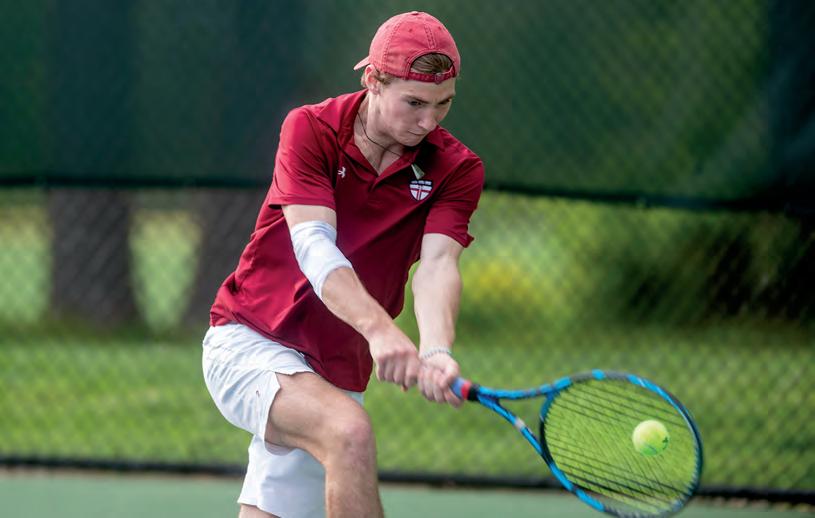
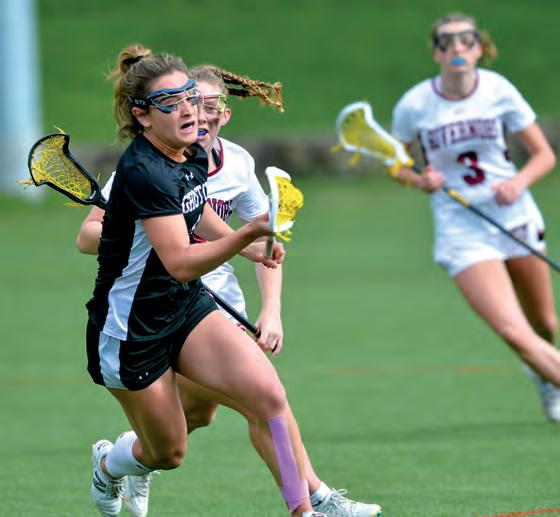
them some incredible victories, including wins against Belmont Hill, Milton, and Governors Academy. They played in nine one-run ballgames and put up a strong fight, earning the No. 3 seed and a home game for the playoffs. Their spirit and commitment to one another remained strong throughout the season, making them a joy to be around every day. The season ended with a narrow loss in the semi-finals, but their teamwork, resilience, and selflessness has helped lay the foundation for future baseball teams to build off of!
Coach Kevin Barnaby
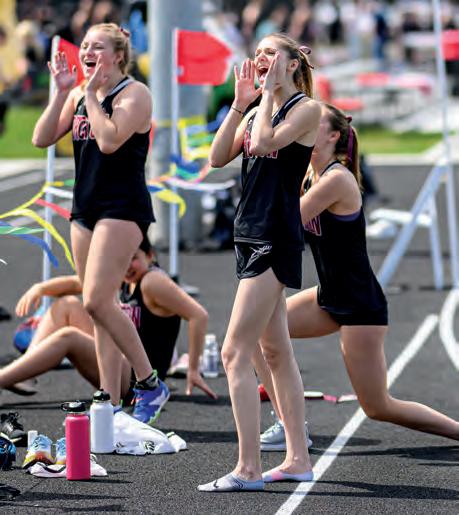

The season started out like all of them do, with a group of excited boys striving to make boats go fast. A good number of them were quite physically fit, as measured by our Festival of Fitness.
Our scrimmages with Exeter and St. Paul’s in 8s showed promise. That promise was fulfilled in our first race with BBN and Nobles. For the first time in a number of years, our first boat beat Nobles, one of New England’s strongest programs. It was a joyous moment. All four Groton boats had at least one highlight, whether it was the second boat’s powering through Brooks on choppy Lake Cochichewick, the third boat’s medal at the NEIRA, or the fourth
boat making the final at NEIRA after a tough season and also winning a medal. Despite finishing fourth as a team in Worcester, our final results were disappointing after such high hopes at the beginning of the year, but this was one of the most enjoyable and fun teams that I have ever worked with. Even after a loss, the team worked hard and had great spirit. I would like to acknowledge graduating co-captains CJ Armaly ’24 and Ryder Cavanaugh ’24 for bringing new oarsmen into the fold and for making sure that the boathouse felt welcoming to everyone, boys and girls. Next year we return many varsity oarsmen who look forward to making boats go fast.
Coach Andy Anderson
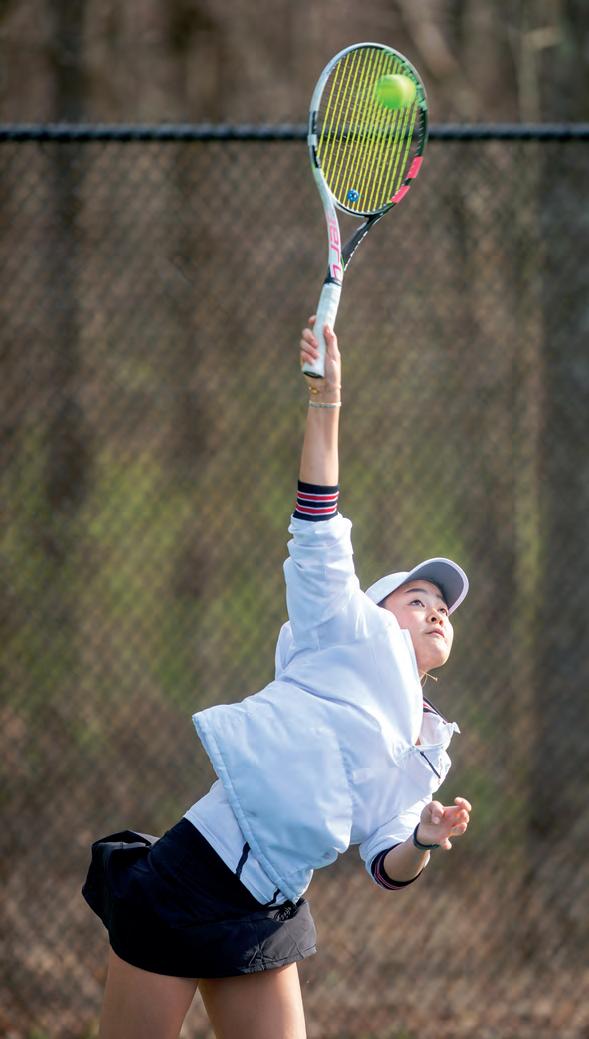
First, I would like to thank everyone for a great season, including the people behind the scenes like Buildings and Grounds, who fill our gas cans and fix our engines.
Wow, what is about spring that preseason seems like both yesterday and a thousand years ago? They say if March comes in like lamb, it goes out like a lion. This year it was more like a polar bear. Has there ever been worse weather for pre-season? In nine practices only four were on the river. The first week of school, it began to feel like we were doomed to forever be rowing on our indoor river—the ergs in the gym lobby.
But fear not, spring will always come around, and on our first day rowing in 4s we
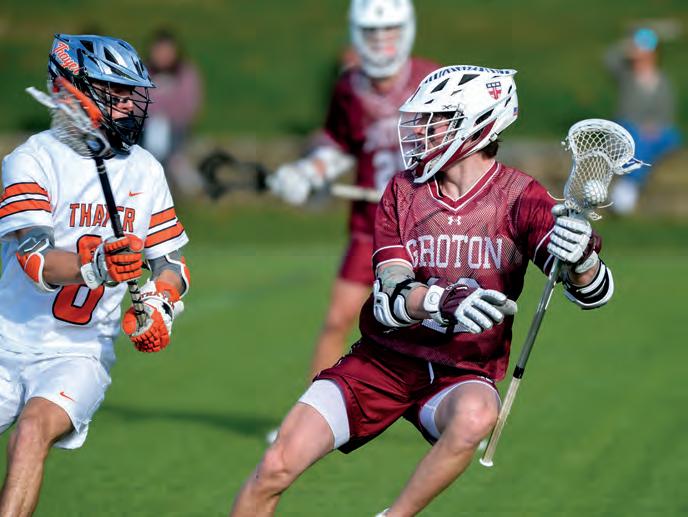
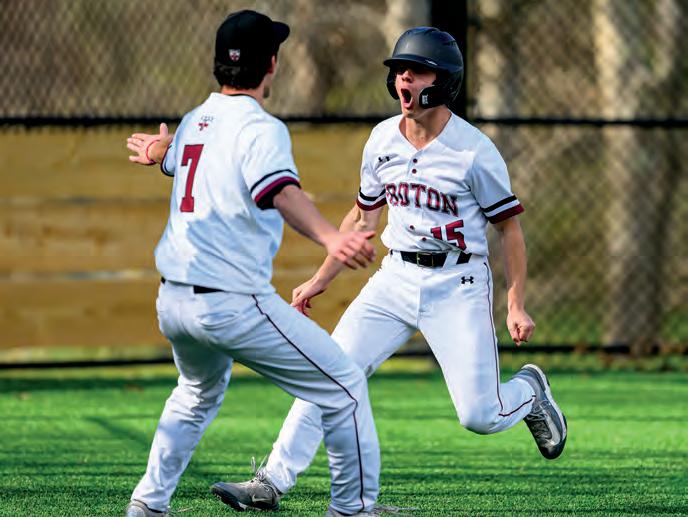
saw a beaver family and the return of “our” great blue heron. Good omens both.
We scrimmaged in 8s, got back into 4s, worked on our catches (always), learned the start, and got into the rhythm of our racing season. Gluckers on Monday! Tetis on Tuesday! Three parts of the race on Friday! De-rig and load up the trucks! Unload and rig! Race! Win! And more de-rigging and loading and unloading and rigging before we start all over with Gluckers again on Monday.
At the end of April, we raced Pomfret and Taft on Lake Quassett in Pomfret. The conditions were windy and choppy but that didn’t stop the Mighty Zebras from besting Pomfret and Taft in all eight boats, girls and boys, in a sweep that earned us a shout out
as a Mega Team of the Week.
The following week we had a rare home race, this time against Cambridge Rindge and Latin School. CRLS said we row on the most beautiful place in the league, and I agree. We beat them 7–1 with lots of great racing.
This year it rained again as we contested the Cooke Cup against our arch nemesis, St. Mark’s. It was great to have so many alums, parents, and friends at the river cheering us on, as we easily won the Cooke Cup 7–1. We like to beat St. Mark’s a week early so, while the rest of the school played St. Mark’s, we were at our big championship regatta at Lake Quinsigamond. What a day it was! Girls second boat won gold, coming in first in a field of eighteen boats. The
BASEBALL
Coaches’ Award
Nate Johnson ’24
MVP Forrest Nelson ’24
CY Young Award
Ben Milner ’24
Zack Webber ’24
ISL Gold Glove
Cam Cirone ’25
All-ISL
Zack Webber ’24
ISL Honorable Mention
Ben Milner ’24
Forrest Nelson ’24
John “Jack” Etter
Sportsmanship Award
Groton Baseball
Thomas John Flaherty
Plaque (Sportsmanship)
Groton Baseball Coaching Staff
All-NEPSAC Honorable Mention
Zack Webber ’24
ISL Underclass All-Star
Game
Cam Cirone ’25
Jake Murray ’25
Kiran Sen ’25
Captains-Elect
Cam Cirone ’25
Kiran Sen ’25
BOYS CREW
Captains-Elect
James Ebert ’25
Asante Kiio ’25
Harry Spence ’25
Lucas Wu ’25
GIRLS CREW
Winners of the Robert Parker Trophy for New England Champions 2nd Boat
Captains-Elect
Caroline Creasy ’25
Lauren Dubois ’25
Eliza Kingsland ’25
Naia Kolodziej ’25
BOYS LACROSSE
Fred Beams Coaches’ Award
Patrick Keegan ’24
Amos Lawrence ’24
Chris Munroe ’24
MVP
Matt Scheible ’25
Most Improved Daivyon Williams ’25
All-ISL
JP Charpentier ’25
Angus Miller ’25
Matt Scheible ’25
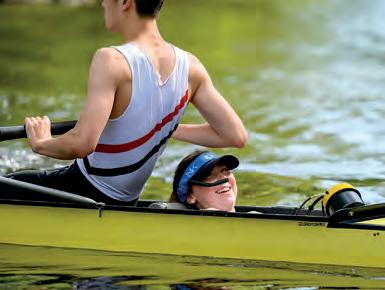
ISL Honorable Mention
Angus Frew ’25
Patrick Keegan ’24
Chris Munroe ’24
All-NEPSAC
Chris Munroe ’24
All-NEPSAC Honorable
Mention
Patrick Keegan ’24
Jeffrey Parker Team
Sportsmanship Award
Groton Boys’ Lacrosse
Captains-Elect
JP Charpentier ’25
Angus Frew ’25
Angus Miller ’25
Matt Scheible ’25
GIRLS LACROSSE
Coaches’ Award
Ellie Smith ’24
MVPs
Giulia Colarusso ’24
Maddie Cronan ’25
Unsung Hero Award
Genevieve Nelson ’25
All-ISL
Giulia Colarusso ’24
Maddie Cronan ’25
ISL Honorable Mention
Genevieve Nelson ’25
Ellie Smith ’24
All-NEPSAC
Giulia Colarusso ’24
All-NEPSAC Honorable Mention
Maddie Cronan ’25
Genevieve Nelson ’25
Captains-Elect
TBD
All-ISL
Griffin Gura ’24
Michael Lu ’24
Trip Wight ’25
Captain-Elect
Trip Wight ’25
All-ISL
Ella Farahnakian ’25
Alicia Guo ’24
Olivia Herr ’27
Caiyu Yang ’25
Lindy Zhang ’25
All-NEPSAC
Caiyu Yang ’25
All-NEPSAC Honorable Mention
Lindy Zhang ’25
Captains-Elect
Ella Farahnakian ’25
Caiyu Yang ’25
Lindy Zhang ’25
Boys’ Awards Coaches’ Award
Jeremy Gall ’24
Andres Palacios ’24
MVP Salim Hill ’25
Most Improved Award
Kogouniwa Bennsion ’24
ISL Honorable Mention
Chris Hovet ’25
Fung Lam ’24
All NEPSAC
Kogouniwa Bennsion ’24
Jeremy Gall ’24
Salim Hill ’25
Chris Hovet ’25
Liam Warren ’25
All-NEPSAC Honorable Mention
Liam Warren ’25
Girls’ Awards
Coaches’ Award
Daisy Adinkrah ’24
Inga Bartsch ’24
MVP Alicia Ye ’25
Most Improved Grace Best ’26
All-ISL
Kristen Billings ’25
Alicia Ye ’25
conditions at Lake Quinsigamond were almost perfect, and Groton led the race from start to finish, beating archrival Nobles by four seconds. It has been nine long years since a Groton crew placed first at NEIRAs. First boat came in second, but it was Nobles in third, who we were happy to beat! Fourth boat, with three novices, made the finals and third boat narrowly missed the finals, nipped by Choate by .15 seconds. In the team trophy we came in third out of eighteen.
We had great results for sure, and while the hardware is awesome, it isn’t everything.
A few years ago, I overheard a Sixth Former talking to her mom after what I had thought had been a disappointing race. She said, “We raced hard, and it was just the best day
ISL Honorable Mention
Daisy Adinkrah ’24
Camryn Dunn ’26
Colby Gund ’24
Camile Kucera ’26
Male Montero ’25
Tabitha Picucci ’27
Jenny Polynice ’25
Tori Reece ’25
Alicia Ye ’25
All-NEPSAC
Daisy Adinkrah ’24
Inga Bartsch ’24
Kristen Billings ’25
Colby Gund ’24
Lauren Jerrett ’24
Camile Kucera ’26
Tabitha Picucci ’27
Jenny Polynice ’25
Alicia Ye ’25
All-NEPSAC Honorable Mention
Isabelle Hall ’28
Tabitha Picucci ’27
Captains-Elect
Salim Hill ’25
Chris Hovet ’25
Jenny Polynice
Alicia Ye ’25
ever.” I think, as coaches, that’s what we hope for most, that you race hard and that you have the best day ever.
We will miss our Sixth Formers Agathe, Kit, Isabella, Marlene, and Sydney S.— and we wish you all the best in college and beyond. And at the same time, we look forward to more fast boats next year on the Mighty Nashua. Be there, Aloha.
Coach Cola Parker
Wrapping up the year in both visual and performing arts, students in the visual arts and theater classes got to present their final works on May 25. The evening began with an exhibit of visual arts and continued with the Short Works Festival, where student writers and directors got to showcase eight one-act plays. In addition, throughout the evening, several dance sequences were choreographed and performed by students.
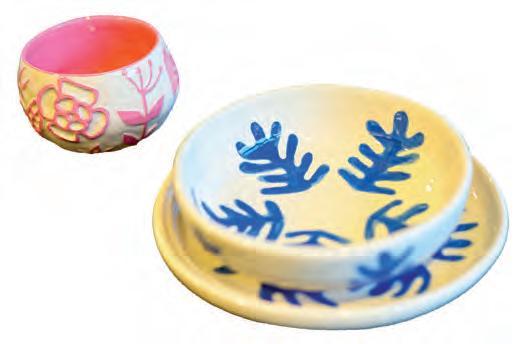
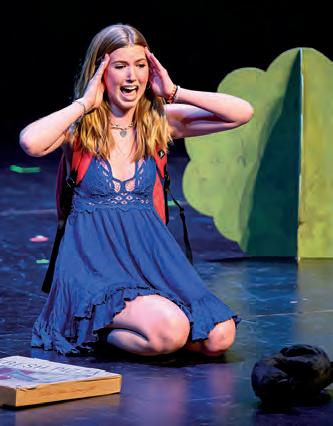
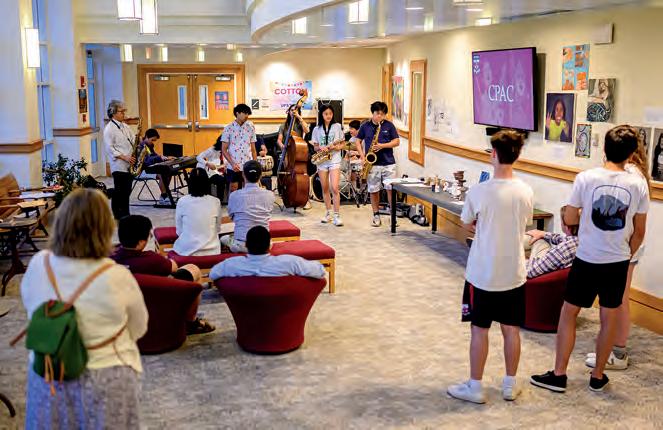
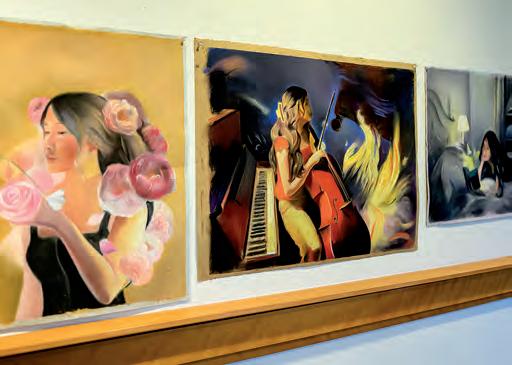
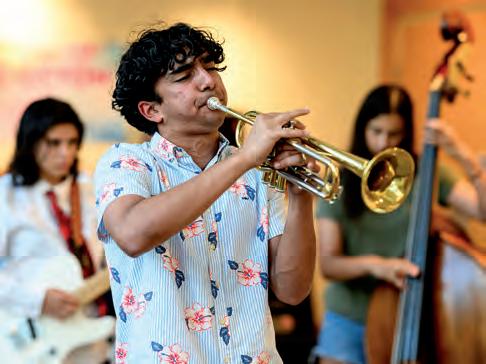
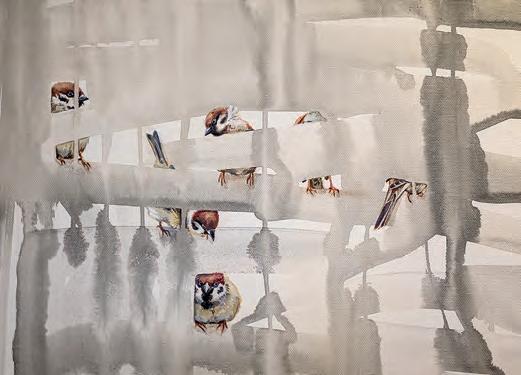

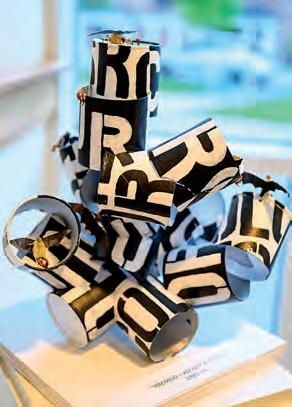
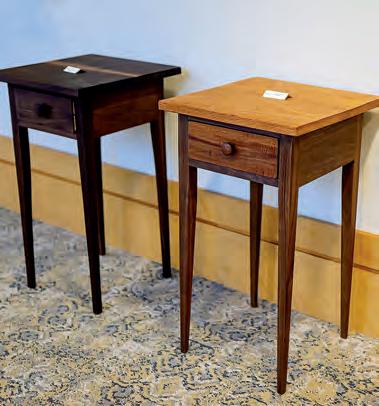
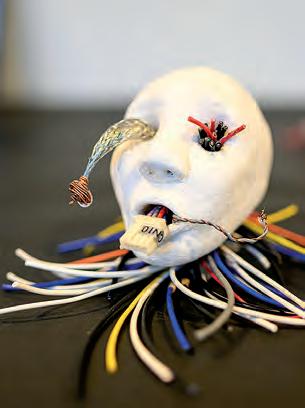
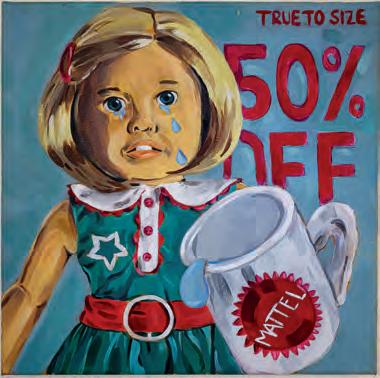
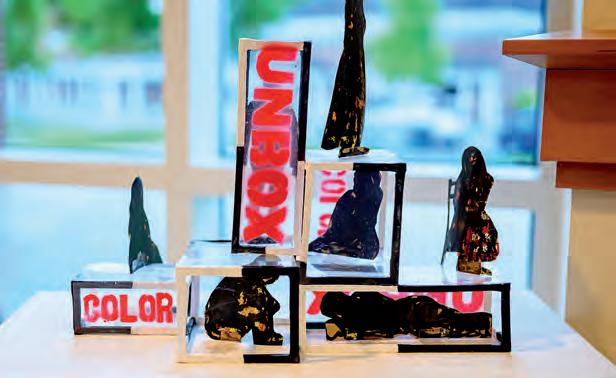
Wen-Hao Tien
April 6 – May 17, 2024
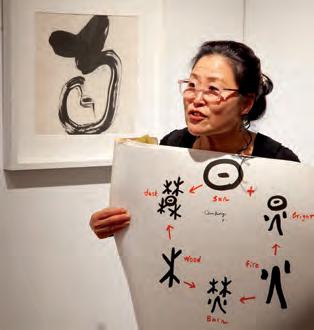
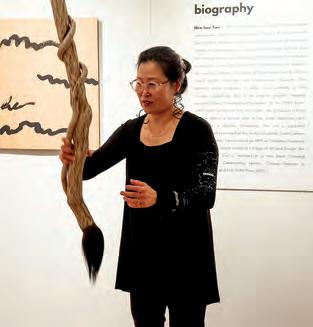
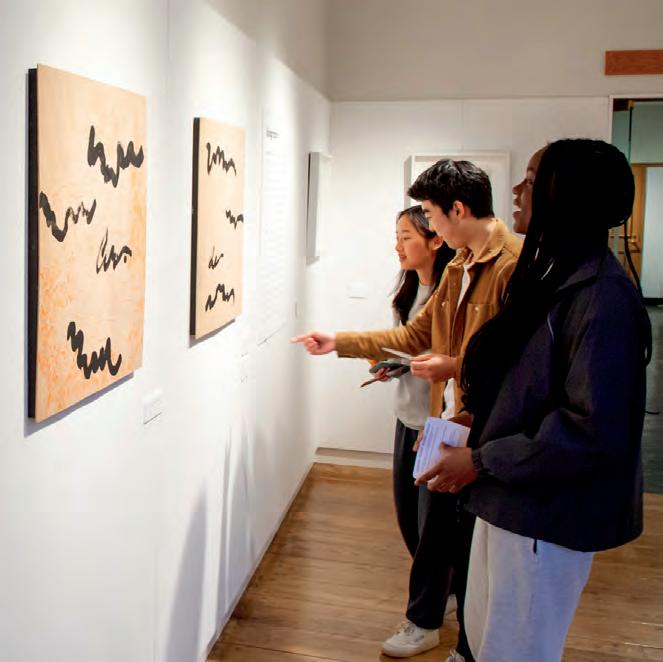
Artist, teacher, and curator Wen-hao Tien was the final Brodigan Gallery visiting artist of the 2023–24 school year. At a reception in the gallery, she explained to students, faculty, and staff how her exhibition, “Pure Language,” came to be.
The final Brodigan Gallery visiting artist of the 2024–25 school year was Wen-hao Tien, an artist, teacher, and curator who bridges communities across divergent fields. Along with being one of the founding members of the exhibition program at Harvard’s Center for Government and International Studies in 2006, she has curated shows and organized interdisciplinary symposiums in universities and unconventional contemporary art spaces. She teaches Chinese calligraphy and conceptual art at the University of Massachusetts at Lowell, Boston University, and Northeastern University. Additionally, as an East Cambridge, MA, resident, she lobbied for the establishment of the Foundry in Cambridge, and is an active member there, contributing to its workshops and creative network.
The Christopher Brodigan Gallery, on the ground floor of the Groton School Dining Hall, features contemporary artists who often conduct master classes and workshops while their exhibits are on display. It is open Monday to Friday, 9:00 a.m. to 3:00 p.m.; Saturday from 10:00 a.m. to 8:00 p.m.; and Sunday from 10:00 a.m. to 3:00 p.m. Parking is available at the Dining Hall. The gallery is free and open to the public.
John Huet
April 24 – June 28, 2024
Photographer John Huet has shot award-winning campaigns for Nike and Coke, covered the Olympics, and been featured on the cover of magazines like Time, Newsweek, and National Geographic But a recent trip to Antarctica might lead to his most ambitious project yet: saving the planet.
Mr. Huet’s journey south navigated through the Drake Passage and along the Antarctic Peninsula with the ambitious goal of crossing the Antarctic Circle. He ultimately reached the coordinates of 66°33’S, an uninhabited region untouched by human presence, where wildlife remains undisturbed amidst icebergs and glaciers that redefine architectural wonder.
The resulting photography is sampled in “Crossing the Circle,” the de Menil Gallery’s late spring exhibit. At an artist’s reception on May 3, Mr. Huet spoke about his trip and the impact he hopes it has, before taking questions and then chatting informally with a gaggle of students.
“It’s important for [the students] to see as broad a planet as they can, because it’s going to be theirs,” he said afterward. “It’s a cliche, but if anyone is going to do anything, it’s going to be them.”
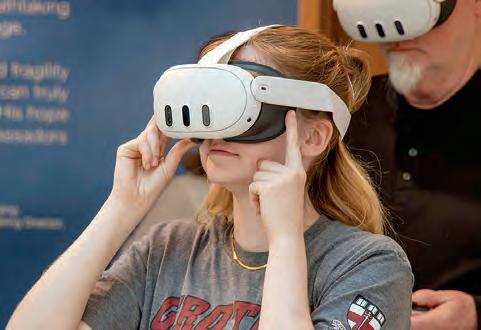
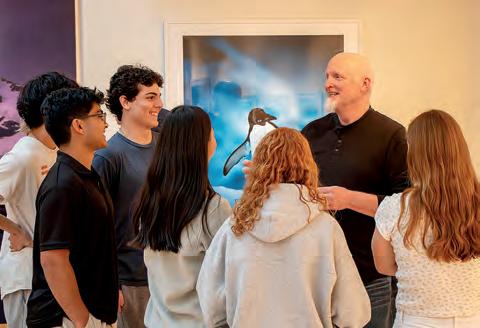
The de Menil Gallery, in the Dillon Art Center at Groton School, is open 9:00 a.m. to 3:00 p.m. on weekdays (except Wednesdays) and 11:00 a.m. to 4:00 p.m. on weekends (except school holidays). The gallery is free and open to the public.
Photographer John Huet told the story behind his recent trip to Antarctica, and the work that came out of it, at a reception for his de Menil Gallery exhibition, “Crossing the Circle.”
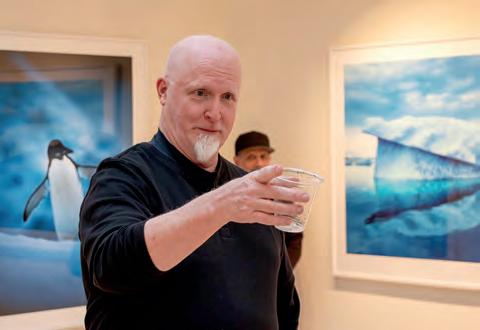
ftr ’89–’03
January 7, 1939–January 7, 2024
PLAYING ALONGSIDE Sam in the middle of our ’56 and ’57 Groton football team’s defensive line, Sam was always a bit prickly and irascible—a quality that made him very effective at stopping the other teams’ attempts through the middle.
After our graduation, I had a wonderful adventure by car with Sam and Wilford Welch, driving across the country and back. (See photo.)
I overlapped with Sam on the Groton Board of Trustees for a time. He was on the board from 1989 until 2003 and was a major fundraiser for the school’s very successful capital campaign.
An inveterate fly fisherman for salmon, Sam and I spent many happy days together fishing on the Grand Cascapedia in Canada.
During my years of service in the Navy, I never heard anyone better than Sam in his command of all forms of the English language.
A very special lifelong friend, Sam leaves behind an extraordinary family and legacy
— Gordon Gund
’57
drove around the U.S. Another summer, Sam and I drove around Europe. In between, I joined him on a number of occasions at their summer home, “Shelburne Farms,” on the old Vanderbilt estate in Shelburne, Vermont, alongside Lake Champlain. It was magical as well as historical.
At Groton, Sam played football with great ferocity and helped us have an undefeated season and another near undefeated season, losing only one game. Those who took him as a push over because of his relatively small size made a mistake they would soon regret.
Sam was also the manager of our hockey team that was undefeated our senior year. Not surprising we were undefeated, given that classmate Ken McLean ’57, our captain, went on to be the captain of the Yale hockey team, while Stewart Forbes ’57 became captain of the Harvard hockey team, and classmate Hugh Scott ’57 played first string on the Princeton hockey team.
Sam was one of my roommates all four years at Yale, where he had a knack of knowing all the varsity football players. He was again the manager of the ice hockey team.
LIKE ALL of us, Sam had many unique attributes: devoted to friends, family and Groton; committed to improving health care in the United States; short tempered, and great fun to be around.
I knew Sam particularly well during our years at Groton and Yale. He arrived at Groton at the beginning of Second Form year, an upper crust “New Yorker” who was far more sophisticated than the rest of us.
Over the next four years we spent a great deal of time together. One summer, Sam, Gordon Gund, and I
After our graduation from Yale, Sam earned a master’s in Public Health from Yale Medical School, and then, after earning his PhD, he became a tenured professor at the university and director of the Yale Program in Hospital Management. Pretty impressive, Dr. Webb.
— Wilford Welch ’57
FOR THOSE of you who have not seen Sam since his Groton graduation, it may surprise you that his memorial service is in the school’s chapel. At his graduation in 1957 he made unmistakably clear that he hated Groton and
would never step foot on the campus again. He stated so with his colorful use of the English language!
At Gordon Gund’s urging, Sam returned to the campus for his 25th reunion, and a dramatic change took place. He became an active alumnus, a hard-working, respected trustee, and a supportive parent. He requested that his memorial service be held in the Groton chapel.
A memorable Webb event took place in the chapel during Sam’s student days here. In the middle of Mr. Crocker’s Easter sermon we heard a loud “OEE” echoing throughout the building. This was not the utterance of a conversion experience; it was Sam waking up from a sermon nap! No one remembers the sermon but few have forgotten Sam’s Easter awakening.
Many people shy away from making significant changes in their lives. Not Sam. Changing his attitude toward Groton was minor compared to others he made.
Sam fought his demons and persevered. He gave up alcohol and cigarettes as well as childhood prejudices.
And he went on to a wonderful chapter of his life with Marshall, Samantha, Will, Edward, and the blessing of Watson’s return to the family, as well as grandchildren and a great grandchild.
Loyalty to friends was a hallmark of Sam’s life. Many of us received regular check-in calls from him, and we always looked forward to his emphatic opinions so vividly expressed.
We salute you, Sam, a loyal friend to the end.
— Bill Polk ’58 Headmaster, 1978–2003
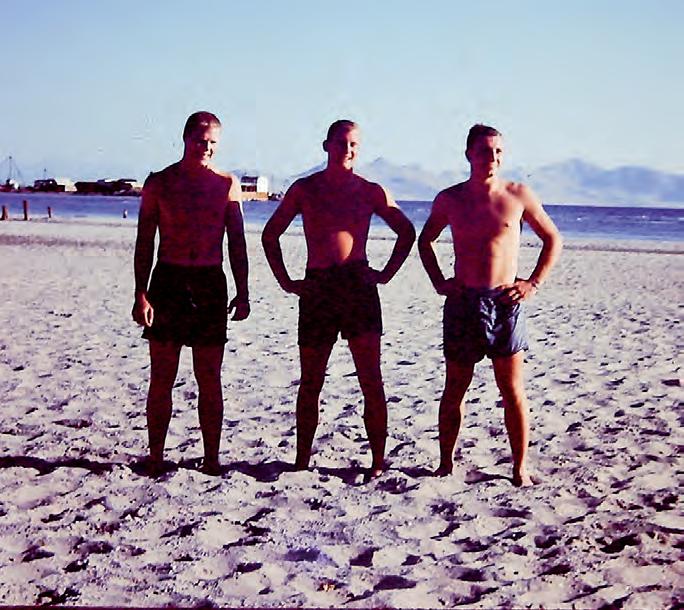
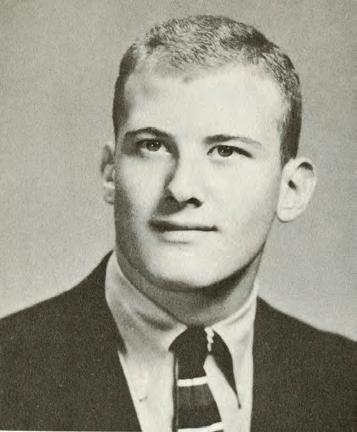
January 31, 1953–September 26, 2023
by Malcolm Edgerton ’71
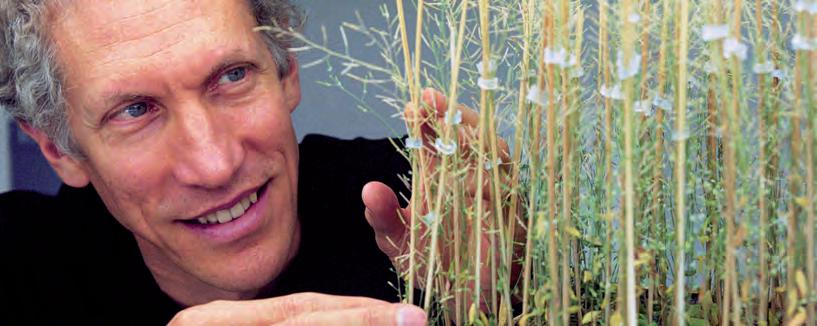
Philip Benfey led a uniquely productive and interesting life.
He came to Groton as a Third Former, studious and quiet; a tall, solid Quaker from Indiana, the son of a college chemistry professor and a teacher. Happy to leave farm country behind, he quickly revealed his abilities, and eventually everyone knew of his clear, thoughtful intelligence and mental adventurousness.
At Groton, while Philip and I talked and argued about all sorts of things, wondering how to lead lives that were consistent with our beliefs, he soon started acting on what we discussed with clarity and a sense of purpose: joining the debate team, becoming an editor of the nascent Circle Voice and writing vibrant if youthful political commentary (return to a society of hunter/gatherers!). He helped organize the school’s Moratorium to End the War in Vietnam in the fall of 1969, and the school’s first Earth Day the next spring.
Inspired by Ken Kesey’s stories of the wild life in Oregon, after a year at Hampshire College he headed
west. He said he’d return to college as soon as he could find a subject worth studying, but he wanted to write the great American novel and first, he needed to gain experience. He started woodcutting in Oregon and driving a snow-cat in Utah, then hitched rides on sailboats across the Pacific to work in American Samoa (mechanic), Australia (bricklaying, mining, railroad maintenance), the Philippines (movies), and Japan (building gardens). Moving west again, he rode the Trans-Siberian rail to Paris (carpentry, rebuilding a barge on the Seine). All the while he was writing me entertaining letters about his adventures and promising to send his stories. He didn’t intend to spend six years at it but he did.
While a starving artist in Paris, at a party he met, and in a coup de foudre, fell in love with his future wife, Elisabeth. She was in law school. “I thought it was a pretty good arrangement,” Philip said. “She would be a wealthy lawyer who could support me as a struggling writer—until she made clear that her goal was to be an
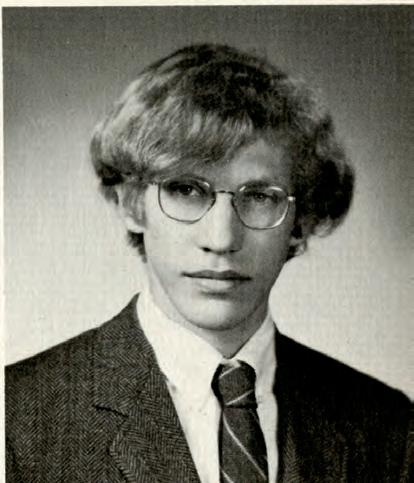
actress. At some point she said, ‘Not that I don’t have entire faith in your writing ability, but maybe a day job would be a good idea?’ To which I replied, ‘But what would I do?’ And she suggested biology.” It was a subject new to him, although in Japan he’d been to a conference on the origins of life that had piqued his interest. He would later say that he was “an accidental scientist.”
After graduating from the University of Paris he went on to Harvard for graduate school and Rockefeller University for his post-doc, becoming a full professor at NYU in 1991, and then in 2002 he moved to Duke to be the chair of the biology department.
Philip’s life work revolved around examining how single cells differentiate to become the multicellular entities that we are. He and his lab did this through the study of Arabidopsis thaliana, a small flowering plant with a translucent root that could be studied in plan and section to reveal the activities of its stem cells. Eventually, this led to cloning and sequencing genes to do a variety of things, like developing crops that can deal with the stresses of climate change. For a much better description of his contributions, see a precis of his work by two of his long-time colleagues and friends in the journal Science, available at www.science.org/doi/10.1126/science.adl4710
The list of Philip’s awards and accolades seems endless: he was a member of the National Academy of Sciences, a fellow of the American Association for the Advancement of Science, and an Investigator for
the Howard Hughes Medical Institute. With over 200 published research articles to his name, he was consistently ranked in the top one percent of cited researchers in the field of genomics. He also founded three biotech companies: Grassroots Biotechnology, Hi Fidelity Genetics, and Raleigh Biosciences, and he was a core instigator of the Chapel Hill/Raleigh/Durham “biotech valley.”
Elisabeth says that Philip always felt that his most important legacy was his students. He loved being a mentor and was exceptionally good at it. At the 2024 NYU annual genomics conference dedicated to his memory, his colleagues documented 33 labs that directly descended from his labs, and 61 additional labs that descended from those. I love one story of a morning meeting with a post-doc, discussing the possibility of a new business: by that afternoon Philip’s lawyers had sent her initial incorporation documents to help get the venture started.
In January 2023 Philip broke his arm: tests revealed a form of lung cancer that non-smokers can get, which had metastasized. He continued to work up until the end, speaking publicly as late as June and joining conference calls until his last week. His death led to an outpouring of tributes from students and colleagues worldwide, hailing his pioneering work, inspiring leadership, technological virtuosity, entrepreneurial drive, thoughtful mentorship, and endless optimism.
He has left behind his wonderfully dynamic and accomplished wife Elisabeth and their two sons Sam and Julian, and many colleagues and associates. He was always fun to talk with, he enjoyed life, he appreciated the world and he loved his family. We should all be so fortunate as to create a legacy like his.
Form Notes are password-protected. Members of the Groton community may read them online by signing into GrotonConnect at www.grotonalumni.network.
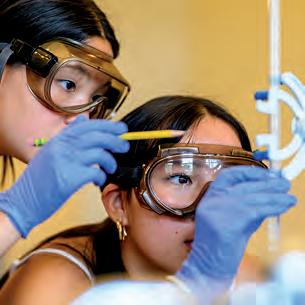
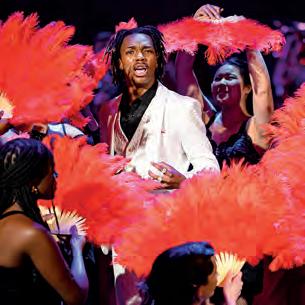
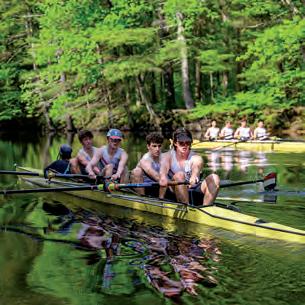
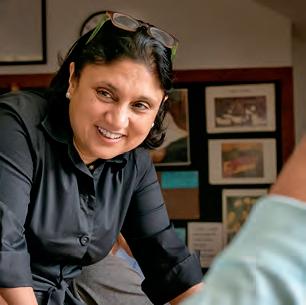
The Groton Fund provides important annual resources for the school. It touches every aspect of life on the Circle, supporting our talented students and dedicated teachers and staff.
Faculty enrichment opportunities, safety goggles in chemistry labs, costumes for theatrical performances, and cookies at parlor are just a few of the things the Groton Fund covers.
Please make your tax-deductible gift today.
Most of our donors allow the school flexibility to use these dollars where needed most, though others designate specific priorities, including academics, athletics, the arts, diversity and inclusion, faculty, financial aid, student life, and well-being.
G roton participation ranks among the highest of our peer schools, with 50 percent of alumni and more than 90 percent of parents donating to the fund.
▶ Online (includes Venmo and Apple Pay, as well as a recurring gift option): Groton.org/giving
▶ Donor-advised fund
▶ Stocks and wire transfers (contact: grotdev@groton.org for instructions)
▶ Check by mail: Groton School Development Office, 282 Farmers Row, Groton, MA 01450
On behalf of all our students, THANK YOU for your support!
282 Farmers Row
Groton, Massachusetts 01450-0991
Change Service Requested
GROTON HAS two harpsichords with interesting backstories. The older one is tucked in the back of the Memorial Room. Built by prominent London harpsichord makers Burkat Shudi and Johannes Broadwood in 1789, this instrument belonged to a wealthy planter and signer of the Declaration of Independence, Charles Carroll of Carrollton, Maryland. It sat in a warehouse in Annapolis for many years, before being restored by Chickering and Sons in Boston around 1900. The harpsichord was eventually bought by Fanny Reed Hammond as a gift in honor of Endicott Peabody in 1939 ahead of Rev. Peabody’s retirement in 1940. It sat around in a state of relative disuse until Mary Crocker moved it to Hundred House, and was restored again in 1975.
The second harpsichord is located in the Edward B. Gammons Recital Hall, where it’s used much more frequently. It was made by the late Eric Herz, who escaped the Nazi Holocaust and became a leader of the Boston school of harpsichord makers. Herz built nearly 500 harpsichords, prized as much for their beauty as their sound. A flutist as well as an instrument maker, he was the former president of the Boston Early Music Festival, a biennial showcase of classical music performed on period instruments. This harpsichord was donated by Dan Oliver, father of Andrew Oliver II ’88, and features Groton’s motto, cui servire est regnare, above the keyboard.
